THIS PAGE FIRST POSTED 1 SEPTEMBER 2016
LAST MODIFIED Tuesday 2 September 2025 8:43
The Sydney Amateur Concerts of 1826-27
Dr GRAEME SKINNER (University of Sydney)
THIS PAGE IS ALWAYS UNDER CONSTRUCTION
To cite this page:
Graeme Skinner (University of Sydney),
"The Sydney Amateur Concerts of 1826-27",
Australharmony (an online resource toward the early history of music in colonial Australia):
https://sydney.edu.au/paradisec/australharmony/sydney-amateur-concerts-1826-27.php; accessed 28 February 2026
Introductory note:
The texts given in gold aim for the most part to be diplomatic transcriptions, wherever practical retaining unaltered the original orthography, and spellings and mis-spellings, of the printed or manuscript sources. Occasionally, however, some spellings are silently corrected (for instance, of unusual music titles and composers, to assist identification), and some orthography, punctuation and paragraphing, and very occasionally also syntax, editorially altered or standardised in the interests of consistency, clarity, and readability.
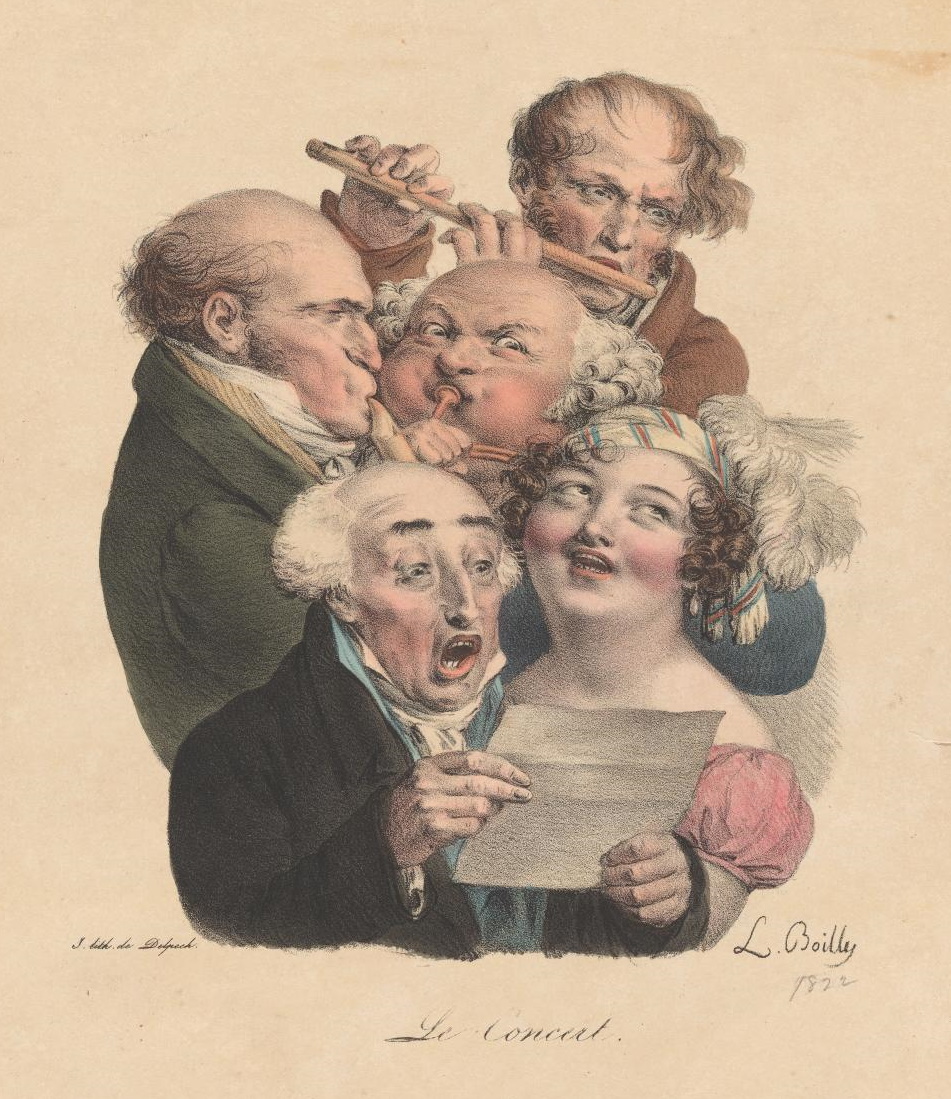
The concert; by Louis-Léopold Boilly, from the Recueil des profils et grimaces (1823-28); National Gallery of Victoria
https://www.ngv.vic.gov.au/explore/collection/work/24406 (DIGITISED)
Documentation
For all documentation TROVE tagged Sydney Amateur Concerts
https://trove.nla.gov.au/search?l-publictag=Sydney+Amateur+Concerts (TROVE tagged by Australharmony)
And compare also The Hobart Town Concerts of 1826-27
"Domestic Intelligence", The Monitor (26 May 1826), 4
http://nla.gov.au/nla.news-article31757478
A SUBSCRIPTION CONCERT, patronised by His Honor the Lieutenant Governor, will take place on Wednesday next, under the direction of Mr. Edwards. The Subscribers are tolerably numerous, and a rich treat is expected by the Cognoscenti.
We feel much pleasure in communicating this intelligence to the public. It affords no mean proof of the rapid progress of Taste in the fine arts. In our Metropolis, we begin now to have a GOUT for the elegancies of life.
ASSOCIATIONS: Most, and perhaps even all, of the coverage of the concerts in the Monitor (see below), probably derived directly from the pen of Edward Smith Hall, the editor, while his business partner in the paper, Arthur Hill, hismelf appeared at least once as a singer in the concert series (see Concert 5 below); William Stewart (1769-1854), of the 3rd Regiment (Buffs), served as Lieutenant Governor of NSW from his arrival in Sydney early in 1824, until 1827, when he left with his regiment for India; he was Thomas Kavanagh and the Band of the 3rd Regiment's commanding officer.
"MEMOIR OF THE LATE MAJOR-GENERAL STEWART", Bathurst Free Press and Mining Journal (15 April 1854), 2
http://nla.gov.au/nla.news-article62048048
[News], The Australian (27 May 1826), 3
http://nla.gov.au/nla.news-article37071586
Within these few week's an attempt has been made at introducing some greater degree of sociability amongst the respectable portion of the inhabitants of Sydney than there has been hitherto. Several spirited individuals have formed themselves into a society, under the denomination of the "Sydney Amateur Concert Society," who propose getting up concerts once or twice a month. They are intended to be conducted by Messrs. Sippy and Edwards, who, we are led to understand, possess very eminent musical talents. The latter gentlemen are the projectors of this rational and instructive species of entertainment and, for the attempt alone, and at the outset we can scarce look for more than an attempt, they deserve much credit. For the present the society propose to use, as a concert room, one of Mr. Hankinson's in George-street. Arrangements are in progress for the accommodation of visitors on the first night; which, it is expected, will be on Wednesday next. The expences are to be defrayed by subscription; this, for the first quarter, does not exceed five dollars. The persons wishing to become subscribers to be first balloted for among the members. We shall drop the theme at present, in the hope that this species of innocent recreation may meet its just share of patronage.
ASSOCIATIONS: George Sippe (master of the Band of the 57th Regiment); John Edwards (professor of music); James Hankinson (d. 1830; licensee of the Freemason's Tavern, Sydney)
"Domestic Intelligence", The Monitor (2 June 1826), 4
http://nla.gov.au/nla.news-article31757499
THE first of the proposed Amateur Concerts will not take place until Wednesday Evening next. COLONEL DUMARESQ and CAPTAIN PIPER have become Subscribers.
[News], The Australian (3 June 1826), 2
http://nla.gov.au/nla.news-article37071387
We are glad to state that the intended periodical Concert to be held at the Freemasons Tavern in George street, is likely to be patronised to a greater [3] extent than what was anticipated, by its projectors. The first rehearsal took place on Wednesday last. The Concert is intended to be on Wednesday evening next. Colonels Stewart and Shadforth have in a very liberal and handsome manner promised the assistance of some of the best musicians among their respective bands - the buffs and the 57th; and amongst the other subscribers of this week we are gratified to observe the names of Captain Piper, Colonel Dumaresq, and the Sheriff.
ASSOCIATIONS: Henry Dumaresq (brother-in-law of, and military secretary to Ralph Darling (governor of NSW); John Piper (naval officer); Henry Shadforth (commander, 57th Regiment); Band of the 3rd Regiment (military band); Band of the 57th Regiment (military band)
CONCERT 1
Wednesday, 7 June 1826
Large Room, Freemason's Tavern (James Hankinson's rooms), George Street, Sydney
Program
(reconstructed from reviews)
PART 1
1 OVERTURE . . . James HOOK (1746-1827)
("in which violins, violoncello, and horns took up their parts")
WORK UNIDENTIFIABLE; perhaps one of Hook's two widely disseminated overtures, that to The double disguise, or that to The lady of the manor
2 GLEE - Peace to the souls of the heroes . . . John Wall CALLCOTT (1766-1821)
PERFORMERS: Mr. Clarke (vocalist); John Edwards (vocalist); Thomas Kavanagh (vocalist); George Sippe (pianoforte)
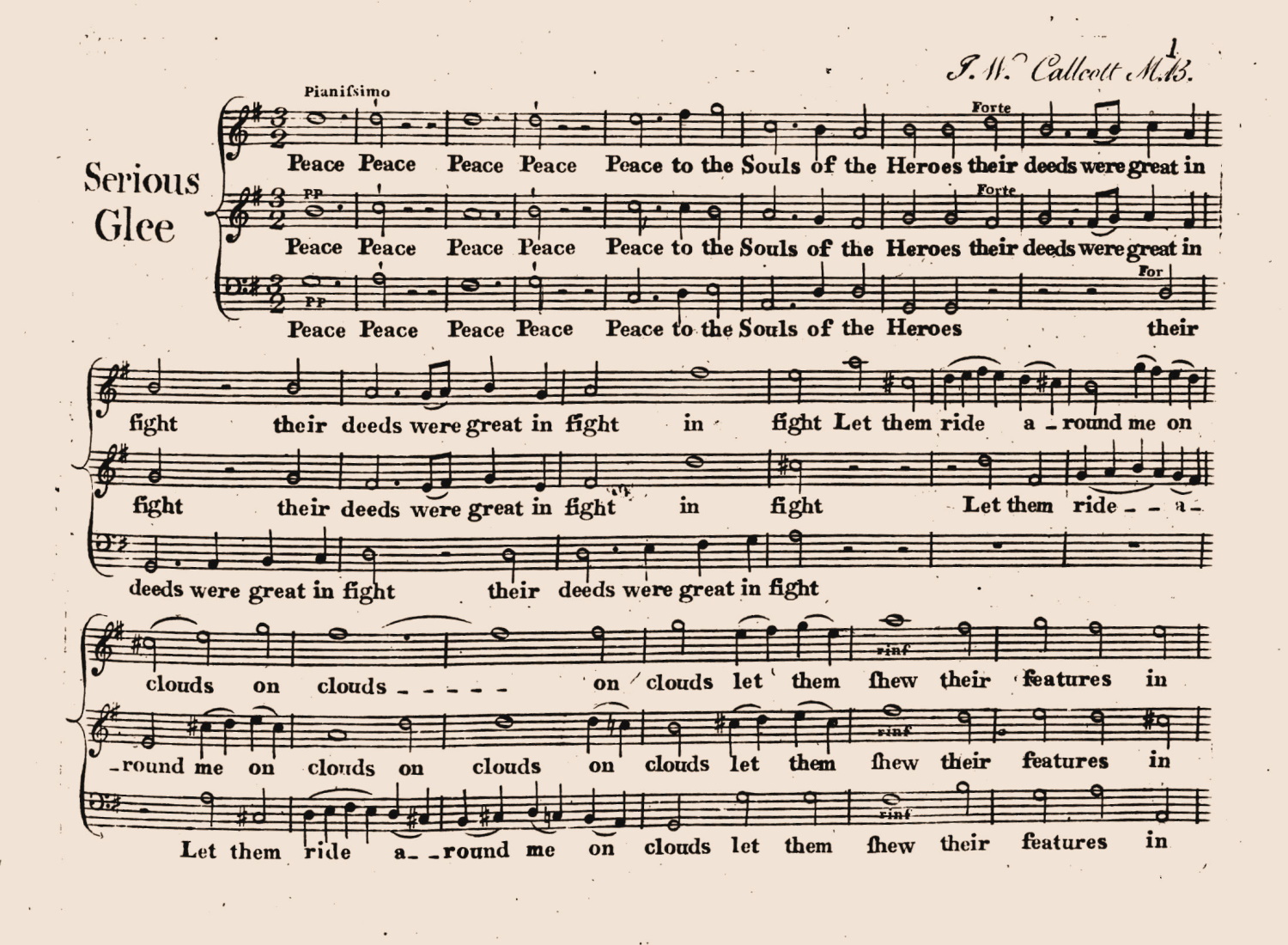
The professional collection of glees, for three, four, and five voices; composed by the following authors, Callcott, Cooke, Danby, Hindle, Stevens & Webbe (London: Printed for the authors, & sold by Longman & Broderip, [1791])
https://books.google.com.au/books?id=EXxa16BpHQkC&pg=PP5 (DIGITISED)
Modern editions:
http://imslp.org/wiki/Special:ReverseLookup/257181 (DIGITISED)
http://www1.cpdl.org/wiki/index.php/Peace_to_the_souls_of_the_heroes_(John_Wall_Callcott)
Modern performance, The Canterbury Clerkes (Saydisc 1986)
https://youtu.be/SNksymPpb0g?t=65 (STREAMED SOUND)
3 FLUTE QUARTET . . . Ignace PLEYEL (1757-1831)
PERFORMERS: Joshua Frey Josephson (flute) [John Edwards (violin); Thomas Kavanagh (viola); George Sippe (violoncello)]
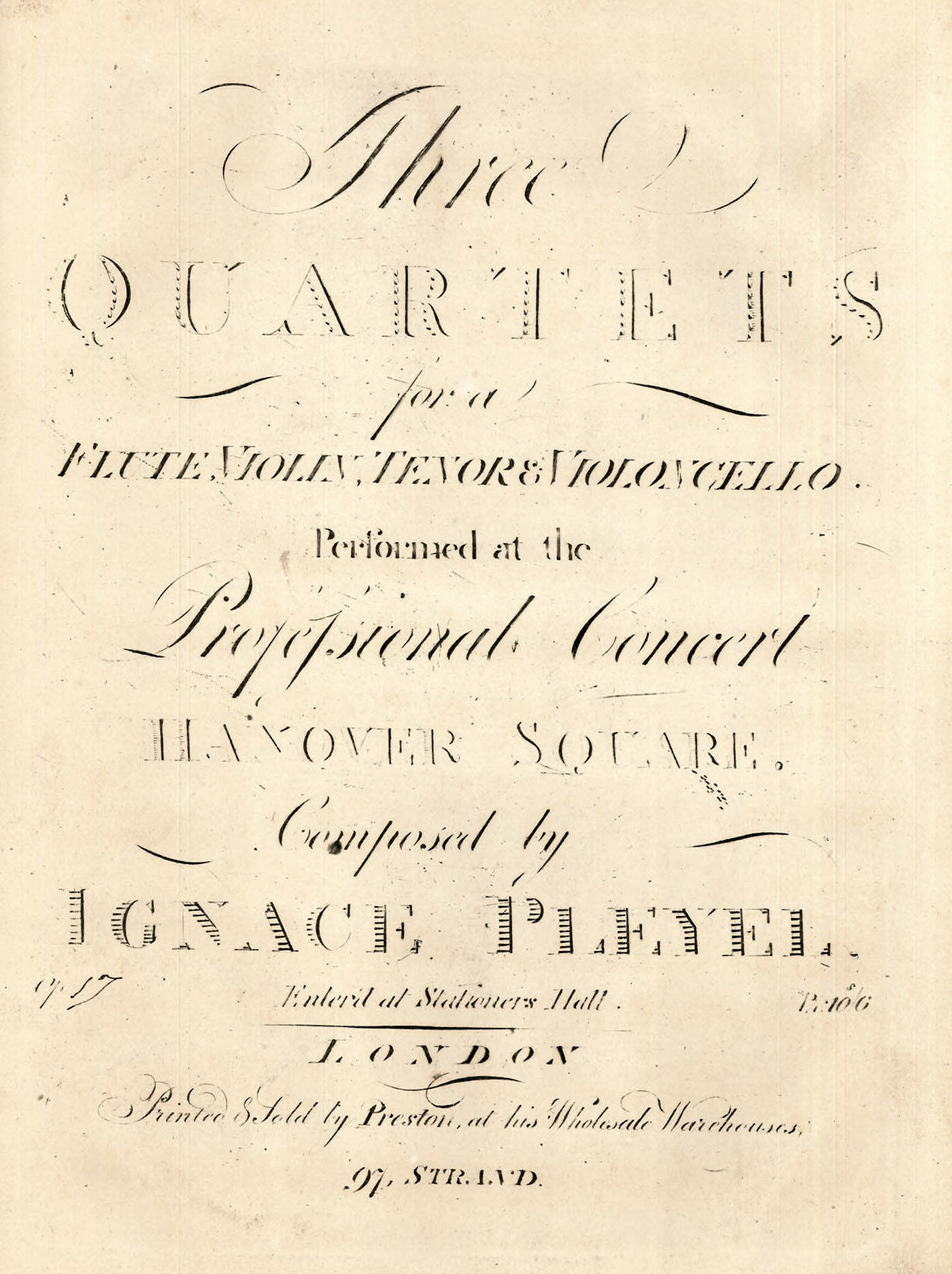
Three quartets, for a flute, violin, tenor & violoncello . . . composed by Ignace Pleyel, op. 17 (London: Preston, [c.1800]) (image Iowa Digital Library, The University of Iowa Libraries)
http://digital.lib.uiowa.edu/cdm/compoundobject/collection/pleyel/id/8505/rec/1 (DIGITISED)
4 SONG The wolf (in the comic opera of The castle of Andalusia) . . . William SHIELD (1748-1829)
PERFORMERS: John Edwards (bass vocalist); George Sippe (pianoforte)
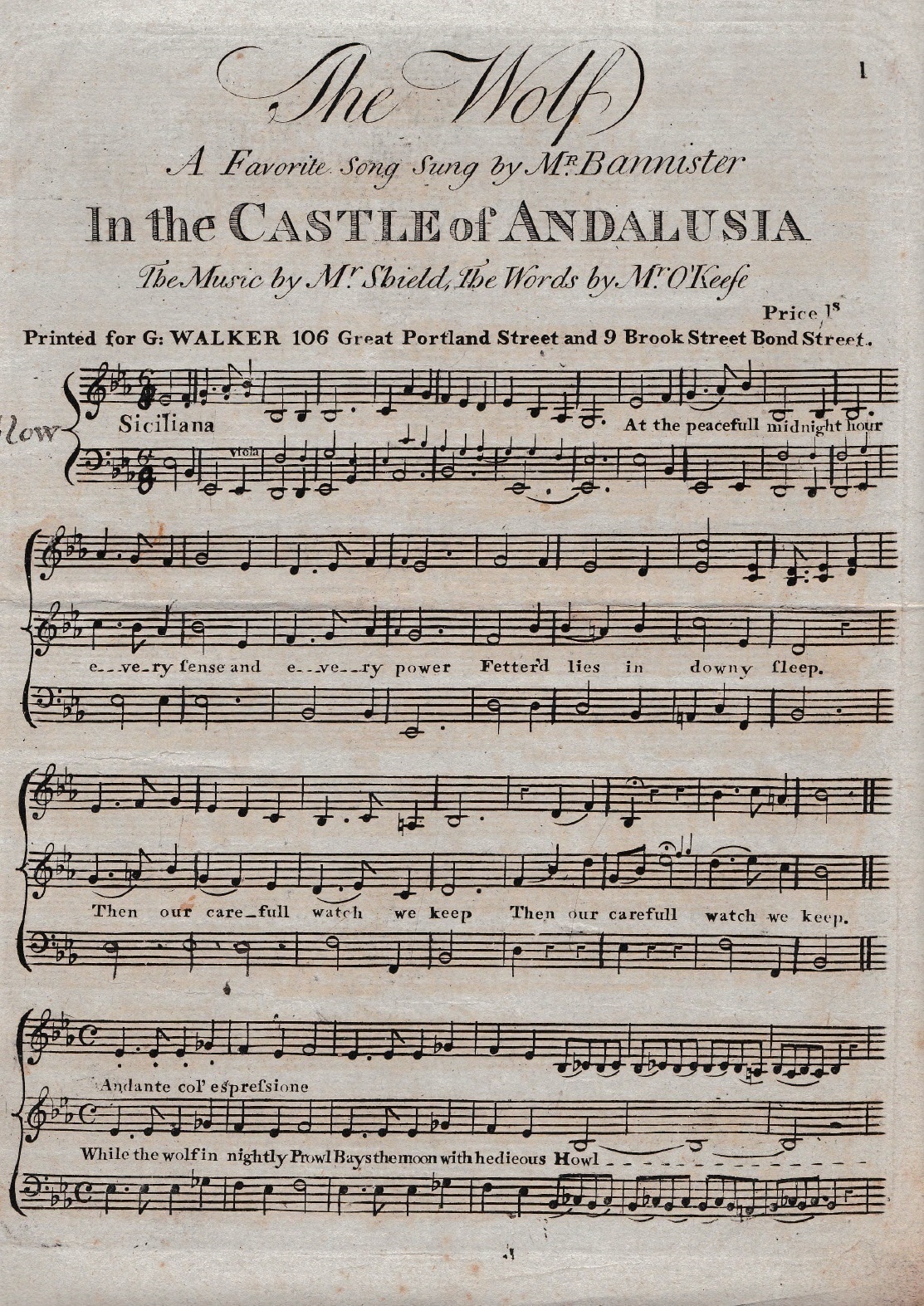
The wolf, a favorite song sung by Mr. Bannister in The castle of Andalusia, the music by Mr. Shield, the words by Mr. O'Keefe ([London]: Printed for G. Walker, [c.1800])
medialocal/shield-wolf.pdf (DOWNLOAD AUSTRALHARMONY ONSITE PDF)
[Melody and words only], The Edinburgh musical miscellany, or, modern songster . . . selected by D. Sime . . . vol. 2 (Edinburgh: Printed for John Elder, T. Brown and C. Elliot, and W. Coke, Leith, 1793), 84-87
http://digital.nls.uk/special-collections-of-printed-music/pageturner.cfm?id=87690799 (DIGITISED)
https://archive.org/stream/edinburghmusicv200ingl#page/84/mode/2up (DIGITISED)
[Melody and words only], The Edinburgh musical miscellany, or, modern songster . . . the second edition, vol. 2 (Edinburgh: Printed for Mundell, Doig, & Stevenson . . ., 1808), 84-87
https://books.google.com.au/books?id=QIZKAQAAMAAJ&pg=PA84 (DIGITISED)
5 OVERTURE . . . Wolfgang MOZART (1756-1791)
WORK UNIDENTIFIABLE
PART 2
6 OVERTURE . . . Gioacchino ROSSINI (1792-1868)
WORK UNIDENTIFIABLE
7 GLEE The witch's glee . . . Matthew Peter KING (c. 1773-1823)

A new edition revised by the author of the witches' glee from the first scene in Macbeth, composed by M. P. King (London: Goulding & D'Almaine, [c.1810s])
http://imslp.org/wiki/The_Witches_(King,_Matthew_Peter) (DIGITISED)
Lowell Mason and George J. Webb (eds), The Boston glee book: consisting of an extensive collection of glees, madrigals, and rounds, selected from the works of the most admired composers (Boston: Oliver Ditson, 1838), 162-65
https://archive.org/stream/bostongleebookco00maso#page/162/mode/2up (DIGITISED)
8 QUARTET Strings . . . PLEYEL
UNIDENTIFIABLE
9 SONG Now at moonlight's fairy hour . . . Thomas THOMPSON (1777-1834)
PERFORMERS: Mr. Clarke (tenor vocalist); George Sippe (pianoforte)
Now at moonlight's fairy hour, ballad composed with an arrangement for the harp or piano forte by Thomas Thompson (London: Goulding & D'Almaine, c.1823/24)
https://trove.nla.gov.au/version/6698063 (CATALOGUE RECORD ONLY)
Now at moonlight's fairy hour composed by Thomas Thompson (Philadelphia: G. E. Blake, n.d.) (image courtesy of the Lester S. Levy Collection of Sheet Music, The Sheridan Libraries, The Johns Hopkins University)
http://levysheetmusic.mse.jhu.edu/collection/117/013 (DIGITISED)
Now at moonlight's fairy hour composed by Thomas Thompson (Boston: G. Graupner, n.d.)
http://levysheetmusic.mse.jhu.edu/collection/111/028 (DIGITISED)
10 GLEE Glorious Apollo . . . Samuel WEBBE(1740-1816)
("All the performers . . .")
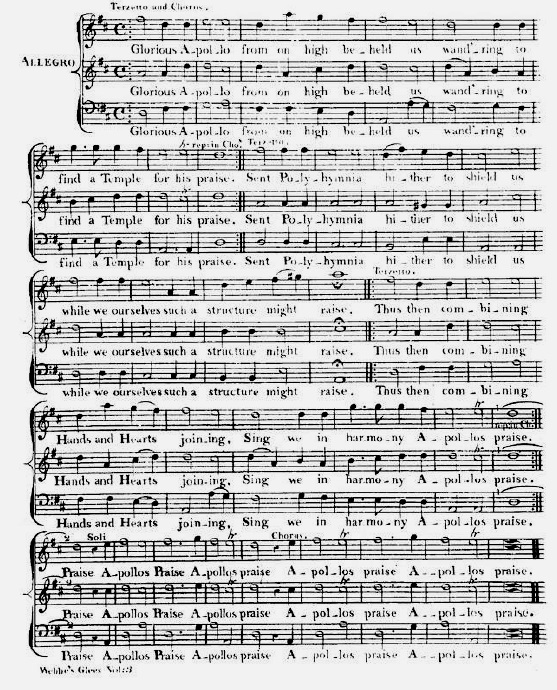
A selection of glees, duetts, canzonets, etc. principally taken from the 9 books published at different periods from the year 1761 by Saml. Webbe, volume 3 (London: Rt. Birchall, [c.1812]), 36-37
http://imslp.org/wiki/A_Selection_of_Glees,_Duets,_Canzonets,_etc._(Webbe,_Samuel) (DIGITISED)
http://imslp.org/wiki/Special:ReverseLookup/79208 (DIGITISED)
11 FINALE God save the king
("All the performers . . .")
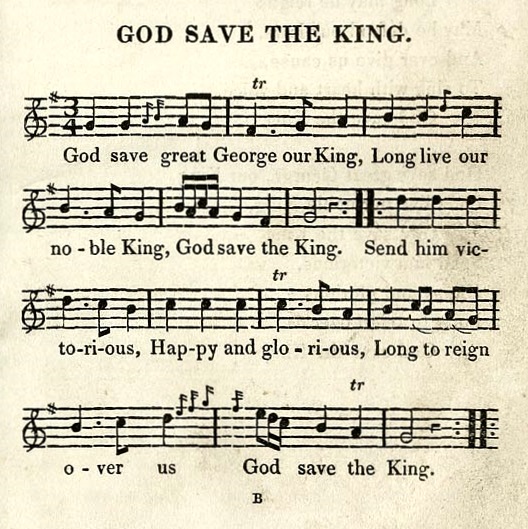
The sky-lark: a collection of songs set to music (London: Thos. Tegg, 1825), 1 (image National Library of Scotland @ Internet Archive)
https://archive.org/stream/skylarkcollectio00lond#page/n21/mode/2up (DIGITISED)
http://digital.nls.uk/special-collections-of-printed-music/pageturner.cfm?id=87681388 (DIGITISED)
Performers
Mr. Clarke (tenor vocalist)
John Edwards (bass vocalist, violin, leader)
Joshua Frey Josephson (flute)
Thomas Kavanagh (string player, bass vocalist, clarinet and leader of the Band of the 3rd Regiment)
George Sippe (pianist/accompanist, string player, clarinet and leader of the Band of the 57th Regiment)
"AMATEUR CONCERT", The Monitor (9 June 1826), 4
http://nla.gov.au/nla.news-article31757526
A very respectable and select Coterie assembled on Wednesday Evening at the Freemason's Tavern, to participate in the luxury of the long-talked of musical Melange. Hankinson's best room was very neatly fitted up for the occasion, and although the Ladies were not so numerous as we could have wished - the few who did grace the party, gave it additional brilliancy.
DR. CALLCOTT's fine composition, "Peace to the souls of the heroes," was sung with much effect by Messrs. Edwards, Sippe, Clarke, and Kavannagh. A quartette in a masterly style introduced Master Josephson, a pupil of Mr. Sippe on the Flute-obligato, who for his years evinced extraordinary talent. "The Wolf," (Shield) by Mr. Edwards was listened to with very great applause. This gentleman's voice is a fine mellow bass, and powerful; and he displayed much taste in the execution of this difficult air.
"Now at Moon-light's Fairy hour" is a charming song, - Mr. Clarke's voice possesses much sweetness and modulation; but he wanted confidence, so essential in a public singer. "The Witch's Glee" and "Glorious Apollo" were deservedly encored. The Finale, "God save the King" was received with very distinguished respect. All present appeared highly delighted. There is however a charm in the sweet and plaintive tones of the Female voice, which finds its way in a peculiar manner to the soul. The absence of female melody therefore caused us to regret that so delightful an ingredient in a public concert was not to be supplied in the first attempt made in Australia to sacrifice at the shrine of Apollo. There were 120 persons of both sexes present.
WE feel much gratified at the success of this zealous attempt to promote public sociability through the medium of so innocent a recreation as a Concert of well-selected music. In which, if the accompanying poetry be chastely selected, the minds of men may certainly be softened and subdued, so as to become the better prepared to receive and embrace those mild and courteous dispositions of heart, which are the glory of christianity. Such were the effects of David's harp. The Concert is the only public recreation which we have, from personal observation, found strictly consistent with religious and moral feeling. Theatres might be made so - Races might be made so - but they never have been, and we are afraid never will be. When they are, they shall receive our most cordial support. For the Author of our religion delighted in social assemblages of his kind, met on lawful occasions, and conducted lawfully. Hence his desire to promote social friendship by supplying his host with wine, (and good wine too) when either from want of foresight or of means, he had not been able to supply his numerous guests with what Christ considered (and, let no Pharisee object) a necessary and becoming appendage to the festive board.
ASSOCIATIONS: James Hankinson, 1825-27, landlord, the Freemason's Tavern, York-street, Sydney
"THE CONCERT", The Australian (10 June 1826), 3
http://nla.gov.au/nla.news-article37074154
The Amateur Concert, to the getting up of which, we alluded in a previous Number, made its debut, if it may be so termed, on Wednesday evening; and appeared, indeed, to give more satisfaction to its numerous and respectable auditors than we could, have anticipated, considering the limited means of the Colony, and, indeed, the few weeks which have intervened since its first starting into existence. At about half-past, six, the doors of the concert-room were thrown open; and, for about an hour after, numerous visitors, of both sexes, continued to pour in. There was a dressing-room very, properly set apart for the ladies, which communicated with another, containing refreshments; and, from this latter room, a door led into the music room, which, as it every now and then opened, showed off to advantage, the graceful and interesting form of some youthful female, or maturer mother, attired in a style of taste, and fashion, and neatness not often surpassed by our more experienced eighteen thousand miles removed ladies. The room was very well lighted and neatly fitted up for temporary purposes. From its quadrangular form, and the ceiling not being sufficiently lofty, it is not so well calculated for the purposes of a concert room, as might be wished; but we don't like, just now, to become critics, so must hasten on to the burthen of our song. At half past seven, most of the benches, which were arranged at proper intervals in parallel lines, from one side of the room to the other, directly facing the orchestra, and covered over neatly with green baize, were well filled up with married ladies, whose natural attraits a neat style of dressing only served to make the more pleasing, and married and unmarried gentlemen, and lasses, of whom many needed not "the foreign aid of ornament," to set them off.
The concert opened with an overture, by Hook, in which the violins, violoncello, and horns took up, their parts. In this the sound, from the unfavorable formation of the room, which we before alluded to, as well as its being so well filled with auditors, did not reach the ear in that full strain of harmony of which this overture is particularly capable, but was in some measure deadened. A glee by Callcott, entitled: "Peace to the Souls," was next sung, by three voices, with good effect; and a quartette between the flute, violin, tenor, and violoncello, followed. This quartette, which is one of Pleyel's, possesses much taste, and many passages, in which rapid execution, with a sweetness of expression, are very harmoniously combined. The flute obligato part was gone through admirably by a young amateur, not more than twelve years old, and drew forth universal admiration. Shield's celebrated song of "The Wolf," was next sung, and deservedly encored. This song requires a deep base, and extent of voice, which Mr. Edwards, the professional amateur who gave it, showed that, he was in a very eminent degree, possessed of. An overture by Mozart concluded the first part.
The second opened with one of Rossini's, and was succeeded by "The Witches," a glee taken from Shakespeare's play of Macbeth. An over fastidious taste might tempt one to say that the oft repeated words in this song, "When shall we three meet again?" even when given with the utmost variety they admit of, are apt to tire on the ear - however it went off very well, and was encored. After a quartette, between two violins, a tenor and violoncello, there was a very pleasing duet sung, one of Pleyel's - "Now at moon-light's fairy hour" - it commenced in a slow and plaintiff strain, and softly and gradually steals into a sportive and quickly-varied measure; both the first and second parts were well sustained, and tastefully accompanied on the piano forte, by Mr. Sippe. All the performers next joined in responding the praises of "Glorious Apollo," and "God save the King," with a full chorus, concluded the evening's diversion. To speak impartially, this latter air did not equal in its effect, other parts of the performance, owing, probably, to a want of previous rehearsal, but more probably to one or two cracked male voices, from among the audience, which every how and then, but seldom at the proper time, attempted to chime in most unharmoniously, producing any effect but a good one.
It was gratifying to witness the numerous and respectable group which assembled on this occasion - it was pleasing to find the ladies forming a third proportion, or more, of it, and adding, so materially, by their countenance, to the pleasures of the evening. At about half-past ten, hats and bonnets, and cloaks, began to be put in requisition, and all parties, to bend their course homewards. If the Amateur Concerts continue to be conducted with that regard to propriety, regularity and comfort, combining a rational and improving degree of amusement, as was the case on Wednesday evening, we cannot but wish and anticipate their encreasing success.
[News], The Sydney Gazette and New South Wales Advertiser (10 June 1826), 2
http://nla.gov.au/nla.news-article2185963
The Concert, on Wednesday evening last, went off with the greatest eclat. Many fashionables were assembled on the occasion, and not a few of the fair sex. The music was delightful - indeed in various respects superior to many things of the kind in Europe. It seemed as if Apollo himself had condescended to pour his melodies into the souls of our Australian Graces. The ladies were certainly particularly gratified, and all appeared spell-bound by the admirable exertion of the harmony. On the commencement of the grand national air of "God save the King," the whole of the Company stood up. This was unquestionably a moment of inspiration - every eye sparkled - and every bosom swelled with feelings of the liveliest loyalty. We trust the Institution will meet with efficient support.
[News], The Australian (17 June 1826), 2
http://nla.gov.au/nla.news-article37071541
It is expected that the next Amateur Concert will prove particularly attractive. The greatest improvement will consist in a change of the Concert Room. An Orchestra will be fitted up in the large School Room, in the Court-House, and over the Court Room. The use of this, the best apartment in the Colony for such a purpose, has been allowed to be appropriated to the Amateurs, and the Company through the kind acquiescence of the Governor, in an application to that effect from the managing Committee. His Excellency, in being requested to allow the Company to assemble in the above Room, without hesitation caused it to be notified to the applicants that he gave his full assent. The Archdeacon's concurrence was also obtained, as it might be considered necessary, on account of the control which he has over the public Schools of the Colony, and as it might be supposed that he had a right to interfere with the appropriation of the School-Room.
ASSOCIATIONS: Ralph Darling (governor, NSW); Thomas Hobbes Scott (clergyman, archdeacon of NSW)
[News], The Sydney Gazette and New South Wales Advertiser (21 June 1826), 3
http://nla.gov.au/nla.news-article2186010
The second CONCERT will be worth seeing and hearing. It is thought that the spacious room which has been so handsomely afforded by the GOVERNOR, will scarcely contain the whole, of the auditory - so well has the thing taken. This will lead to something else.
"THE SYDNEY AMATEUR CONCERT", The Australian (21 June 1826), 3
http://nla.gov.au/nla.news-article37073597
The second Concert will be performed this evening at the Court-House, Castlereagh-street - this Room having been allowed for the purpose, as we mentioned last week. The Company will no doubt lament not being able to use the Room in the Freemason's Tavern, as every attention was paid by the Landlord to their comfort, and as he shewed every anxiety to render the accommodations of his House as extensive as possible. The size of the Room, however, was found extremely inconvenient, both because the Company had to place themselves too near the Orchestra, and because there really was not sufficient space to admit with comfort all who attended. It is very probable that the attendance will be much more numerous this evening, on account of the satisfaction and amusement which were experienced on the former occasion.
We have thought, fit to subjoin the Bill of Fare. - It appears very tempting, and contains a tolerable sprinkling of variety. We have every reason to hope that the efforts of the originators of these Concerts, will be attended with success. The Committee of Managers are exceedingly anxious to avoid occasioning displeasure to any one, or creating any objections to patronising the Concerts, in the minds of the most fastidious. Due attention is paid to the introduction of Company, and every precaution taken to prevent all grounds of complaint. The Concert will commence at seven o'clock.
FIRST ACT
OVERTURE Il Barbiere di Siviglia, - - - Rossini.
GLEE See our Oars, - - - Stevenson.
QUARTETTO Two Violins, Tenor & Violoncello, Pleyel.
SONG The Tempest, - - - Horsley.
OVERTURE Italiana in Algieri, - - - Rossini.
SECOND ACT,
OVERTURE Lodoiska, - - - Kreutzer.
GLEE The Winds Whistle Cold, - - - Bishop.
DUETTO Two Violins, - - - Pleyel.
CQMIC SONG
GLEE The Wreath - - - Mazzinghi.
FlNALE Grand Symphony, - - - Mozart.
LEADER, - - - Mr. Edwards.
DIRECTORS FOR THE EVENING,
Mr. Pitman, Mr. Parker,
Mr. Foster, Mr. Robertson.
GLEE - (FOUR VOICES) - SEE OUR OARS.
SEE our Oars with feather'd spray,
Sparkle in the beam of day,
In our little bark we glide
Swiftly o'er the silent tide -
From yonder lone and rocky shore
The warrior Hermit to restore;
And sweet the morning breezes blow,
While thus in measur'd time we row.
RECITATIVE AND AIR - THE TEMPEST.
RECIT. - Servant of God, destructive pow'r!
Whilst, due to wrath the direful hour,
Thou warm'st a guilty world; -
When bursts to vengeance Heav'ns blest Sire,
When lightens fierce the Almighty's ire,
On sin-struck nation's hurl'd, -
Thy terrors load my trembling shell
Dread, as the madd'ning tones that swell
On yonder bleak domain,
Where heaves thy deep incessant roar
That shakes the snow-topp'd mountain hoar,
And with resistless ruin strews th'affrighted plain.
AIR. - Fierce o'er the darkly heaving waves,
The storm with boundless fury raves,
The seaman starts aghast;
His helm to ruthless vengeance giv'n
O'er' the vast surge speeds idly driven,
As shrieks the hurrying blast. -
Cease Emma, cease to hope in vain;
Thou ne'er wilt view thy Lord again;
He never will return!
Pale on the desert shore he lies,
No wife belov'd to close his eyes,
No friend in pitying tones, his wave-drench'd limbs to mourn.
GLEE - THREE VOICES - THE WINDS WHISTLE COLD.
The winds whistle cold, and the stars glimmer red,
The flocks are in fold and the cattle in shed. -
When the hoar frost was chill upon moorland and hill,
And was fringing the forest bough,
Our father's would trowl the bonny brown bowl,
And so will we do now.
Gaffer winter may seize upon, milk in the pail, -
'Twill be long ere he freeze the bold brandy and ale -
For our father's so bold, they laugh'd at the cold,
When Boreas was bending his brow:
For they quaff'd mighty ale, and they told a blythe tale,
And so will we do now.
GLEE - (THREE VOICES) - THE WREATH.
Shepherds tell me have ye seen
My Flora pass this way;
In shape and feature beauty's queen
In pastoral array?
A wreath around her head she wore
Carnation, lily, rose,
And in her hand a crook she bore
And sweets her breath compose.
The beauteous wreath that decks her head,
Forms her description true
Hands lily white, lips crimson red,
And cheeks of rosy hue.
Shepherds tell me have you seen,
My Flora pass this way. -
The Old Court House (School Room)
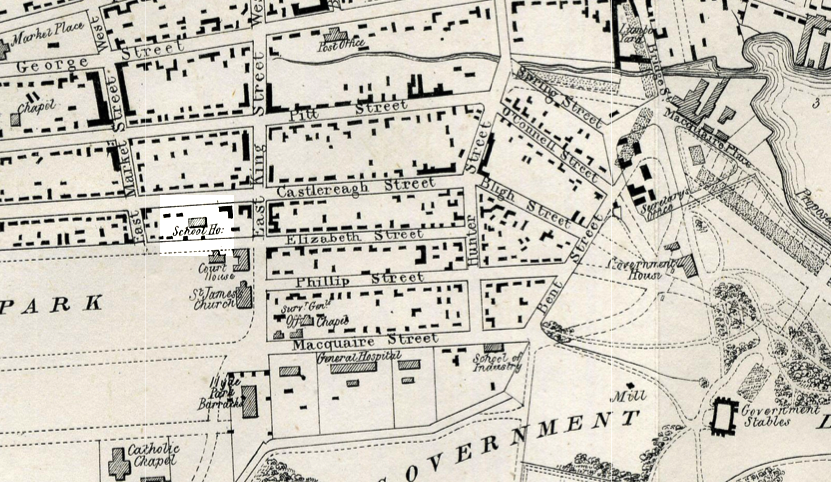
Plan of Sydney . . . 1836 (Sydney: Select Committee on Transportation; J. Basire, lith., 1837), detail; National Library of Australia, digitised
http://nla.gov.au/nla.obj-232683131 (DIGITISED)
See also: Plan of the town and suburbs of Sydney, August 1822, the Old Court House is no. 47; National Library of Australia, digitised
http://nla.gov.au/nla.obj-229911701
The large first floor room in the Georgian buidling known in 1826 as the "old court house", was already then in use as a school room. The building would much later in the century become the Girls High School. Before the land was aquired by David Jones and finally demolished in 1921, it stood in its original walled quadrangle, boardered on the west side by Castlereagh Street, and on the east by Elizabeth Street, opposite the south end of Hyde Park and the new supreme court. Either the upstairs or downstairs large rooms were still being used occasionally as concert rooms in the mid 1840s. In his 1892 historical survey, The drama and music in New South Wales, Francis Campbell Brewer (1826-1911) recalled that the violinist Leopold Rawack (Ravac) gave a concert there in 1846.

Old Court House, Castlereagh Street (Elizabeth Street frontage), Sydney in 1848: illustrated by copper-plate engravings of its principal streets, public buildings, churches, chapels, etc. from drawings by Joseph Fowles (Sydney: printed by D. Wall, and published by J. Fowles, [1848]); State Library of New South Wales, digitised
http://digital.sl.nsw.gov.au/delivery/DeliveryManagerServlet?embedded=true&toolbar=false&dps_pid=FL3326119 (DIGITISED)
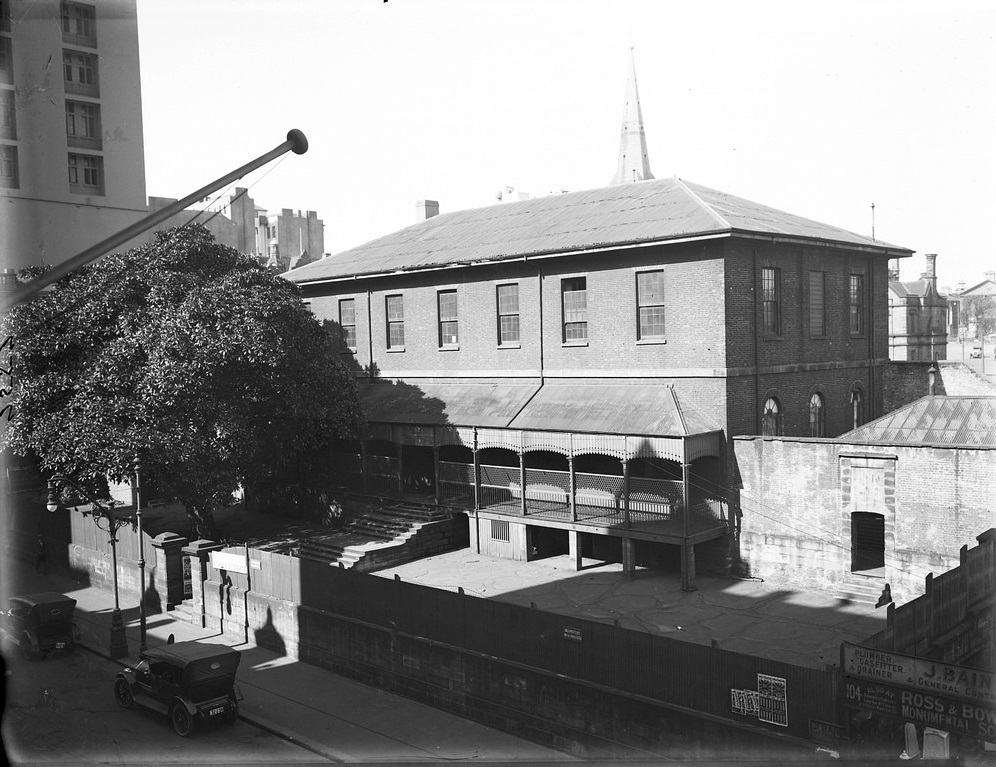
Sydney, Girls High School (Old Court House), Castlereagh Street frontage (with the spire of St. James's in the background), shortly before demoltion in 1921; State Records NSW, digitised
https://www.flickr.com/photos/state-records-nsw/16591433476 (DIGITISED)
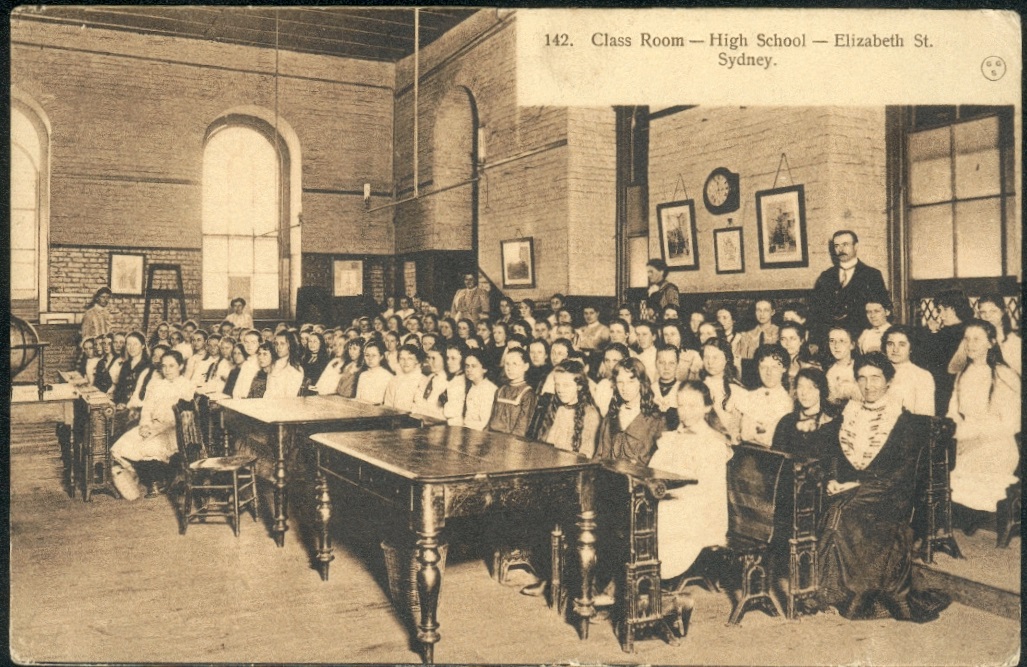
Postcard, c.1905, ground floor, school-room (Sydney: G. Giovanardi); AusPostalHistory.com, digitised
http://www.auspostalhistory.com/articles/2113.php (DIGITISED)
References:
F. C. Brewer, The drama and music in New South Wales (Sydney: Charles Potter, Govt. Printer, Sydney, for the New South Wales Commission for the World's Columbian Exposition (1893: Chicago, Ill.), 1892), 62
https://archive.org/details/dramamusicinnews00brew/page/62 (DIGITISED)
. . . Herr Rawack had previously appeared as a solo violinist, his first performance taking place in what is now the Girls' High School, in Castlereagh-street, Sydney . . .
ASSOCIATIONS: Francis Campbell Brewer (writer); Leopold Rawack (violinist)
"Old Chum", "OLD SYDNEY. No. 730", Truth (6 November 1921), 12
http://nla.gov.au/nla.news-article169186336
"The Ghosts of Castlereagh-street", resurected by Mr. C. Raleigh, of Batlow. - "With the demolition of the old building long known as the Girls' High School, and now the property of the David Jones firm, will go the last of the ancient land marks in Castlereagh-street . . .
CONCERT 2
Wednesday, 21 June 1826
Court House, Castlereagh Street, Sydney
Program
FIRST ACT
1 OVERTURE Il barbiere di Siviglia . . . ROSSINI
PERFORMERS: John Edwards (leader, violin); Thomas Kavanagh (viola); George Sippe (cello); orchestra of amateurs and members of the Band of the 3rd Regiment (master, Kavanagh), and of the Band of the 57th Regiment (master, Sippe)
2 GLEE See our oars with feather'd spray . . . John STEVENSON (1761-1833)
PERFORMERS: Mr. Clarke (tenor vocalist); John Edwards (bass vocalist); Thomas Kavanagh (bass vocalist); George Sippe (? vocalist, pianoforte)
"REVIEW OF NEW MUSICAL PUBLICATIONS", The Monthly Magazine (1 July 1811), 564
https://books.google.com.au/books?id=AyoAAAAAYAAJ&pg=PA564 (DIGITISED)
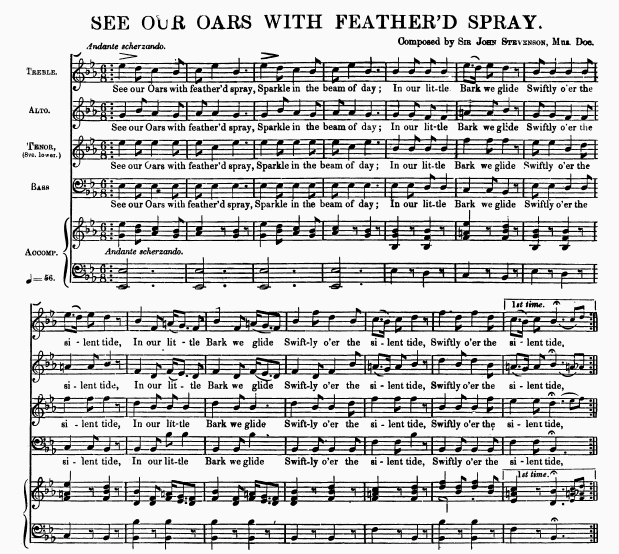
Novello's standard glee book . . . with an accompaniment (ad lib.) for the pianoforte, revised by J. Barnby . . . part 1 (London: Novello & Co., [1865]), no. 3
http://imslp.org/wiki/Novello's_Standard_Glee_Book_(Barnby,_Joseph) (DIGITISED)
http://imslp.org/wiki/Special:ReverseLookup/187914 (DIGITISED)
3 STRING QUARTET . . . PLEYEL
PERFORMERS: John Edwards (first violin); ?, second violin; ?, tenor [viola], cello; probably including Thomas Kavanagh (violin or viola); George Sippe (violoncello)
WORK UNIDENTIFIABLE
4 SONG The tempest . . . William HORSLEY (1774-1858)
PERFORMERS: John Edwards (bass vocalist); George Sippe (pianoforte)
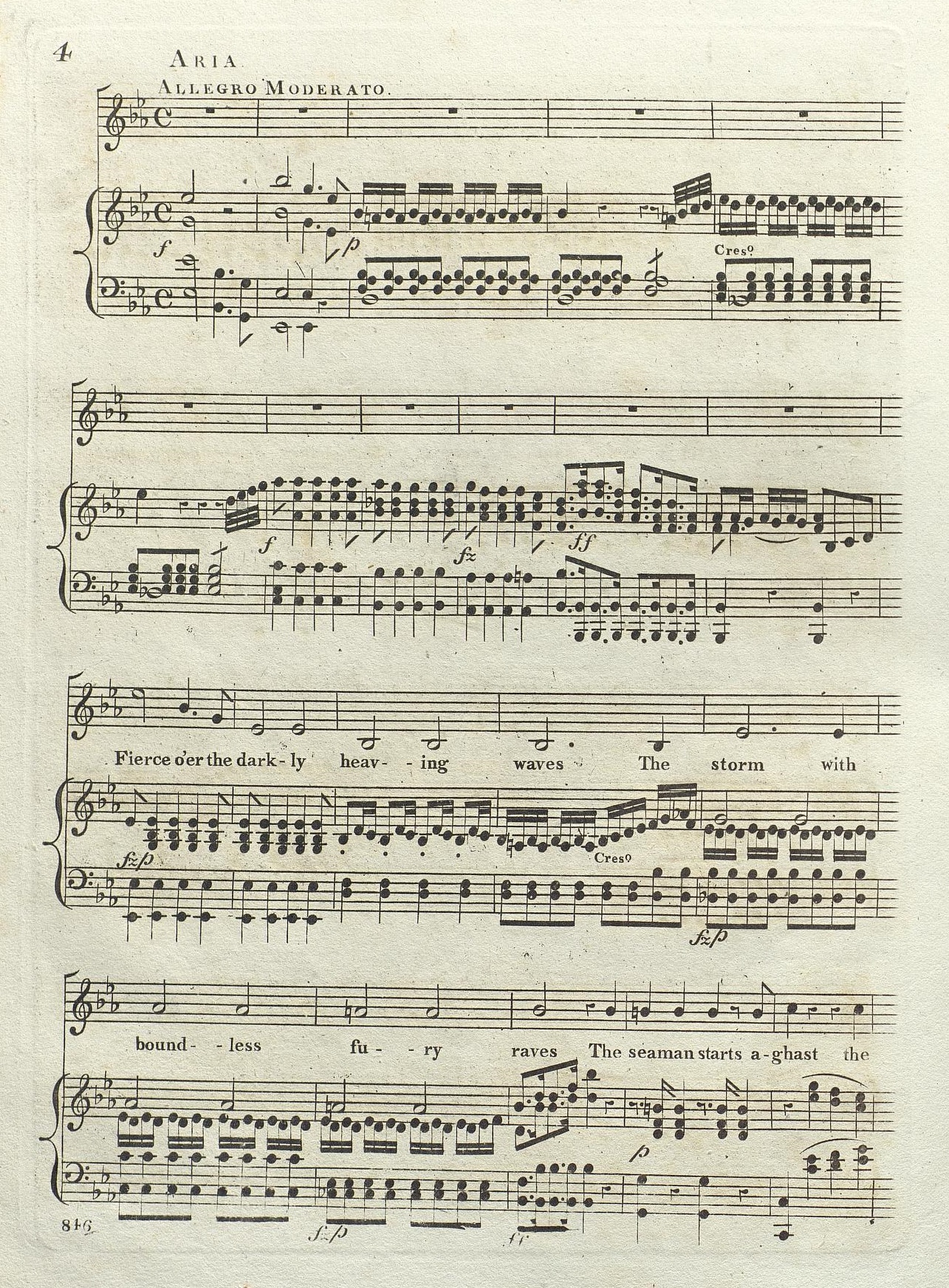
The tempest, a recitative & air, sung by Mr. Bartleman, the poetry by Dr. Drake, the music composed & inscribed to Miss Allott & Miss Jane Allott, By Wm. Horsley, Mus.Bac.Oxon (London: Printed and sold by Chappell & Co., [1818]) (exemplar, University of Southampton)
https://archive.org/details/hartley00590980/page/n89 (DIGITISED)
"MR. HORSLEY'S NEW COMPOSITIONS", The quarterly musical magazine and review 1 (1818), 371-75, especially 372
https://books.google.com.au/books?id=C7YPAAAAYAAJ&pg=PA372
Book of the words of a concert at the King's Concert Rooms on May 11, 1821 (London: Greatorex, 1821), 9-10
https://books.google.com.au/books?id=u0xgAAAAcAAJ&pg=PA9
5 OVERTURE Italiana in Algieri . . . ROSSINI
SECOND ACT
6 OVERTURE Lodoiska . . . Rodolphe KREUTZER (1766-1831)
"INTRODUCTION", to Lodoiska, comedie en trois actes en prose . . . mise en musique par M. Kreutzer (Paris: Huguet, ), 1-17
https://archive.org/details/lodoskaoulestart00kreu/page/n3/mode/2up (DIGITISED)
The original introduction includes parts for chorus, edited out of the later instrumental only arrangements
Johann Nepomuk Hummel (arr.), Twelve select overtures . . . arranged for piano forte, with accompaniments of violin and flute and violoncello (London: [1821])
A new edition of the overture to Lodoiska composed by Kreitzer (Philadelphia: B. Carr, n.d.)
ttp://levysheetmusic.mse.jhu.edu/collection/037/029 (DIGITISED)
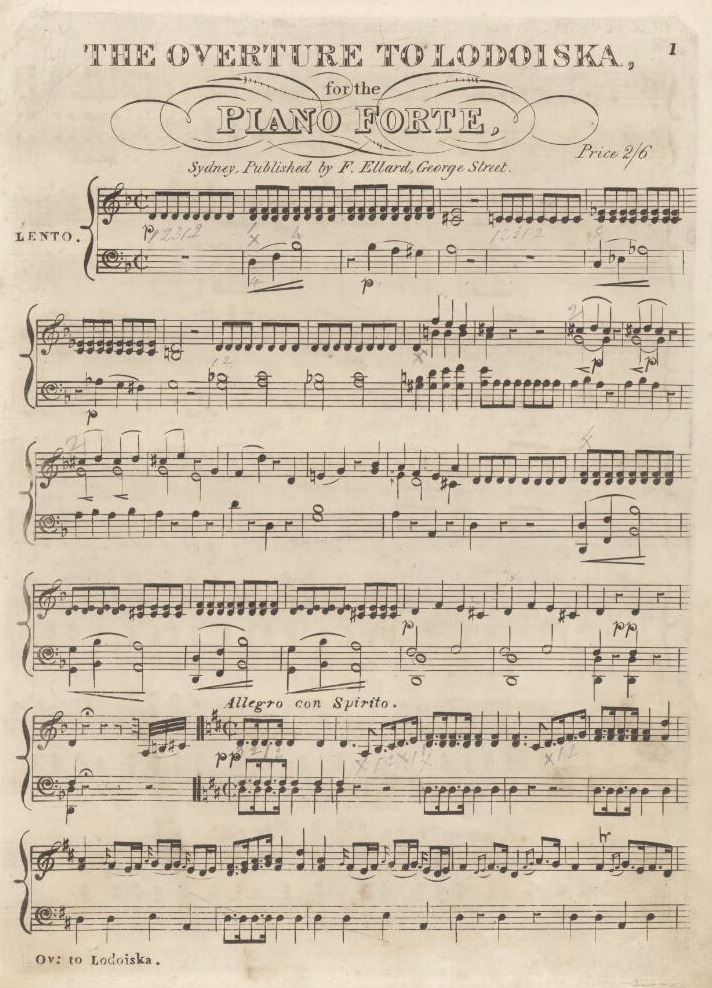
The overture to Lodoiska for the piano forte (Sydney: F. Ellard, [c.1840]) (image National Library of Australia)
https://trove.nla.gov.au/version/37685687 (DIGITISED)
http://nla.gov.au/nla.obj-168118404 (DIGITISED)
7 GLEE The winds whistle cold (from Guy Mannering) . . . BISHOP
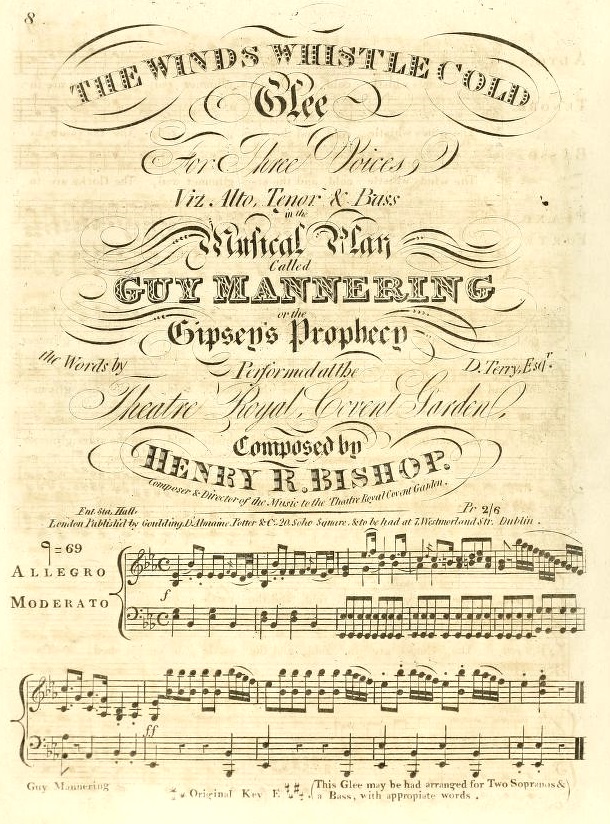
The overture, songs, duetts, glees, and chorusses in the musical play of Guy Mannering composed & arranged . . . by Thos. Attwood and Henry R. Bishop (London: Goulding, D'Almaine, Potter & Co., [1816]), 8-14
https://archive.org/stream/overturesongsdue00bish#page/n15/mode/2up (DIGITISED)
8 DUETTO, Two violins . . . Ignaz PLEYEL
PERFORMERS: John Edwards (violin); George Sippe (violin)
WORK UNIDENTIFIABLE
9 COMIC SONG The beautiful boy . . . [tune Ballinamony ora]
PERFORMERS: Barnett Levey (vocalist)
http://www.vwml.org/roudnumber/4888
[Words only, tune indicated], The universal songster; or, Museum of mirth . . . vol. 1 (London: John Fairburn, 1825), 81-82
https://books.google.com.au/books?id=Qis9AAAAYAAJ&pg=PA81 (DIGITISED)
[Words only] The British minstrel, and national melodist . . . volume 1 (London: Sherwood, Gilbert and Piper, 1827), 227-28
https://books.google.com.au/books?id=NrAwAAAAYAAJ&pg=PA227 (DIGITISED)
[Words and melody], Davidson's universal melodist . . . vol. 1 (London: G. H. Davidson, 1853), 181
https://books.google.com.au/books?id=zlMJAAAAQAAJ&pg=PA178-IA3 (DIGITISED)
[Tune only, earlier printed source], The Irish volunteers (London: Printed and sold by John Welker, n.d.)
http://levysheetmusic.mse.jhu.edu/collection/014/026 (DIGITISED)
See also, "The beautiful boy", Roud index 4888
https://www.vwml.org/roudnumber/4888
See also, "Ballinamona [oro]", Traditional tune archive
https://tunearch.org/wiki/Ballinamona
10 GLEE, The wreath (Ye shepherds, tell me) . . . Joseph MAZZINGHI (1765-1844)
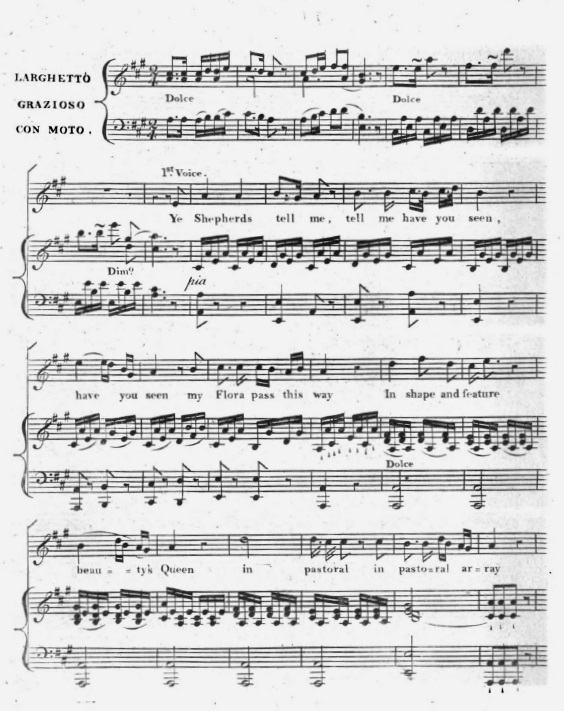
The wreath, a pastoral glee for three voices composed by J. Mazzinghi (London: Goulding, Phipps, D'Almaine & Co., n.d.)
http://imslp.org/wiki/Ye_Shepherds,_Tell_Me_(Mazzinghi,_Joseph) (DIGITISED)
http://imslp.org/wiki/Special:ReverseLookup/370082 (DIGITISED)
11 FlNALE Grand Symphony . . . MOZART
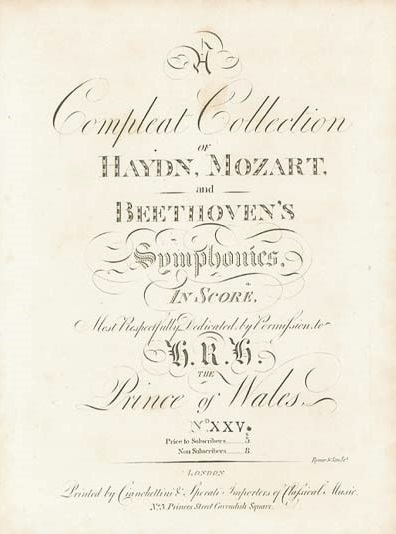
All the performance materials for works by Mozart played in the series probably derived ultimately from a printed series of the 6 Mozart "symphonies" then standard.
A compleat collection of Haydn, Mozart, and Beethoven's symphonies in score (London: Cianchettini & Sperati, [c.1809]; London: Lavenu, [c.1809])
Symphony No. 1 in E flat [K 543]
Symphony No. 2 in D [K 504, "Prague"]
Symphony No. 3 [K 620, overture to Die Zauberflöte]
Symphony No. 4 [K 492, overture to Le nozze di Figaro]
Symphony No. 5 in G minor [K 550]
Symphony No. 6 in C [K 551, "Jupiter"]
12 ANTHEM, God save the King
("all the performers")
Performers
Mr. Clarke (tenor vocalist)
John Edwards (leader, first violin, bass vocalist)
Joshua Frey Josephson (? flute)
Thomas Kavanagh ("tenor" [viola], bass vocalist)
Barnett Levey (comic vocalist)
George Sippe (violoncello, violin, pianoforte)
Members of the Band of the 3rd Regiment (clarinet and master Kavanagh)
Members of the Band of the 57th Regiment (clarinet and master Sippe)
"THE SECOND CONCERT", The Monitor (23 June 1826), 5
http://nla.gov.au/nla.news-article31757575
WE perceive this species of public recreation will succeed. Great praise is due to the persons who undertook the management of it. They have performed their difficult task with great adroitness. We did not count the assembly, but we suppose there were 250 persons of both sexes present. The ladies were not far behind the gentlemen in number. We noticed Colonel and Captain Dumeresq, Captain Piper and family, Dr. Douglas, Mr. Garling and family, Mr. Browne, Mr. Mills, Mr. Norton and family, several magistrates, and many of the most respectable merchants of Sydney. The room was elegantly if not superbly lighted up, and the decorations were in the same character of chaste simplicity. The apartment was not a foot too large, even on the present occasion. It will soon be too small. If the seats had not been pretty closely arranged together, the space for passing to and fro, would have been greatly contracted. Their closeness however, was of great inconvenience to that portion of the company who happened to sit in the centre. They could not leave their seats to promenade or shake hands with a friend, without great inconvenience. But the seats being all fixed, this inconvenience must be borne with cheerful patience, till a room more suitable be obtained. The great drawback, was its want of height, and consequent inadequacy, when filled with company, to convey the sound. We felt for the performers in this respect - they must have experienced the deadening effect of the walls and ceilings. A placid and calm satisfaction lit up the countenances of all the company - nothing could exceed the real pleasure which seemed to pervade young and old - it did not go the length indeed of mirth (except, when according to a barbarous but ancient custom, a foolish comic song was introduced) but it was of a more elevated kind, though equally pleasurable. The handing about of fruit, &c. not by servants, but by the Directors, our friends, was in unison with the elegant getting up of the whole. In fact, these Concerts are really well managed. But we must now proceed to give an account of the Acts. THESE were two in number-viz.
FIRST ACT.
Glee ... Stevenson.
Quartetto ... Pleyel.
Song ... Horsley.
Overture ... Rossini.
Overture ... Kreutzer.
[recte SECOND ACT]
Overture ... Rossini.
SECOND ACT.
Glee ... Bishop.
Duetto ... Pleyel.
Comic Song.
Glee ... Mazzinghi
Finale ... Mozart.
WE must pass by the overture glee and quartetto of the first act, chiefly for want of room, but not being present at their execution, we cannot speak so accurately respecting them as of the others. We listened with deep feelings of pleasure to Mr. Edwards's song of "The Tempest." The countenance of this gentleman, his attitude, the soul which he infuses into every thing he undertakes, remind us of one of the ancient bards, so beautifully portrayed in Ossian, and the works of Scott. Whether he sing or play, Mr. Edwards inspires the sympathetic part of his audience (we here positively omit all those who encored the silly comic song) with his own enthusiasm - consequently, the spirit of poetry, and the finer charities of life, were all conveyed to the head and heart in that delightful manner which the powers of music and poetry can create when blended together. The "Tempest" is an admirable song. We mourn whenever we hear exquisite poetry and music bestowed on subjects which tend neither to exalt patriotism, nor any other moral sentiment. Poetry and music are designed to elevate and console man in his fallen state. Therefore, it is a poor excuse to say, such attempts are too sublimated for the million. The million will always admire what the more intellectual part of society recommend and countenance. There is something ignoble, when first rate talents like those of Edwards are to be a had, that the few hours we do devote to the refinements of life, we cannot be allowed to make the most of them, and purify and elevate the public taste, instead of descending to gratify the present low standard. The recitative of "The Tempest" is exquisite - the air is exquisite - the music beautifully corresponds with the words - and Mr. Edwards discovered that he felt every line with the poet's own fire and feeling.
We must finish the songs now we are on the subject. The Glee by Messrs. Cavenah, Edwards &c, was not so well sung as the one sung afterwards. The performers were not sufficiently careful to pronounce the words at once. The first articulation of a word, even in singing, is discordant, or at least not melodious. Hence this articulation in a duet or trio, ought to be at the same instant. The subject of this song was of too low a cast, to merit our eulogium. To prostitute the ennobling power of poetry and music in praise of brandy and ale, appears to us, remarkably stupid. Though Flora is celebrated in lines and strains very delightful, yet we should have had our satisfaction much enhanced, if besides the beauties of her face, and the tastefulness of her dress, we had been favoured with a description of some of those delightful mental qualities, which must have doubtless resided in a form so fair. But Flora is of the weaker sex, whom we always love to hold up to the admiration of the stronger. Therefore we give this Glee its meed of praise. It was delightfully executed, and we did not percieve [sic] the repetition of the fault above adverted to. If however Flora be a personification of nature in spring, our praise shall be unmingled.
HAVING spun out our report of the Songs to such undue length, we must cut the Music short. Suffice it to say Mr. Edwards always led off in grand style. It does us good to witness this gentleman's fire, worthy of the minstrels of old. The Overture of Lodoiska, and the Finale were equally well executed; but the sweetness and variety of the latter pleased us most. We regretted the absence of some instruments to fill out some of the harmonies; but still more the un-echoing nature of the room. The sound fell very dead. The closer we stood to the Orchestra therefore, the more agreeable we found the music. But of course the deficiencies were the more palpable. Master Josephson performed but little - but that little was excellent. Mr. Levey sung the comic song with great address, and real good-nature.
*
AN elegant assemblage of colonial fashionables partook on Tuesday evening of the hospitality of SIR JOHN JAMISON, at Cummins's Hotel. A sumptuous entertainment was prepared, and all departed highly pleased with the good cheer and refined hilarity which pervaded the hospitable entertainment. THE establishment of concerts has effected something towards forming a social compact among the good folks of Sydney. Balls and suppers, and other convivial entertainments, have already arisen out of the concert assemblies. We learn that two of the amateurs gave or give evening parties of the former description during the present week. Sociability is hostile to malignity, selfishness, and slander; and therefore we are glad to hear of its extension.
ASSOCIATIONS (audience members): [Colonel] Henry Dumaresq (brother-in-law of, and former military secretary to Ralph Darling (governor of NSW); [Captain] William Dumeresq (private secretary to Darling); [Captain] John Piper and family; Henry Douglass (surgeon, magistrate, clerk of the council); Frederick Garling and family; James Norton and family
[Editorial], The Monitor (23 June 1826), 3-4
http://nla.gov.au/nla.news-article31757577
. . . For our own parts, we have always been of opinion, that Races, like Balls, Theatres and Concerts, might be made sufficiently moral to justify the presence of pious men. They have never indeed been made so yet. But the vigilance of the Constables at the late Races in apprehending drunkards and swearers who gave vent to their hellish language - the sobriety and decorum of the people in general-the discountenancing which gambling experienced - the general freedom from outrage and blasphemy for which the Races near Sydney were distinguished - all these things have been insisted upon so much by spectators (for we do not visit races our selves) that we began to suspect, that the day was approaching, when men of strict virtue and piety, might really walk with their families to the course, and witness (what we still maintain it to be in itself) a cheerful and exhilirating spectacle . . .
ASSOCIATIONS: Edward Smith Hall (editor)
"AMATEUR CONCERT", The Australian (24 June 1826), 3
http://nla.gov.au/nla.news-article37074782
The Concert on Wednesday evening was as warmly supported, and afforded that share of gratification which we anticipated - which the rational mind - a mind not biassed by inconsistent and mistaken notions of religion naturally experiences, in point of size and accommodation, and those are two material requisites, the room in which this second concert was got up, is nearly unexceptionable, and if its height but harmonised with its length and breadth, would be entirely so. The lofty concave ceiling, and sounding board, and the other arcana which are found to contribute so essentially towards collecting and reflecting vocal or instrumental sounds, and conveying them in a full and improved strain of harmony, to every ear, the present room, it is to be regretted, is not possessed of. These deficiencies, however, may be considered nearly counterbalanced by its capacities in other respects its extreme length is about sixty feet by forty. The benches, which are made use of by the children belonging to the free school during the day time, and whose instruction during that time, the operations for fitting up the room for the purposes of a concert need not in the slightest degree retard, are capable of accommodating, without inconvenience, between three hundred and fifty, and four hundred persons or more.
At half-past six on Wednesday evening its doors were thrown open for the reception of visitors. Care had been taken previously, to distribute lights along the stair-case, and passages leading toward the room, but not sufficiently strong to injure the effect, which the sudden brilliant display of numerous well-trimmed lamps, suspended at just intervals, and the still more brightly beaming eyes of many a fair and youthful female, produce on the fancy. An orchestra which had been reared the previous day or two, for the votaries of the muses to perform their functions in, appeared prominently, on entering; it occupied one end of the room, and looked like a little artificial Parnassus. The neatly white-washed wall at the back part, was tastefully relieved, by different flowering and evergreen shrubs, disposed in a kind of natural and graceful drapery, with pendent lights here and there intermingled. Norfolk pines, in form of stars, from the first to the least magnitude, with bending honeysuckle, filled up intervals between the folding of the drapery, and supplanted the more renowned and classic laurel. Along both sides of the concert-room this artificial drapery was tastefully conducted; and, as it hung in festoons, from the upper part of each window, it in some measure served to conceal the rudeness with which those have been constructed, and to give them an appearance of being arched, which they really are not. A centre branch, of five lamps, and two others diverging towards each end, threw a brilliant light over the whole; and, when those preparations, as well as many more, were completed, the four Gentlemen who had been chosen to "do the honors," for that evening, and who had exerted themselves so very creditably, prepared to enact each and every one his part.
From a little before seven, the company began to pour in, and for half an hour or more after, the young and the old, and those neither the one nor the other, but between both, and of both sexes - the married, and the single, accompanied or followed each other, without intermission. There were ladies - "currency" and "sterling" - ladies tastefully and chastely attired, and each and all possessing some peculiar traits of female elegance - many of them (not to speak ungallantly) - "beautiful as the Houries," with forms
"fresher than the morning rose
When the dew wets its leaves; unstained and pure."
The performers had all got themselves arranged, within the orchestra, and their different instruments up to concert pitch, by half-past seven, when the concert opened, with an overture, by Rossini. But we have not mentioned the "souls attuned to harmony," who were present and comfortably seated, about this time - there were Colonel and Captain Dumaresq, and Captain Piper, with a number of ladies - the Sheriff, and the Clerk of the Council, with his lady; and the Clerk of the Peace, and some more ladies; the Commissary General of Accounts, and other Commissaries General; a few Military, and a good many Civil officers, and casual residents, with their ladies; and, though "last," not "least," belles and beaux of Sydney - making up, in all, a pleased and pleasing group, of about two hundred and seventy, or more.
But we are forgetting Rossini's overture, of "Il barbiere de Siviglia," though not one of this finest, this overture the principal performers did ample justice to, and not more in the violin part, which Mr. Edwards executed with considerable skill and judgment, than in the violoncello parts. It would not be just to pass over in silence the merits of Mr. Sippe, who performed on the latter instrument, as well as the piano forte and second violin, in a very masterly manner. He took up each instrument occasionally. In overtures, the long-drawn notes of the violoncello reached the ear in full and mellowed tones. His execution on the piano forte, when occasionally accompanying Messrs. Edwards, Clark and Cavenagh, in glees and in the recitative, and air of The Tempest, was rapid and distinct - the occasional swells and cadences, in the accompaniment to this latter air, were finely executed. Two overtures, with a quartette, a glee, and the song of The Tempest, composed the first act. The vocal and instrumental parts, of this latter fine air, gave general satisfaction, and seemed to suit the tastes of the auditory more than any other piece in the act.
The overture to Lodoiska opened the second part - all the performers joined in playing this fine piece of music, and all the audience joined in listening to it, with unalloyed pleasure. This overture is old, and has been hacked by different composers - it has been converted into a quadrille and a glee, and what not; but the original composer's taste still appears to be acknowledged - "age cannot wither, nor custom stale its infinite variety." A humorous glee, "The winds whistle cold" followed next. Messrs. Edwards, and Clark took up their different parts with great ease and justness of voice and diction. They were well accompanied on the piano forte, by Mr. Sippe, who took up the second violin, in a duett which followed between Mr. Edwards and him. After this a rather unusual addition, but not on that account the less acceptable, was made - it was a comic song, which was sung inimitably, and with a just and natural fund of humour, by an amateur. The singer excited the risible faculties of all portions of the auditory - the grave and the gay - males and females, and the cry of encore, when it concluded, was universal. A grand Symphony, by Mozart, became the finale to the second act, but not to the concert; for some loyal voices would, very properly, insist upon having "God save the King," and they had it, and one all stood up while all the performers, but no "cracked voices" from amongst the audience, as on the first night chimed in, "and then and there was hurrying to and fro," and each gentleman who was sufficiently lucky to get one, presented an arm to his lady, and shewed the way towards an anti-room, from whence the latter shortly after emerged, muffled up in bonnets and cloaks, and by the mild and chastened light of a full orbed moon, quitted this arena of the muses, for their different abodes, with pleased and pleasing countenances. All the performers, but more particularly, Messrs. Edwards, Sippe, Clark, and Cavenagh, got through their parts very creditably. In the decorations and arrangements of the room, the four Members who acted as directors, evinced no mean taste nor want of attention to politesse and comfort.
ASSOCIATIONS (audience members): [Colonel] Henry Dumaresq (brother-in-law of Darling); [Captain] William Dumeresq (private secretary to Darling); [Captain] John Piper and family; John Mackaness (sheriff of NSW); Henry Douglass (surgeon, clerk of the council); Frederick Garling (clerk of the peace); William Lithgow (assistant commissary general)
"SYDNEY AMATEUR CONCERT", The Sydney Gazette and New South Wales Advertiser (24 June 1826), 3
http://nla.gov.au/nla.news-article2186054
The second Concert took place on Wednesday evening last. By the kindness of His EXCELLENCY the GOVERNOR, the Subscribers were allowed the use of the large room immediately over the Court-house, in Castlereagh-street, than which, with the single exception that the ceiling is rather too low to allow a free circulation of sound, no place could have been chosen belter adapted for the purpose. However, this is but a trifling objection when the very great advantages it possesses in point of size, situation, and the circumstance of its being ready fitted up with neat and commodious benches, are taken into account. But to begin. The room is of an oblong form, with windows closely ranged on every side, encircling which, and reaching from the roof nearly to the floor, rich festoons of evergreens,
"with flowers and fennel gay,"
were arranged in tasteful and mazy groupings. The piers between were also elegantly decorated with branches of palm, pillars of laurel, and wild flowers, beautifully displayed.
"Each niche with ivy leaves was drest,
And every post with holly;"
and the entire lighted up with numerous Grecian lamps suspended from above, presented a coup d'oeil which, prepared as we were to expect every thing that taste and liberality could procure, in point of brilliancy and arrangement, far exceeded our most sanguine hopes. The Company were received at the door of the Concert-room by the Directors for the evening, whose attentions and politeness were incessant. Between two and three hundred persons, we should suppose, were present; a large proportion of whom were ladies, whose various attractions fixed the admiring eye upon us bright a galaxy of beauty as ever adorned an Australian assembly.
A commodious orchestra was erected at the far end of the room, and presented, together with the amateurs, some of the best performers from the Bands of the 3d and 57th Regiments, under the immediate direction of Messrs. Edwards and Sippy. The performances commenced with Rossini's Overture to II Barbiere di Siviglia, a composition at once light, brilliant, and sparkling; and which, from its harmony, its fine transitions, and the admirable manner in which it was executed, was received with enthusiasm and acclamation. II Barbiere di Siviglia is perhaps one of the most charming of Rossini's productions. Its history is curious. When Rossini arrived at Rome, with all his fame about him, the directors of the theatre there having had the words of several operas rejected by the police, as containing obnoxious allusions, in a moment of disappointment and ill-humour, proposed to Rossini to compose Il Barbiere di Siviglia, which had been already set to music by Paesiello. The Government consented, and Rossini wrote to Paesiello acquainting him with the circumstance, who, though a man of genius, was not devoid of a mixture of gasconism, returned for answer, that he was perfectly satisfied with the choice of the Roman police, but had no doubt as to the result. Rossini then immediately set about the composition, which was finished in thirteen days. He has said, that at placing himself at the pianoforte, on the first representation, his heart throbbed violently. The Romans seemed to consider the music tiresome and heavy, and very inferior to Paesiello; but, so far as we are able to appreciate, it is excelled by none, save the Giovanni of the Shakespeare of music MOZART, which is still, and perhaps ever will remain unrivalled. In the execution of this extremely difficult overture, the performers acquitted themselves in a highly creditable manner. Mr. Edwards, the leader, betrays considerable science and judgment. He appears to have a perfect command of his instrument. His tones are full and harmonious, and the precision of his fingering, combined with rapidity of execution, decidedly rank him as a first rate performer on the violin. The taste and judgment displayed by Messrs. Sippy and Kavenagh, on the violoncello and tenor, contributed greatly to the fine effect of the delightful overture, which, however, in our opinion, to render it still more effective, required a considerable accession to the bass.
"See our Oars," a delightful glee for 4 voices, by Sir John Stevenson, followed the overture, and was very effectively given by Messrs. Kavenagh, Clark (a gentleman who promises to become a considerable acquisition to the vocal department), Edwards, and Sippy, and was ably supported by a train of judicious and effective accompaniments by the latter gentleman, who presided at the pianoforte. After a Quartetto, by Pleyel, for two violins, tenor and violoncello, Mr. Edwards sung Horsley's "Tempest," recitative and air, which, though well given, did not excite much interest. The composition, however scientific, is, notwithstanding, heavy and ineffective. Mr. Edwards' voice, over which he possesses considerable power, is a deep full toned bass; his embellishments seemed to have been carefully selected, and his articulation, that great desideratum in vocal music, was clear and harmonious. Rossini's overture to Italiana in Algieri, concluded the first Act.
The second Act opened with Kreutzer's overture to Lodoiska, a composition with which all are acquainted, and which will always please. "The winds whistle cold," an exquisite glee for three voices by Bishop, was delightfully sung by Messrs. Kavenagh, Clark, and Edwards. "A duetto for two violins," by Messrs. Edwards and Sippy, drew forth considerable applause. A comic song, "The beautiful Boy," given with the most irresistable drollery, by Mr. B. Levey, was applauded to the "very echo which did applaud again," and was honoured with an unanimous encore. "The Wreath," by Mazzinghi, arranged as a glee for three voices, was next sung by Messrs. Kavenagh, Clark, and Edwards. This, which was originally composed as a solo, is a very pleasing little glee, though rather deficient in variety, and somewhat confined in modulation. A grand symphony from Mozart, concluded the evening's performances, at a few minutes before eleven o'clock, and the company retired to enjoy, in repose, the recollections of the evening, and highly delighted with an entertainment, that, from the style in which it was conducted, reflects infinite credit on the subscribers.
Various are the opinions as to the influence, on public morals, of this species of amusement, the taste for which evidently seems to be gaining ground amongst us; but, says a celebrated English writer, "I have often wondered to hear men of good sense and good nature express a dislike to music, when, at the same time, they do not scruple to own, that it has the most agreeable and improving influences over their minds; it seems to me an unhappy contradiction, that persons should have an indifference for an art which raises in them such sublime pleasures."
We understand that the amateurs have in rehearsal the overture, and some selections from Der Frieschutz, an extraordinary production, which has rendered the musical fame of WEBER so popular in England.
Tempest Margaret Paul's private concert and ball
Friday, 23 June 1826
Residence of John and Tempest Margaret Paul, Jamison's New Buildings, George Street, Sydney
Program
SONG Home, sweet home . . . BISHOP
PERFORMERS: Tempest Margaret Paul (soprano vocalist, pianoforte)
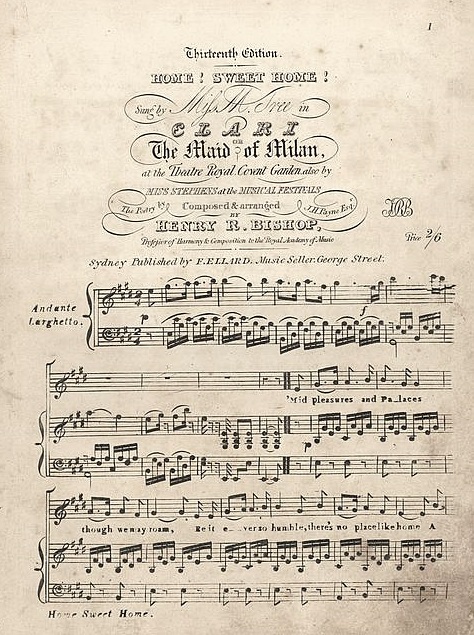
Home! Sweet Home! Sung by Miss M. Tree in Clari or The Maid of Milan . . . composed & arranged by Henry R. Bishop . . . Thirteenth Edition (Sydney: F. Ellard, [c.1840] (image National Library of Australia)
https://trove.nla.gov.au/version/44702361 (DIGITISED)
http://nla.gov.au/nla.obj-168974947 (DIGITISED)
BRAVURA The soldier tir'd . . . Thomas ARNE (1710-1778)
PERFORMERS: Tempest Margaret Paul (soprano vocalist, pianoforte)
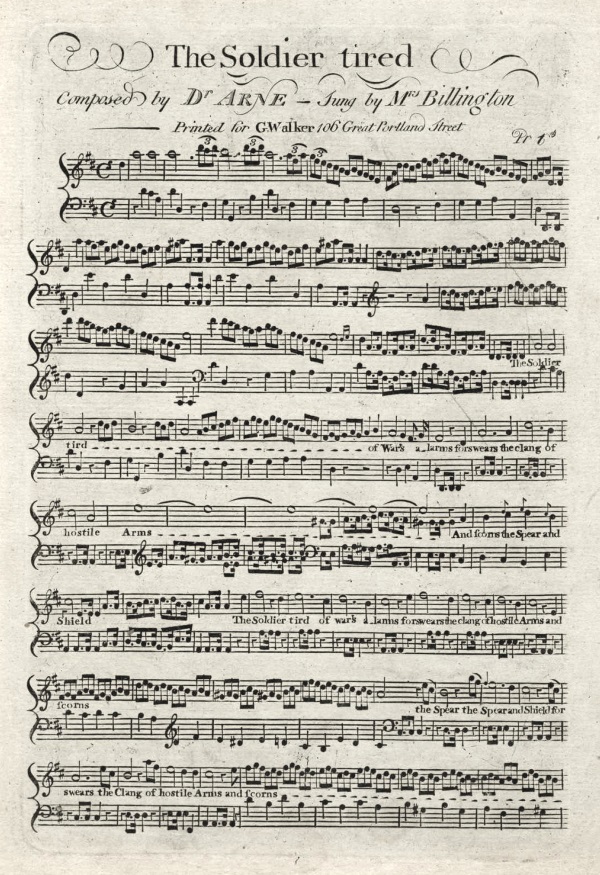
The soldier tired, composed by Dr. Arne, sung by Mrs. Billington ([London]: G. Walker, n.d.
The soldier tir'd [Arne] (unidentified early 19C edition)
http://levysheetmusic.mse.jhu.edu/collection/029/016 (DIGITISED)
See also Firestone Television (1963) video performance by Joan Sutherland
https://www.youtube.com/watch?v=YmPDURJ6U9o (STREAMED VIDEO)
COMIC AND SENTIMENTAL SONGS
("by gentlemen")
COUNTRY DANCES &c.
PERFORMERS: Five members of the Band of the 3rd Regiment, master Thomas Kavanagh
Performers
Tempest Margaret Paul (soprano vocalist, pianoforte)
5 or 6 members of the Band of the 3rd Regiment (probably a mixed ensemble of strings and winds; under their master Thomas Kavanagh, leader, clarinet or violin)
Commentary
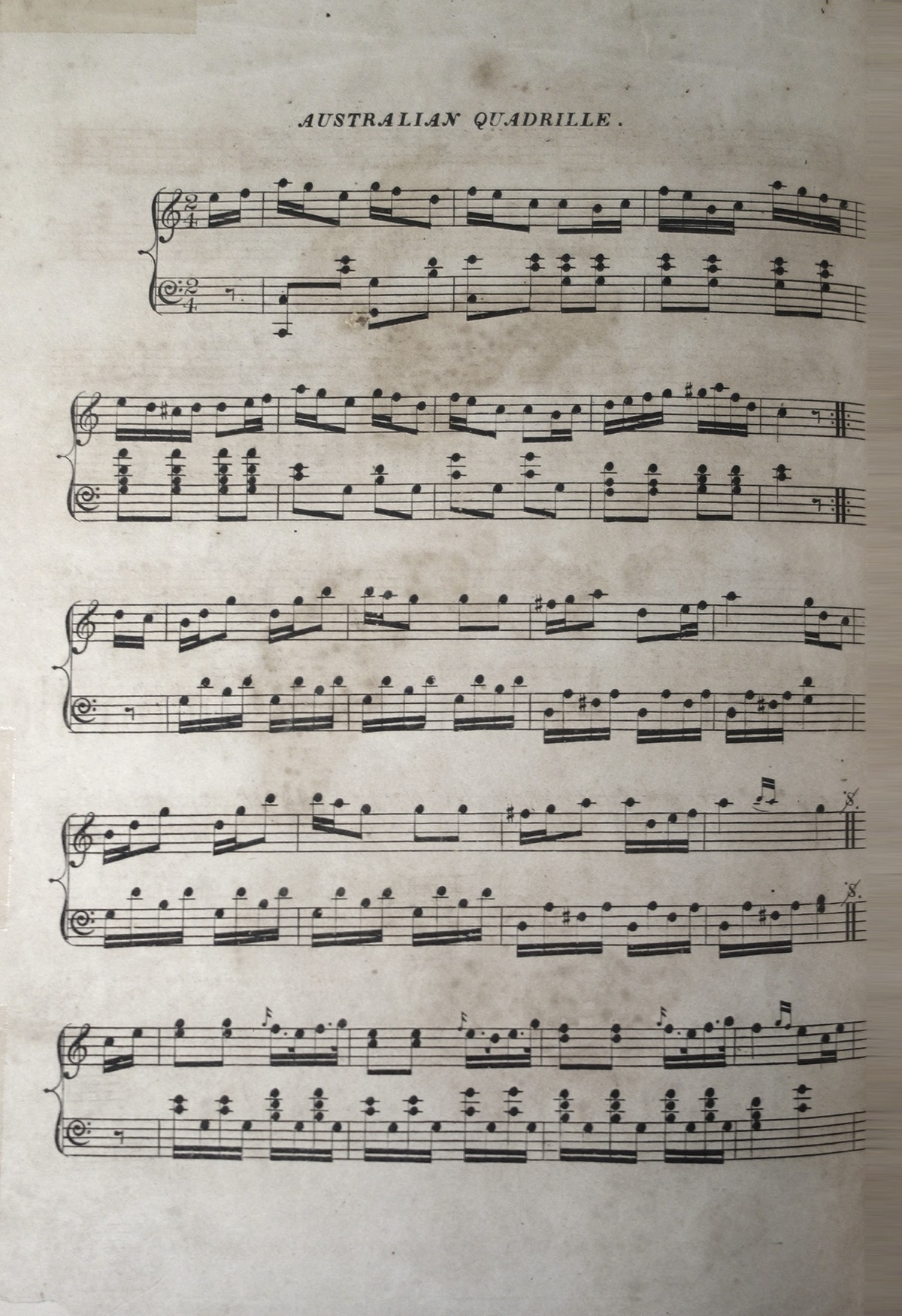
Currency lasses, an admired Australian quadrille, composed by a LADY at Sydney, and performed there with great applause by the Bands of the 3rd (or Buffs), 39th and 57th Regiments (London: Engraved, Printed & Published by J. CROSS, 18 Holborn, opposite Furnivals Inn. Price 1/6, [c.1830/1])
https://archive.org/details/Currency52313 (DIGITISED)
The Pauls had only recently moved into a new house in George Street, part of an evidently quite grand development financed by John Jamison (1776-1844). The concert and ball was held to celebrate the baptism of their second "currency lass" grand-daughter, Margaret Isabella Paul (born Sydney, 12 December 1825, daughter of George Paul and his wife Sarah), and it is highly likely then that one of the dances performed was Paul's quadrille Currency lasses.
For full details see Tempest Paul and Currency Lasses. The gentleman vocalists who sang on the occasion probably included George Paul (who sang later in the Amateur Concerts) and Barnett Levey, he and his wife shortly to hold a similar function to celebrate the baptism of their first child, a daughter, born on 1 June.
[News], The Australian (24 June 1826), 3
http://nla.gov.au/nla.news-article37074780
Mr. and Mrs. Paul gave a splendid entertainment to their numerous friends yesterday evening. Nearly one hundred Cards were issued on the occasion. The Party assembled in celebration of a Christening. After Tea ---there was a Concert---after the Concert---came a Dance---after dance a Supper---after supper another Dance, and then---day light appeared. Six of the Band of the Buffs were engaged.
[News], The Sydney Gazette and New South Wales Advertiser (24 June 1826), 2
http://nla.gov.au/nla.news-article2186051
Mr. and Mrs. PAUL, of George-street, entertertained a very large party of their numerous friends yesterday evening, at their new residence, which has only lately been taken possession of. The ladies in the ball-room exhibited no small share of taste and adornment, as well artificial as natural. The supper was truly irresistible - the delicacies and wines being abundant and various. Supper being over, dancing was renewed and kept up, till the morning star gave the signal that it was time to part - in order to meet again.
[News], The Australian (28 June 1826), 2
http://nla.gov.au/nla.news-article37073806
The Lieutenant Governor has signified his desire to become a subscriber to the Amateur Concert. In a letter to that effect, addressed to the Secretary of the Acting Committee, His Honor assigns the premature dissolution of Lieutenant Woods, as the sole cause of his not being present at the Concert, on last Wednesday evening.
Mrs. Paul's private concert, which we but cursorily noticed last week, was one of peculiar attraction; and both in concert and ball-room, the muses and graces mingled together most harmoniously. Private concerts, are in this sequestered land, in this semi-metropolis, Sydney, a novel innovation on the amusements of an evening. They are however, a pardonable, a delightful innovation, where such natural powers of voice, and so perfect a knowledge of music can be brought together, as the lady to whom we allude, and who is perhaps the first within the Colony, that has led the way toward so elegant and refined a species of entertainment, is gifted with. The enlivening contre-danse was for some time superseded by the treat which Mrs. Paul afforded her numerous fair female and male visitants, in the performance of several different pieces and accompaniments on the piano-forte. Among other delightful airs, "Home, sweet home" was given, with those touching tones of sweetness and expression which thrill to the heart, which irresistibly, may be said to "take the prisoned soul and wrap it in Elysium" - tones peculiar to a Madame Vestris, Catalani, or our English vocalist, Miss Stephens. "The soldier tired," with its difficult and rapid passages, its alternate swells and cadinces was sung and played over with the same ease and success as the other pieces. There were other songs by gentlemen, comic and sentimental songs, which made a pleasing and diverting demele. The room was extremely well calculated for the purposes of a music-room, and the light and graceful manner of its decorations, as well as of the ball room, showed that the proprietor's taste for music did not exclude a taste for the other elegancies of life. Five of the Buffs' band attended in the ball-room in a neatly fitted-up orchestra, and contre-dancing, which was only interrupted for a short time by a visit to the supper room, was kept up with spirit by fifteen to twenty couples, to an early hour of Saturday morning, when the company by degrees took leave of their courteous host and hostess.
Mr. and Mrs. B. Levey intend celebrating the christening of their first child, by a ball on Tuesday next. They intend having it at the Free Mason's Tavern. One hundred invitations are to be issued.
ASSOCIATIONS: William Stewart (lieutenant governor, commanding officer of the 3rd Regiment); refernces to Lucia Vestris (English vocalist), Angelica Catalani (Italian vocalist active in Britain), and Catherine Stephens (English vocalist)
July
[Advertisement], The Sydney Gazette and New South Wales Advertiser (5 July 1826), 1
http://nla.gov.au/nla.news-article2186115
NOTICE. - It is requested that Subscribers, to the SYDNEY AMATEUR CONCERT, do send in to the Secretary, by Friday, the 14th of July next, the Names of the Visitors they purpose to bring to the ensuing Concert, which will take Place on Wednesday, the 19th Inst. No. 10, George-street.
ASSOCIATIONS: 10 George-Street, business address of John Edwards
"Domestic Intelligence", The Monitor (7 July 1826), 2
http://nla.gov.au/nla.news-article31757622
MR. B. LEVEY seems determined to outvie his compeers in his desire to freely contribute to the public entertainment. Foremost among the supporters of the concerts in their infancy; a contributor to their harmony in the next place, we now find him engaged in the erection of a very extensive pile of buildings in George street, partly intended for stores, and a very fine area of 80 feet, to be fitted up with sounding boards, &c. for the purpose of dramatic representation. The whole of the building which Mr. L. expects to have completed in about four months, will exceed the Waterloo stores in height by 30 feet.
. . . A Correspondent writes us, -
"The next concert already attracts attention. I think the old English etiquette should be rigidly to; and all gentlemen who present their tickets for admission in boots, black stocks, or frock coats, should be refused admission. The Committee have refused a gentleman every way worthy to be admitted as a subscriber. Two black balls exclude a candidate. This places every candidate under the dominion of any single person in the Committee, who may have a quarrel with him. Four balls are few enough in a committee of thirteen, to exclude a candidate for admission. Black-balling of the gentleman alluded to, has created some vexation."
In these sentiments we cordially concur.
"TO THE EDITOR OF . . .", The Monitor (7 July 1826), 5
http://nla.gov.au/nla.news-article31757611
Royal Palace Kira-Billie, June 25th 1826.
SIR, IT is with feelings of extreme sorrow that I mention to you a circumstance which took place the last evening of the Concert. OUR gracious Sovereign had signified his intention of visiting the room last Wednesdays - consequently his suite attended him there at eight o'clock. His Majesty was accompanied by the Ladies from the Palace, Her Majesty, Princess Coudda, &c. &c. When we attempted admittance we were repulsed. The body-guard wished to interfere - but His Majesty with his usual mercy, ordered Peace. The Queen was terrified beyond any thing - and the interesting Princess, extremely agitated, burst into tears.
THINK, Sir of our sensations, when we saw a huge fellow thrust our King from the door-way - I knew not how to express myself - The Queen, her Majestic appearance - His Majesty's dignified behaviour - and last, the elegant all-accomplished Coudda - youngest Princess of the reigning family thrown as they were on our protection - so generally beloved as they supposed themselves to be. I know not what may be the result of my communication; good or bad, I have only done my duty. But it will appear strange, if a monarch such as His Beneficent Majesty, Bungaree the First, is not considered entitled to a seat, or indeed, a throne, in the Concert-room.
I have the honor to subscribe myself, Sir, Your humble Servant,
HEK.
Captain in the Body Guards.
P. S. I have since read in the Australian, that "God Save the King," was loudly called for; perchance it was intended for a kind of apology; be it even so - His Majesty's house-hold cannot accept of any apology - unless it be "a public one."
ASSOCIATIONS: A real or imagined incident probably involving Bungaree (c. 1775-1830), of the north shore tribe; see also the several painted portraits and printed images of Bungaree by the concert steward Augustus Earle, for example, [News], The Sydney Gazette and New South Wales Advertiser (23 August 1826), 2
http://nla.gov.au/nla.new s-article2186404
[News], The Australian (8 July 1826), 2
http://nla.gov.au/nla.news-article37074501
The next Amateur Concert is fixed for the 19th inst. which will fall on Wednesday, week. From the preparations already in progress, and the exertions which are incessantly making by the Managing Committee, to add still more to the gratification and comfort of the subscribers and visitors, by an accession to the musical talent and improved accommodation, we are inclined to anticipate a rich treat on the next evening. The subscribers have already increased to more than a hundred, and are still increasing. It would greatly forward the views of the Committee, if those who mean to be present at the next Concert, would make their intentions known some days previously, through the channel pointed out in an advertisement, which appears in the front page.
Between 40 and 50 young people of both sexes, and more than half the latter number of married folks, attended Mr. and Mrs. Barnet Levey's hospitable invitation to a ball and supper last Tuesday evening. The occasion they met to do honor to the birth and baptism of a young daughter, was never more happily celebrated than by the joyous groupe who assembled on the above evening, in one of the largest and most accommodating rooms of the Freemason's Tavern. The room was simply, but neatly decorated. A handsome three-branched lamp impending from the centre, and flanked all round by lights of a lesser magnitude, threw a chastened light over the ball-room and its fair female debutantes. Circles eccentric and concentric were chalked out on the floor with mathematical justness, but there shortly destined to have their dusty forms dispersed by the bounding feet of the merry contre-danseurs. By 9 o'clock 40 couples or more had got arranged in 2 sets. The fiddles and clarionets and flutes struck up in unison from an adjoining room and set the enlivening country dance afloat, which continued almost uninterruptedly until the arrival of a summons to the supper-room, where all "that will delight, a dainty" palate "of beast, fish, fowl," confectionary the best in Mrs. Glass's catalogue, and wines of the brightest hue, appeared in varied profusion on the supper tables. Dancing was afterwards renewed with renewed vigour, and rosy morn peeped "o'er the eastern hills," ere the joyous groupe had bade their kind hostess hostess a good morning.
ASSOCIATIONS: "fiddles and clarionets and flutes" - probably members of one or other of the military bands with their bandmaster
[News], The Australian (19 July 1826), 3
http://nla.gov.au/nla.news-article37073635
The Amateur Concert takes place this evening, for the third time of the season. The concourse of visitors, it is expected, will be more numerous than on the two former occasions.
CONCERT 3
Wednesday, 19 July 1826
School Room, Old Court House, Castlereagh Street, Sydney
Program
PART FIRST
1 OVERTURE Alla turca . . . Andreas Jakob ROMBERG (1767-1821)
Sinfonia IV alla turca, op. 51, in C major (1798)
Romberg. Der Name einer Künstlerfamilie, Deutsche Biographie
http://www.deutsche-biographie.de/sfz76854.html#adbcontent
2 GLEE Hark Apollo strikes the lyre . . . BISHOP
Hark Apollo strikes the lyre, glee for three voices with an accompaniment for the harp or piano forte, composed by Henry R. Bishop (London: Goulding, D'Almaine, Potter & Co., [c.1825])
http://catalogue.nli.ie/Record/vtls000371788 (CATALOGUE RECORD ONLY)
Harp accompaniment to Hark Apollo strikes the lyre arranged by D. Bruguier ([London: ?, ?]
https://archive.org/details/imslp-apollo-strikes-the-lyre-bishop-henry-rowley (DIGITISED)
3 SONG The trumpet sounds Australia's fame . . . Thomas KAVANAGH
PERFORMERS: Thomas Kavanagh (bass vocalist, composer)
4 DUETTO flutes . . . ROSSINI
PERFORMERS: Joshua Frey Josephson (flute); George Sippe (flute)
5 COMIC SONG
6 RECITATIVE & AIR from The wood demon . . . Theodore Edward HOOK [sic] [play by Monk LEWIS; music by Michael KELLY ? and Matthew Peter KING]
PERFORMERS: Barnett Levey (vocalist)
The songs, choruses & music in the grand dramatic romance of The wood demon; or, The clock has struck . . . compos'd & selected by Michl. Kelly (London: c. 1807)
See also: http://www.worldcat.org/oclc/40098332
The music in credited in the concert program to Hook, that is Theodore Hook; the play, The wood demon, was actually by Matthew Lewis ("Monk" Lewis), but popularly associated with Hook; see "Memoir of the late Theodore Hook, Esq.", The new monthly magazine (1841), 139
https://books.google.com.au/books?id=d2hEAQAAMAAJ&pg=PA139 (DIGITISED)
7 OVERTURE The marriage of Figaro . . . MOZART
PART SECOND
8 OVERTURE . . . Charles FLEURY (fl. c. 1800)
9 SONG Dulce domum . . . John BRAHAM (c. 1774-1856)
PERFORMERS: James Blanch (vocalist)
Dulce domum sung by Mr. Braham in Out of place or the Lake of Lausanne ([London]: Printed for the Author by Clementi & Co., [1813])
Dulce domum composed & sung by Mr. Braham, in Out of place or the Lake of Lausanne (New York: J. Hewitt, n.d.) (image courtesy of the Lester S. Levy Collection of Sheet Music, The Sheridan Libraries, The Johns Hopkins University)
http://levysheetmusic.mse.jhu.edu/collection/109/025 (DIGITISED)
Dulce domum composed & sung by Mr. Braham (Philadelphia: G. Willig, n.d.)
http://levysheetmusic.mse.jhu.edu/collection/109/026 (DIGITISED)
10 GLEE The Loadstars (O happy fair) . . . William SHIELD
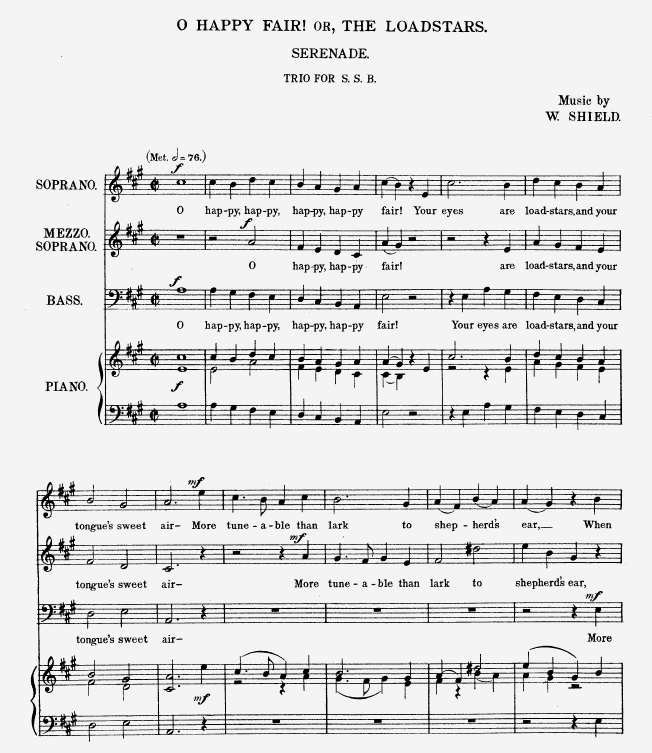
The vocal music to Shakespeare's plays: The merchant of Venice (London: Samuel French, 1922), 20-24
http://hdl.handle.net/1802/16221 (DIGITISED)
11 SOLO For violin with violoncello accompaniment . . . Arcangelo CORELLI (1653-1713)
PERFORMERS: John Edwards (violin); George Sippe (violoncello)
FROM CORELLI'S OPUS 5; SPECIFIC WORK UNIDENTIFIABLE; probably from a reprint from the plates of John Walsh's original English edition; or from Joseph Dale's or Muzio Clementi's "new editions", c.1800-20s
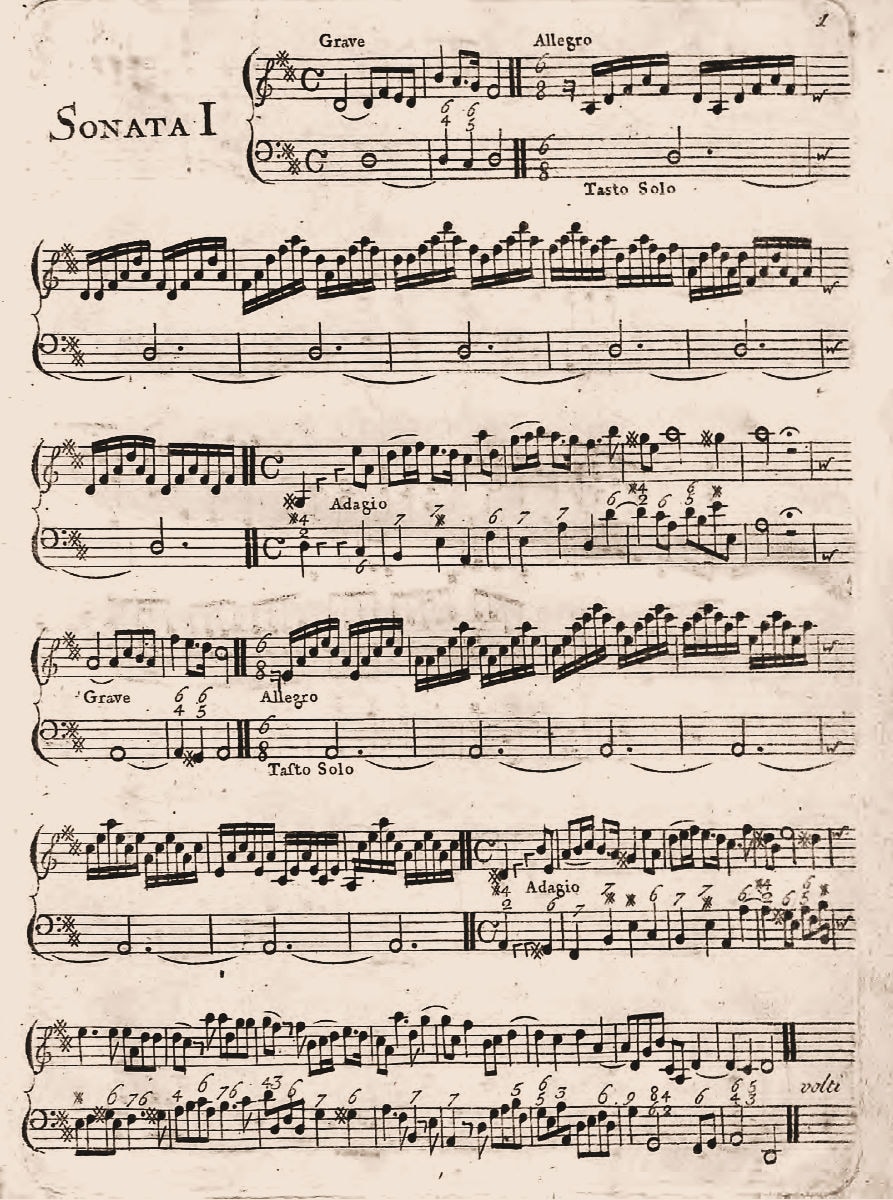
Twelve solos for the violin with a thorough bass for the harpsichord or violoncello . . . opera quinta . . . printed from a curious edition published at Rome by the author [from Walsh's plates] (London: H. Wright, [1795]) (exemplar, British Library, image above, opening of Sonata 1)
https://books.google.com.au/books?id=DiJ7dCMs3P0C (DIGITISED)
Dale's new edition of Corelli's XII solos, for a violin, with a thorough bass for the organ, harpsichord or violoncello (London: Printed and sold by Joseph Dale, [1805]) (exemplar, British Library)
https://books.google.com.au/books?id=_1iK_El3CZYC (DIGITISED)
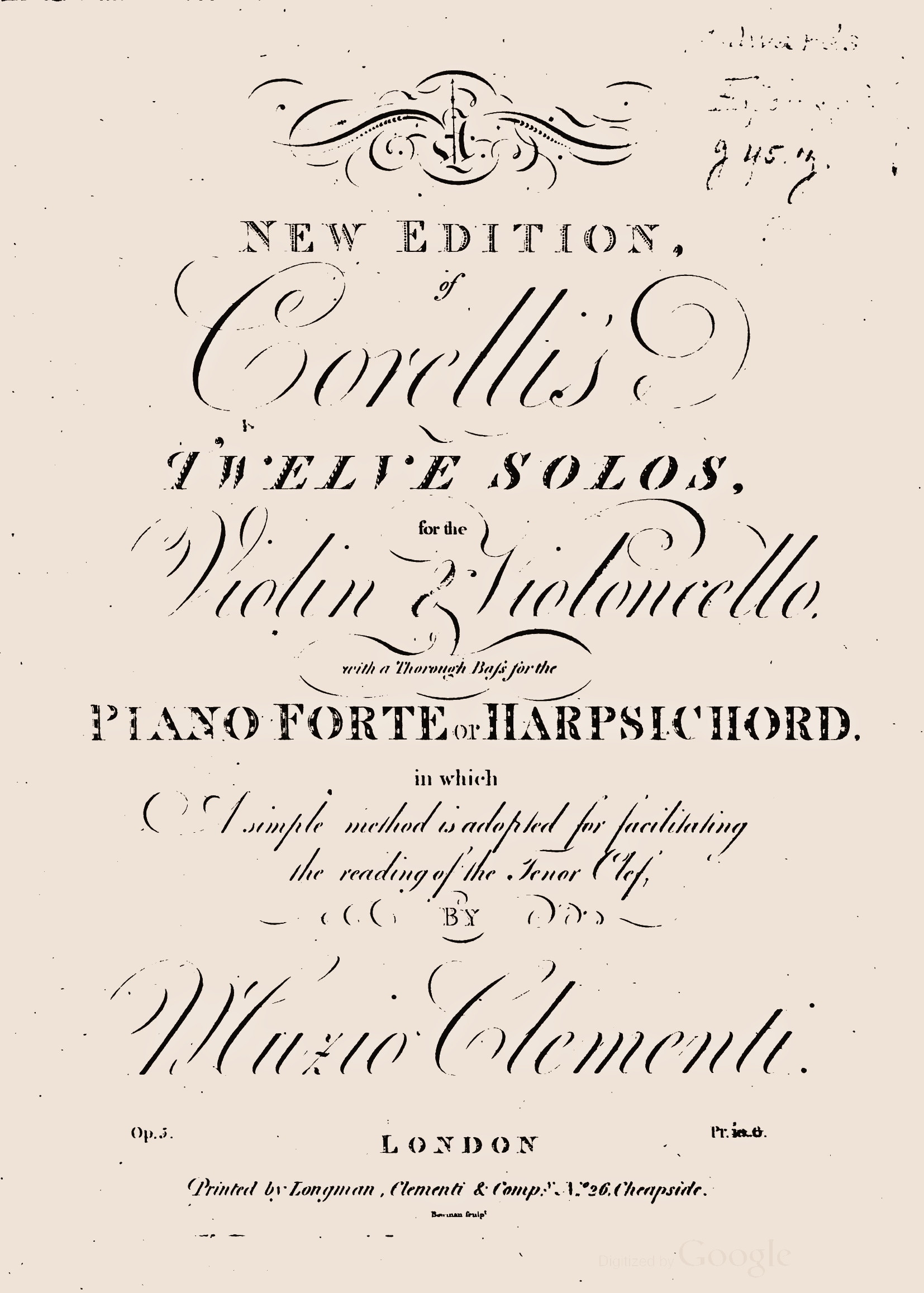
A new edition of Corelli's twelve solos for the violin & violoncello with a throrough bass for the piano forte or harpsichord . . . by Muzio Clementi, op. 5 (London: Printed by Longman, Clementi, and Company, [1799]) (exemplar, British Library)
https://books.google.com.au/books?id=-sKoAT5GYp0C (DIGITISED)
A new edition of Corelli's twelve solos for the violin & violoncello with a throrough bass for the piano forte or harpsichord . . . by Muzio Clementi, op. 5 (London: R. Cocks, [c.1835]) (exemplar, Munich, Bayserische StaatsBibliotek digital; copy originally belonging to the marquis of Kildare)
http://reader.digitale-sammlungen.de/de/fs1/object/display/bsb11152786_00005.html (DIGITISED)
https://books.google.com.au/books?id=4jthAAAAcAAJ (DIGITISED)
http://imslp.org/wiki/Special:ReverseLookup/395395 (DIGITISED)
12 GLEE When Sappho tun'd . . . John DANBY (1757-1798)
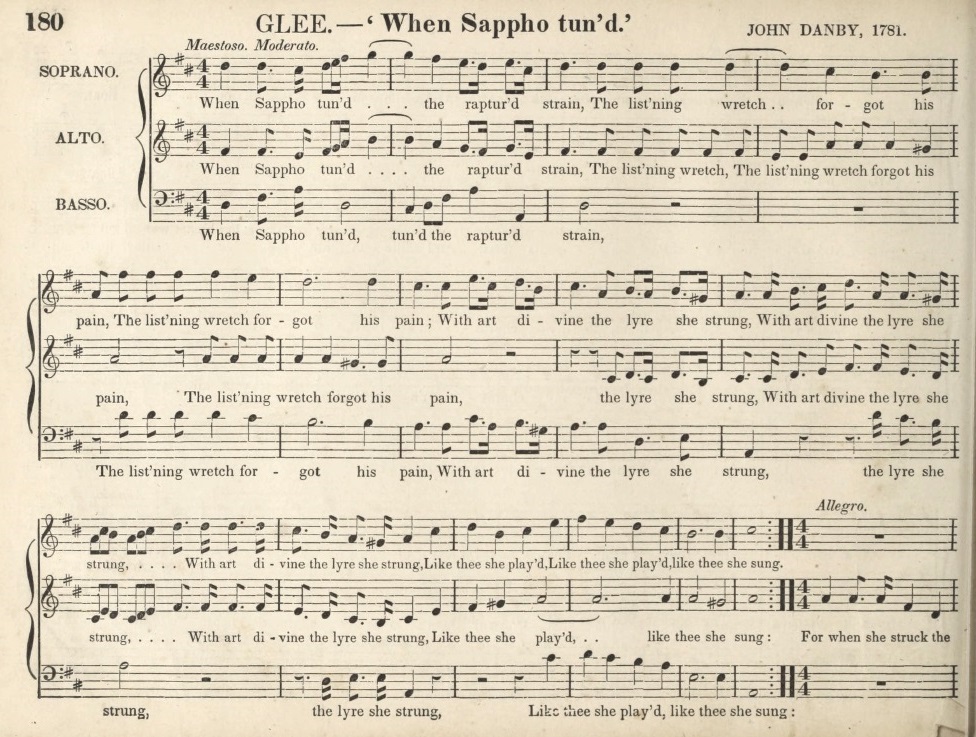
Lowell Mason and George J. Webb (eds), The Boston glee book: consisting of an extensive collection of glees, madrigals, and rounds, selected from the works of the most admired composers (Boston: Oliver Ditson, 1838), 180-82
https://archive.org/stream/bostongleebookco00maso#page/180/mode/2up
13 COMIC SONG The quack doctor
14 OVERTURE La chasse . . . FLEURY
WORK UNIDENTIFIED" ? by Charles FLEURY
Performers
James Blanch (vocalist)
Joshua Frey Josephson (flute)
John Edwards (violin, leader, bass vocalist)
Thomas Kavanagh (vocalist, composer)
Barnett Levey (vocalist)
Mr. Paul / Mr. Paul jun. (vocalist); strictly Mr. Paul junior, or simply Mr. Paul in the context of the concerts, was George Paul, the elder son, and the younger, to distinguish him from his father, John Paul junior; however, both were active members, and it is not always clear which was which
George Sippe (flute, violoncello, pianoforte)
[Members of the Band of the 3rd Regiment and the Band of the 57th Regiment]
Managers
Augustus Earle (steward, artist)
Mr. Hayes (steward)
John Paul junior (steward, merchant)
Joseph Underwood (steward, merchant)
"THE AMATEUR CONCERT", The Monitor (21 July 1826), 5
http://nla.gov.au/nla.news-article31757663
ON Wednesday Evening about four hundred persons of both sexes assembled at the public School Room in Castlereagh-street, to listen to the musical selections of our Amateur performers of our new monthly Concert. Among the company we noticed the Lieutenant Governor, the Sheriff, the Clerk of the Council, the Clerk of the Peace, Dr. Townson, a number of Magistrates, Advocates, Military Officers, Civil Officers, principal Merchants, &c. &c. &c. All this denotes in unequivocal language the growing importance of this admirable public recreation. Admirable in itself as a Concert; and deserving of the special support and eulogium of every patriot; because by its means, the wall of partition has been broken down, which rendered our community so divided and so unhappy. We must say, we think the Gentlemen who have countenanced the Concerts deserve well of the country. It proves their philanthropy as well as their patriotism. We are quite serious when we say, that we know no public service rendered by any individuals in the Colony since its foundation more valuable, looking to futurity, than that which they have rendered New South Wales. We do full justice to our highly respected Lieutenant Governor in this respect - he was ever condescending and kind to the people. His consistency is fully maintained. He has thrown the weight of high civil and military rank into the scale of patriotism and public harmony - supercilious faction has kicked the beam-by first ascertaining the strength of the liberales of the Colony, His Honour has been judicious in timing his distinguished patronage - Kings and Governors, as the dignified servants of the people, are to be venerated as representing the people's power and dignity in their single persons - true greatness of mind knows well how to exercise humility in their presence, as much as to resist the oppression and misrule of underlings in office, unsanctioned as it has ever been in this Colony by the connivance or approbation of the Government.
There is a small gallery or elevation in the Court-room, where the most distinguished part of the company during the first two Concerts took their seats. It was to-night abandoned. Even His Honour the Lieutenant Governor sat indiscriminately amongst the company. We, however, as friends of English aristocracy, consider that at a public place of amusement, the highest Officers in the State ought to have distinguished places set apart for themselves and families - we hope American republicanism will never be introduced here-while we detest all oligarchal feelings (because they are unconstitutional assumptions) we are friends to Kings and a Nobility. They are associated with the warmest feelings of our hearts. And to those to whom honour is due, we are the first to insist on its being paid. Real independence of mind is consistent with real humility-they are in fact always closely allied. Haughtiness and servility are also allied. He that carries his honours meekly, will generally be found the first to resist tyranny. The most zealous opponents of oppression, are the most humble and submissive to legitimate authority. This the late and present Governments were and are well aware of, and duly appreciate the benefit of the Press of this Colony, the best safe-guard of dignified character, and the surest and most effectual vindication of public men, when their integrity is undermined by faction and intrigue.
WE must now give our readers up the country, some account of the performances. The "Bill of the Play," exhibited the following selections.
PART FIRST.
OVERTURE Alla Turca, - Rombergh.
GLEE Hark Apollo Strikes the Lyre, Bishop
SONG The Trumpet sounds Australia's fame - Kavannah
DUETTO Flutes, - Rossini
COMIC SONG
RECITATIVE & AIR From the Wood Demon, - Hook
OVERTURE Figaro - Mozart
PART SECOND.
OVERTURE - Fleury
SONG Dulce Domum, - Braham
GLEE The Loardstars - Shield
SOLO Violin, Violoncello, acc. - Correlli
GLEE When Sappho tun'd, - Danby
COMIC SONG
FINAL OVERTURE La Chase - Fleury
Directors for the Evening.
Mr. Earle. Mr. J. Paul, jun.
Mr. Jos. Underwood. Mr. Hayes.
The Bravura song, "The Trumpet Sounds Australia's Fame," does credit to the composer, Mr. Kavannagh; and which, on account of his residence in the colony, attracted attention. The music is not well supported by the poetry. The latter is bad, as well in sentiment as in harmony of numbers. Mr. Kavennagh ought, in justice to his composition, to procure verses of a higher cast. The loyalty of our colonial poet-laureat would, we think, induce him to compose something worthy of becoming the national song of this advancing colony. The overture, "Alla Turca," we had not the pleasure of hearing, but we understand that it gave great satisfaction. The glee of "Hark Apollo strikes the Lyre," was also well received. The duetto, on flutes, by Mr. Sippe and Master Josephson, was executed in good style. The tones were excellent in many of the transitions. But we thought the piece selected was more calculated for the display of professional execution, than for pleasing the audience. (We have the same remarks to make on the solo by Messrs. Edwards and Sippe, on the Violin and Violencello.) "Hark in the Woodlands," and such plain pieces delight the ear infinitely more than such pieces as Rossini's. Pleyel's flute music, however, abounds in exquisite touches, though of the overture cast.
The comic song of Mr. Paul, was sung by that gentleman with great ease of manner, and proved what he could do with a song really humourous. Comic songs are of two kinds. One, where combinations of words, vulgar and grotesque, are put together to make a chattering kind of melody, without sentiment or music: and the other, where ludicrous incidents belonging to low life, and the eccentricities of unusual characters are brought into view, coupled with a good strain of merry melody. Of the first description was Mr. Paul's song - of the last, was Mr. B. Levy's. Mr. Paul's was encored because of the ease and grace with which he delivered it - Mr. Levy's, for the real humour of the song itself, managed as it was by capital ventriloquist mimicry. The facts produced by the latter song were from real life. It was a piece of history of low life, full of grotesque images and combinations. As a description of vulgar life, clothed in rhyme and music, such compositions have certainly a tendency to make men merry. As moralists, however, we consider it an injudicious employment of time. At all events, we trust nothing bordering on the profane, or on libertinism, but that real humour bottomed on innocent facts, will continue to distinguish the comic songs.
The recitative and air, merely proved that Mr. Levy has better vocal powers than we had imagined, but we condemn this part of the selection. Without other aid, the audience could not possibly understand the scope of the piece. The reiteration of "one o'clock," too, (the words being very unmelodious,) had an unpleasant, not to say ludicrous effect: for the bon vivants of the company, who were too distant to ascertain what it was all about, conceived that one o'clock was a much better time for lunch than for murder - if the author had talked of "midnight," we might have better understood his drift. "Dulce Domum," by Mr. Blanch, was deservedly enchored. The sweet effect of this song, demonstrated for the ten thousandth time how much superior simple melody is to mere execution. Mr. Blanch's voice is not strong, but truly mellifluous. His simple but yet tasteful style of singing, was exceedingly adapted to the simple sentiments of this delightful song itself - this vocal performance was the best of the evening, attracted most applause, and created more general pleasure than any other. The subject and manner must always delight all ranks and all ages.
Mr. Clarke was not present in the Orchestra - we consider the latter gentleman, with Mr. Blanch, and Mr. Edwards, able to execute every thing required by an Australian audience. Kavenagh produces some good notes-but his voice is not uniform - and music has that kind of sensation, that it will not bear a temporary failure. "The Loadstars" was a mixture of good and bad harmony. At times it went well, in other parts the reverse, the more excellent the one part, the more repulsive of course were the discords. We think there had not been sufficient practice and study of the parts by the Performers of this song, as well as of the glee, "When Sappho tun'd." - The Overture from Fleury, was in our opinion very good. It had character - and in this respect it was opposed to the Duet on flutes, and the solo by Messrs Edwards and Sippe, which had no character, and otherwise were without sweetness. The finale Overture, "La Chasse," was equally good with that from Fleury. We have always been of opinion, that the French horn is the finest of instruments when well played. It seems to us to unite the strength of the trumpet and bassoon - the full sweeping strength of the base viol - and the mellow softness of the flute. The two French horns gave great fulness to the chorus's. In listening to such Overtures the imagination feels a capability of conceiving beautiful associations, whereas in the flute duet, and the violin solo, we forgot the music and contemplated the company. We were extremely deficient last time, in not noticing the very superior performances of Mr. Sippe. This gentleman handles almost every instrument - his favourite we believe is the violinicello, and we must acknowledge, that the concert would fail, but for the able assistance which this important instrument renders to the orchestra.
The decorations were greatly improved by the filling up of the three windows at the head of the room, with drawings by Mr. Earle, representing the statues, in niches, of Apollo, Minerva, and Melpomene-the figures were commanding, and well executed. Between the statues were respectively placed, the Arms of the United Kingdom, and of these Colonies. We much approve of these Heraldic ornaments, but we would recommend them to be placed to the right and left over the first windows - they did not appear to us so good a relief to the statues as the plain wall would have been. - It struck us that the managers should have an attendant in waiting, to regulate the lamps. About half the brilliancy only they were capable of producing, was enjoyed by the company. The light was a great deal too sombre. Brilliant lights make people vivacious, as well as delight the eye. We were pleased to see so many young folks - a concert is a proper source of amusement for the young. The young people of this country required some public polish of this kind. Music elevates the mind, and at all events, disposes it to conceive ideas of a noble and virtuous nature. It is opposed to (i. e. if rightly conducted), to meanness, envy, malice, and avarice. If it produce not the opposite virtues, the fault lies in the parents, not in the music.
As there are now about 150 subscribers, we recommend that after paying the necessary expences of the institution, the surplus be retained in hand to be increased by the amount of a Benefit for Messrs. Edwards, Sippe, and Earle, who have united their exertions and talents to please the public, gratis. On the Benefit night, all comers to pay, Ladies as well as Gentlemen. The gentlemen just named, have given away that which they live by. And the Public ought to feel as they would do if the merchant had given them his goods for nothing, (the lamps for instance,) or the physician his attendance gratis, or the counsel had returned them his fees. We hope, therefore, that men of merit will not be suffered to lavish their generosity on the public, while the latter permit their modesty to languish in obscurity, without means to support their rank as gentlemen, and men of science. That be far from Australia!
ONE word more. - A little well studied, and well practised, is better than a great deal loosely got up. For first, between the pieces the Gentleman had no time to take breath and eat an orange, or refresh their fatigues at the lobby; and the Ladies had no time to look at each others' dresses, and chat with the gallant knights of this very ancient and chivalrous community. Even politicians and literati - doctors of Divinity, Law, and Physic, (all of whom were present and full of fire,) could not well commence their premises and draw their first conclusion, before the instruments, gave "discordant note of preparation." Half the pleasure of a Concert, is chatting with one's friends, and viewing strange faces, particularly those of the softer sex, whose chaste smiles have ever had a civilizing effect on the rough mind of man. Therefore instead of 14 pieces, we recommend in future the complement to be 8, or at most 10. Two Overtures, two Duetts, (instrumental,) five Songs and Glees, and one Comic Song for the million, would be abundance to occupy from 7 to 10. The performance was begun and ended, an hour too late on Wednesday. Eleven o'Clock is too late for families.
ASSOCIATIONS: "our colonial poet-laureat" = Michael Massey Robinson (public servant, poet); Augustus Earle (scenic artist, steward)
"THE CONCERT", The Australian (22 July 1826), 3
http://nla.gov.au/nla.news-article37073176
The company assembled at the Concert-room, on Wednesday evening, was numerous and highly respectable - there could not, at the lowest computation, have been, fewer than two-hundred and fifty persons present - about one third of these, the ladies composed. Care had been taken since the preceding - concert to improve and preserve - as much of the sound as the deficiencies of the room, at least, in respect of its adaptation to the purposes of a concert-room would admit. To effect this desirable end, the eminent talents of Mr. Earle, were very happily employed. At the last concert it was found, that the niches of the three windows behind the orchestra, as well as those at each side of the room absorbed a large portion of sound. It was therefore highly desirable and essential to remedy this defect. Mr. Earle hit upon a happy expedient, and by the aid of his talents and experience as an artist, fully succeeded. Those mishievious vacancies were condemned to be blocked up in a temporary manner. Those behind the orchestra, by the stately forms of the mythological patron and patronesses of poetry, music, and the liberal arts - those at one side, a sufficiency of blue gurrah, flushed even with the wall, and extending from the top to the bottom of each windowed nich, it was thought, would assist retaining the "echo of sweet sounds" within proper limits.
From a quarter past seven, to some minutes before eight, the company continued successively, pouring in. A director stationed, at the head of the stairs, received each party's ticket of admission. another ushered them into the concert-room, a third led the ladies to the entrance of a dressing or retiring room - from whence, as they re-issued, a fourth, introduced each one to, her seat. The Lieutenant Governor honored the company with his presence - the courteous manners and generous feelings of this gentleman, reflect credit on his taste and liberality. The efficient assistance rendered to the concert thro' his agency, by several of the military musicians has contributed in no slight degree towards their progressing success.
Several Military and a number of Civil Officers, amongst whom were the. Sheriff, and Clerk of the' Council, were also present. The lights were disposed in much the same manner as on the former evening - three branches of Grecian lamps, pending from brass chains, in a right line along the centre of the ceiling, besides lesser lights, dispersed in other directions. The majestic form of Melpomene, as the muse of lyrical poetry, met the eye on first entering at the side door of the Concert-room. Her stately and perfectly designed figure, appeared to start from the canvas - she stood uprear'd on a pedestal; a wreath of laurel hung from between the fingers of her right hand - the other sustained a trumpet. This painting occupied the left windowed niche - it reached from about two feet below the ceiling to the floor of the orchestra. Melpomene is usually represented as the tragic muse; - as the patroness of lyric poetry. Horace has addressed to her one of his most admired odes- it appears in the third ode of the fourth book. The Royal Arms, with lion rampant, and the much doubted unicorn, divided Melpomene from Mr. President Apollo, whose classically designed person occupied the centre. In delineating the Royal Arms, the skilful Artist had dipped his pencil in the most vivid colours - the star and garter with the surmounting crown, and circling motto, appeared emblazoned with heraldic accuracy. - Apollo resting his lyre on the staff of AEsculapius, round which a healing serpent wound itself, stood next in classic dignity, on his pedestal of Parian marble. - A wreath of his own laurel encircled the head of this grand professor and inventor of medicine, music, poetry, and eloquence. The so much admired fascial angle in the contour and turn of the Belvedere Apollo's head, Mr. Earle imparted to his figure most happily. The real or assumed arms of Australia, appeared next; as if upborne by wisdom and the liberal arts - Apollo on the left side, Minerva on the right - A Kangaroo and Emu appeared to sustain the rising sun of Australia, which darting its rays eliptically up ward, whilst yet half sunk beneath the blue expanse of ocean, gave. a promise of future brilliancy.
Hope, reclining on her anchor, with a benignant smile, seemed, to rise on the sunbeams. She threw a halo of glowing rays around her enlivening figure, and recalled to the mind those beautiful lines in Campbell's pleasures of Hope;
"Eternal Hope! when yonder spheres sublime!
Periled their first notes, to sound the march of time,
Thy joyous youth began - but not to fade -
'When all the sister planets have decayed;
. When rapt in fire the realms of ether glow,
And Heaven's last thunder shakes the world below.
Thou, undismayed, shalt o'er the ruins smile,
And light, thy torch at nature's funeral pile!"
Beneath the rising sun was the following appropriate motto, "E parvis magna" (from small beginnings, great results proceed.) The blue-eyed virgin Minerva ranked next as the goddess of wisdom - her towering head sustained a helmet - one hand was armed with the spear - a shield, with the grisly head of the dying Medusa, protected the other. Those paintings, if the lights had been properly concentrated towards them would have had a just effect when viewed from any particular part of the room as it was, distance in place of improving, rather detracted from their appearance. Experience will, however, serve to correct this defect, and obtain for the Artist that share of admiration, to which his talents so justly entitle him.
Alla Turca, an overture by Rombergh, the concert commenced, with - it was a long but pleasingly varied piece. A glee, "Hark Apollo strikes the lyre," a song, the music of which was composed by Mr. Kavannagh, and a duet, between two flutes, followed. A very young gentleman, Master Josephson, a pupil of Mr. Sippe, took a part, in the duet - he ran over the rapid passages with admirable facility. The duet was more difficult than pleasing. An amateur now came forward, and repeated, with great natural humour, in a comic-song, the pleasures being possessed of a scolding wife and squalling brats affords! He was rapturously encored. He was well accompanied by another gentleman on the piano-forte. The same amateur that gave the "Beautiful Boy" with such inimitable humour on the former evening, now, repeated a recitative and air, with good effect. Mr. Blanch sung with infinite sweetness, Dulce Domum - it was universally encored. Mr. Edwards performed a violin solo, with his usual masterly skill and taste. Mr. Sippe accompanied him in an excellent manner on the violoncello. The Quack Doctor, by the same amateur who had on a previous occasion set the audience in a roar, by his vivid representation of the "Beautiful Boy," was now sung with irresistible drollery - on its being encored; the speaking part was in some measure, varied, it went off with great effect. An overture by Fleurey, became the finale to Wednesday evening's concert. Owing to the prevalence of colds and other unlucky causes among the vocalists, the glees were not as well got up as on former occasions. About a quarter before eleven, the company had all deserted the concert-room, and by the light of a full-moon, were wending their way homewards.
* The ancients attributed a healing power to the serpent - how opinions have altered.
ASSOCIATIONS: "Eternal Hope! when yonder spheres sublime . . .", by Thomas Campbell (poet) from The pleasures of hope and other poems
http://google.cat/books?id=alUYAAAAYAAJ&pg=PA52 (DIGITISED)
"SYDNEY AMATEUR CONCERT", The Sydney Gazette and New South Wales Advertiser (22 July 1826), 3
http://nla.gov.au/nla.news-article2186232
The Subscribers to these really delightful performances, which seem to improve their favourable impression at each succeeding repetition, held a third harmonic Meeting on Wednesday evening last. The same undeviating attention to the comfort and accommodation of the numerous visitors which has hitherto characterized the gentlemen appointed as Directors for the evening, was manifested on this occasion, and the additional convenience of a neatly fitted-up salon, in which refreshments were provided, was no inconsiderable improvement on the previous arrangements. The Concert-room, as on former meetings, was brilliantly illuminated, and at the upper end, immediately at the back of the Orchestra, were displayed the Royal Arms, the Arms of New South Wales, bearing the not inapt motto "e parvis magna," with full length paintings of Apollo, Minerva, and Melpomene. At an early hour, company, no inconsiderable portion of which were ladies, began to arrive, and, shortly after the time appointed for the Concert to begin, the tuning of instruments gave a "note of preparation."
Rombergh's imposing and spirited overture, Alla Turca, commenced the performance, followed by a glee for three voices, "Hark! Apollo strikes the Lyre." A new song, "The Trumpet sounds Australia's Fame," the music by Mr. Kavannah, Master of the Buffs' Band, was given with considerable effect by the composer, and drew down great and deserved applause. The martial style of this air, its highly effective accompaniments, and the animating patriotic character of the poetry, imparted considerable satisfaction and delight, and demonstrated the effect which "music, wedded to immortal verse," produces on the soul of feeling and sensibility. The following may serve as a specimen of the poetry.
"Live, live, Australia! Land of future kings;
Land where new wonders each new sun discloses!
Land where the young renown luxuriant springs;
Land where the silent patriot worth reposes!"
A delightful air from the Giovanni of Mozart, arranged as a duet, for two flutes, was performed by Mr. Sippe and his pupil, Master Josephson. Scene from the "Wood Daemon," Mr. B. Levy. This gentleman, who may be truly said to run "through each mode of the lyre," "from grave to gay," also sang a comic song which caused many a personification of "Laughter holding both his sides," and, together with Mr. Paul, jun. who endeavoured, and most successfully, to shew, that
"When a man weds he must make up his mind
To good and bad luck, and mishaps of all kind."
was received with a warmth and heartiness which must have been as gratifying to their feelings, as it was complimentary to their talents. Their friends mustered strong. Mr. Blanch (a first appearance), gave Braham's delightful ballad of Dulce Domum, in a manner which evinced, in his conception and execution, a style of uncommon purity and elegance, and manifested unquestionable pretensions to vocal excellence. A solo on the violin, from Corelli, by Mr. Edwards, with a violoncello accompaniment by Mr. Sippe, was much applauded. Mr. Edwards ranks high as a performer on the violin. He possesses a brilliancy of touch with a refined expression, and the perfect ease with which be executed the most rapid passages, created a general sensation of admiration. Several glees were sung in the course of the evening, and Fleury's overture, La Chasse, was performed as a finale a little before eleven o'clock.
Taking every circumstance into consideration, it must be allowed, that the Sydney Amateur Concerts, present a considerable degree of excellence both vocal and instrumental, and their continued success cannot fail to be a desideratum with the inhabitants of Sydney, who, notwithstanding so small a beginning, may yet consider them as the germ of an Australian School of Music.
"E PARVIS MAGNA."
"LINES. OCCASIONED BY HEARING "HOME, SWEET HOME," SUNG BY A LADY", The Australian (26 July 1826), 3
http://nla.gov.au/nla.news-article37071297
LINES. OCCASIONED BY HEARING "HOME, SWEET HOME," SUNG BY A LADY.
'Twas twilight's hour, I'd felt it's sad controul,
When o'er my ear the sweetest music stole! -
It was a strain familiar, yet so dear,
I stay'd my trembling breath to bring it near; -
It was an air so ravishingly sweet,
It made my heart bound heavy from it's seat:
Fond memory's joys, that long had lingering slept,
Reviv'd within my breast-I sigh'd, I wept:
It's subject was so dear and lov'd a scene,
That "Home! Sweet Home!" appear'd what it had been
When Friends the dearest sweetly linger'd there,
Whose kindness t'was my happy lot to share;
And they are gone, and time can ne'er erase
My hopeless grief nor ought such loss replace.
Oh! fond remembrance wherefore dost thou dwell
On what I lost, what still I love so well?
Ah! sure that strain was the melodious voice
Of other days that made my heart rejoice -
For worlds, I would not then one word have spoken -
For worlds, I would not such a spell have broken;
It rais'd so sad and yet so sweet a grief,
As would have hated and defied relief;
The sombre quiet of the stilly hour
When music hath a more than magic pow'r,
The deep solemnity-that reign'd around
Whilst echo'd back, each vibratory sound
And evening shadows, could not then dispense
Those ling'ring strains that bore my spirit thence,
To those abodes of bliss, those realms of peace,
That "Home" alone, where earthly sorrows cease.
ASSOCIATIONS: "A lady" = Tempest Margaret Paul
[Editorial], The Sydney Gazette and New South Wales Advertiser (26 July 1826), 3
http://nla.gov.au/nla.news-article2186245
The dealer in ethics, from fish-scales, must and will criticise music and poetry, because he believes himself to be a capital judge of both. He praises the music of the song called, "The Trumpet sounds Australia's Fame," but condemns the words. He says the piece is "bad, as well in sentiment as in harmony of numbers," and thereby proves that he knows as much of poetry as a brick-bat does. But the ethical fishmonger has abundance of affectation, egotism, and impudence. He pretends to criticise music that was not sung at the Concert, by declaring that "When Sappho tuned," was not well studied, though not a soul heard this piece but himself; however, this is but a sample of the wonderful blunders and extravagancies which he commits. We suppose he slung a basket of oranges on his arm when he went to the Concert, for he bitterly complains that the gentleman, (himself, we suppose) had no time to eat an orange; then, by way of making people believe that his taste for music is of the most refined kind, he says that "one comic song out of a million would be abundance to occupy from 7 to 10 o'clock." Now, unless the Monitor has invented a musical steam-engine, we cannot understand how the deuce a million songs are to be gone through in three hours. But we would seriously recommend this dealer in fish and fudge, since he is an enemy to mirth, to stow himself and his orange basket away into some corner next Concert evening, as he is no judge either of music or poetry. As we happen to have a copy of the song which he says is "bad in sentiment and in harmony of numbers," we lay it before our Readers with pleasure, in order to prove the ignorance of this writer on fish scales:
The trumpet sounds Australia's fame,
Lo! Echo, from her silent caverns bounding,
Catches and boldly spreads the joyous theme,
Her thousand shouts thro' thousand worlds resounding.
Live, live, Australia! land of future kings!
Land where new wonders each new sun discloses!
Land where the young renown luxuriant springs!
Land where the silent patriot worth reposes!
Bid, bid the trumpet yet renew the sound!
Once more awake the echo's loudest pealing!
Proclaim our isle, while nations sink around,
Securely on to wealth and greatness stealing!
Then live, Australia! matron young and mild!
Rear still bright Mercy's banner high unfurled!
Pardon and Peace for Britain's fallen Child!
Refuge for all th'oppressed of all the world!
ASSOCIATIONS: Robert Howe (editor, Gazette); the editor of the Monitor, Edward Smith Hall's objection to the work of the anonymous poet may well have been to the first line, which, inconsistent with the rest, is of only 8 syllables, rather than 10; alas, Thomas Kavanagh's music for the words has not survived.
"AUSTRALASIAN POLITICS", The Sydney Gazette and New South Wales Advertiser (26 July 1826), 2
http://nla.gov.au/nla.news-article2186247
. . . Though much has already been paid, in reference to the falsehoods and misrepresentations that one of our contemporaries [The Monitor] continues to set forth, yet we feel it our duty, from what is passing in the public mind, at once strenuously to counteract the serious mischief that threatens our society. He sees no harm in making the most desperate attacks on Acts of Council, Councillors, Magistrates, constabulary, prisoners, and even concerts, and hustles through every subject with as much gravity, dignity, valour, ethics, and political economy, as a full plumed turkey-cock, when every feather in his tail is erect as the prickles on the fretful porcupine . . .
[Editorial], The Monitor (28 July 1826), 8
http://nla.gov.au/nla.news-article31757681
. . . WE shall never honour the Gazette by a regular refutation of its inconsistencies. The public sees plainly, that whether we take occasion to express our loyalty in reviewing the company at a concert - whether we make some peaceable reflections in a private walk - whether we expose impiety and denounce oppression of the widow and the fatherless, exercised under the mask of law, it is all the same. Let us say what we will, we are sure to attract the censure and ridicule of the Sydney Proteus . . .
August
[News], The Australian (2 August 1826), 3
http://nla.gov.au/nla.news-article37073606
Next Wednesday evening, another, concert is intended to take place. From the exertions already in progress, the above evening's entertainment is expected to be more highly diversified and pleasing than any that has preceded it. Several additional amateurs, each bringing with him a proportion of musical talent, have proffered their services - their exertions will be more likely to afford pleasure than those of hired performers; and, besides, give the society a better claim to the designation of Amateur Concert. Female voices have been much wanting. This deficiency is, however, not likely to exist very long. A female, who has but lately arrived in the Colony, and who, if report speak true, possesses capacities of no mean degree, is we understand, engaged to sing on Wednesday evening.
"AUSTRALASIAN POLITICS", The Sydney Gazette and New South Wales Advertiser (2 August 1826), 2
http://nla.gov.au/nla.news-article2186288
. . . He [Hall, of The Monitor] accuses us of publishing absurd and malicious, critiques on our contemporaries, but, as usual, offers not a word in evidence of the justice of his accusation. He declares, that "whether he takes occasion to express his loyally in reviewing the company at a Concert, or whether he makes some peaceable reflections in a private walk, it is all the same. Let him say what he will, he is sure to attract the censure of the Sydney Gazette." So far he is correct, because if Brother Hall, in his drill-serjeant capacity, or in his private walk reflections, writes downright nonsense, and attempts to palm them upon the Public for loyally and ethics, ridicule, agreeably to the laws of attraction, will as invariably point to him as the needle to the pole. If loyally consists in gravely proposing to sing one million songs in three hours, which is only about 5550 in one minute of time, then this Court of Requests' Barrister turns out to be a most loyal subject, and worthy of all acceptation; and if it be highly ethical to write a long dissertation on fish-scales, und to assure his Readers that a bucket screamed most melodiously and with desperation, he is entitled to abundance of merit; but, if all these propositions are obviously downright nonsense, the principle of attraction is just, and the ridicule is applied exactly as it should be . . .
"DOMESTIC INTELLIGENCE", The Monitor (4 August 1826), 2
http://nla.gov.au/nla.news-article31757702
A very full Meeting of the Subscribers to the Amateur Concert took place at Hankinson's Rooms on Monday sen'night, for the purpose of considering the best means of improving this highly popular public amusement. Several people of the first respectability being invited to assist the Orchestra cheerfully promised their best support. This gave universal satisfaction, and put the Subscribers into great spirits. They now confidently look forward to the establishing the Sydney Concerts on a footing equal in talent and respectability to those of the Amateur Concerts of the county towns of England. Weekly rehearsals are now established and Mr. Edwards practises night and day. We expect a great treat both for our eyes and our ears next Concert.
"To the Editor of . . .", The Monitor (4 August 1826), 3
http://nla.gov.au/nla.news-article31757696
THE subject of the Drama has been brought before the public on more than one occasion, through the medium of a contemporary. Eighteen months ago, it was stated that a number of persons were willing to come forward and buy shares to effect the formation of a regular Theatrical establishment, but hitherto all has been mere words. A public spirited individual has, however, by "actions, not words," evinced his anxiety to contribute to the entertainment of his fellow citizens and their families, by affording them a source of rational recreation: but it would be in the highest degree illiberal if we (who expect to share the gratification and amusement which the erection of a Theatre would be likely to produce,) allow one individual to proceed at his own risk and expense, unassisted, and be found backward in contributing our mite towards placing such an establishment on a respectable footing. At the last Concert Meeting the subject was actually proposed, and I can on authority affirm, that several gentlemen have expressed their willingness to become share-holders at 50l. each; and here I would observe, that 100 shares would be an ample supply for its completion. Fifty shares would be immediately engaged; and I am convinced, that the facts need but to be known, to augment that number to the required standard. Many persons might be disposed to assist in such an undertaking, to whom the appropriation of 50l. in cash would be inconvenient, but who might at the same time be enabled to further the object in view by substituting materials for building, &c.; for instance, one might supply a quantity of stone, another timber, painting, machinery, &c. all equally valuable. I set forth these circumstances in order that such a disposition might be brought to a bearing, and to concentrate into one focus, the various wishes of the public on the subject. Unanimity, and a little exertion, have brought the Amateur Concerts to a degree of perfection that could not reasonably have been anticipated, and they are the great essentials towards effecting the desired end. I therefore take this method of inviting the attention of the lovers of the legitimate drama to a systematic channel, whereby their inclinations and various suggestions may be reduced to a practicable plan, at once conducive to rational amusement, blending with it moral instruction, the cultivation of taste, and to the advancement of literature and the fine arts generally. I have the honour to be, Mr. Editor;
Your obedient Servant, DRAMATICUS, George Street, August 1, 1826
CONCERT 4
Wednesday, 9 August 1826
School Room, Old Court House, Castlereagh Street, Sydney
Program
FIRST PART
1 OVERTURE . . . ROMBERG
2 SONG When the rose-bud of summer . . . STEVENSON
PERFORMERS: Harriet Jones (vocalist)
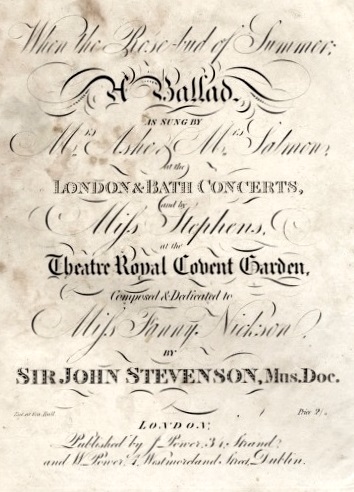
When the rose-bud of summer, a ballad, as sung by Mrs. Ashe & Mrs. Salmon at the London & Bath Concerts, and by Miss Stephens at the Theatre Royal Covent Garden, dedicated to Miss Fanny Nickson, composed by Sir. J. Stevenson (London: Published by J. Power, n.d.)
http://catalogue.nli.ie/Record/vtls000147624 (CATALOGUE RECORD ONLY)
3 GLEE Sailor boy . . . Michael KELLY (1762-1826)
[Words only] Songs, &c. in the romantic drama of Adelmorn, the outlaw . . . the overture and music entirely new composed by Mr. Kelly (London: Printed for J. Bell, 1801), 20
https://books.google.com.au/books?id=5RRXAAAAcAAJ&pg=PA20 (DIGITISED)
Sailor boy, sailor boy, a favorite trio, sung by Mrs. Mountain, Miss De Camp & Mr. Sedgwick in the opera of Adelmorn, at the Theatre Royal Drury Lane, composed by Michael Kelly ([London], n.d.)
http://catalogue.nli.ie/Record/vtls000378172 (CATALOGUE RECORD ONLY)
4 DUETTO (for flutes) Air from Don Giovanni . . . MOZART
PERFORMERS: Joshua Frey Josephson (flute); George Sippe (flutes)

Six favorite airs from the celebrated opera of Don Giovanni arranged as duets for two flutes (London: G. Walker, n.d.)
http://imslp.org/wiki/Don_Giovanni,_K.527_(Mozart,_Wolfgang_Amadeus) (DIGITISED)
http://imslp.org/wiki/Special:ReverseLookup/250963 (DIGITISED Flute 1)
http://imslp.org/wiki/Special:ReverseLookup/250964 (DIGITISED Flute 2)
5 SONG When the trumpet of war . . . ? Benjamin COOKE (1734-1793)
PERFORMERS: John Edwards (bass vocalist)
6 COMIC SONG
PERFORMERS: Mr. Paul [George or John, jun.] or Barnett Levey (vocalist)
7 AIR WITH VARIATIONS, Violin . . . James SANDERSON (1769-1841)
PERFORMERS: John Edwards (violin)
WORK UNIDENTIFIABLE
SECOND PART
8 OVERTURE The deserter . . . Pierre-Alexandre MONSIGNY (1729-1817)
Le déserteur (Paris: Claude Hérissant, [c.1769])
http://www.archive.org/stream/ledserteurdramee00mons#page/n7/mode/2up (DIGITISED)
http://imslp.org/wiki/Le_déserteur_(Monsigny,_Pierre-Alexandre) (DIGITISED)
http://imslp.org/wiki/Special:ReverseLookup/227289 (DIGITISED)

The songs &c. in The deserter, a musical drama as perform'd with universal applause, at the Theatre Royal in Drury Lane composed by Messrs. Monsigny, Philidor, & Dibdin (London: John Johnston ... & Longman, Lukey, & Co., [1773]) (image Boston Public Library @ Internet Archive)
https://archive.org/stream/songscindeserter00dibd#page/n3/mode/2up (DIGITISED)
http://imslp.org/wiki/Special:ReverseLookup/302575 (DIGITISED)
9 GLEE Lightly tread, 'tis hallowed ground . . . "John Scotland", alias of George BERG (c. 1720-1775)
PERFORMERS: Harriet Jones (vocalist); and 2 others (vocalists)
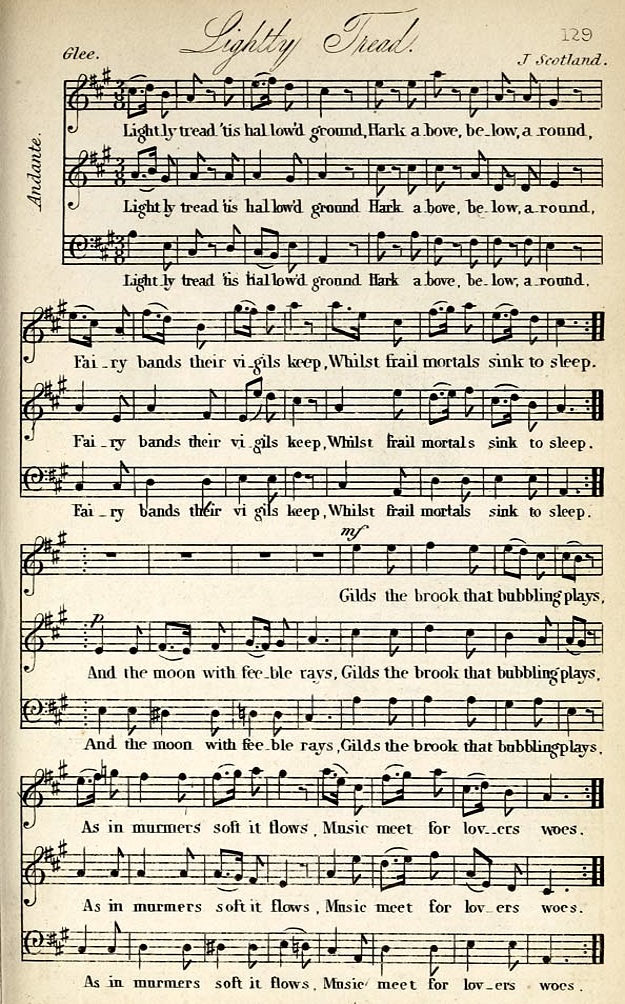
Bingley's select vocalist containing songs, glees, duets, &c. by eminent composers (London: J. Bingley, [c.1842]), 129 (image National Library of Scotland @ Internet Archive)
http://www.archive.org/stream/bingleysselectvo00bing#page/128/mode/2up (DIGITISED)
http://digital.nls.uk/special-collections-of-printed-music/pageturner.cfm?id=87716027 (DIGITISED)
The British minstrel, and musical and literary miscellany . . . volume 3 (Glasgow : William Hamilton, [c.1845]), 168
http://digital.nls.uk/special-collections-of-printed-music/pageturner.cfm?id=91445265 (DIGITISED)
https://archive.org/stream/britishminstrelm00glas#page/168/mode/2up (DIGITISED)
https://archive.org/details/imslp-tread-berg-george (DIGITISED)
10 RECITATIVE & AIR Awful, pleasing being say (from Joshua) . . . George Frederick HANDEL (1685-1759)
PERFORMERS: John Edwards (bass vocalist)
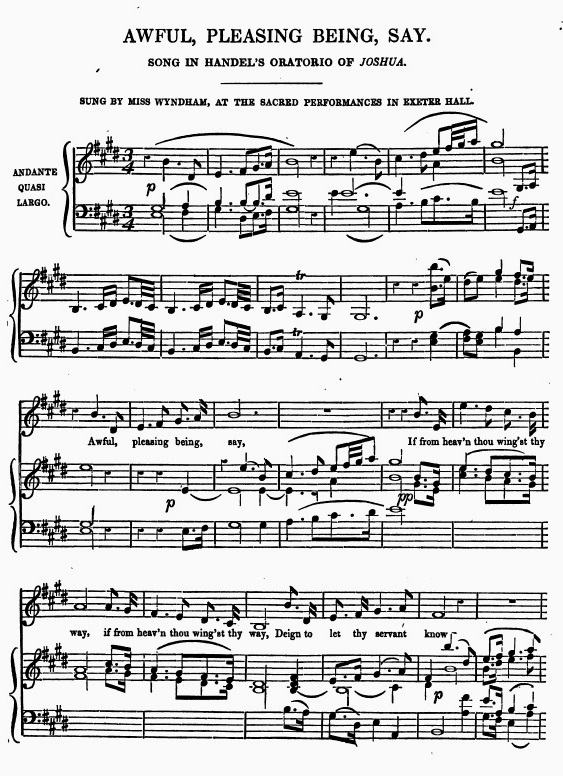
The harmonist . . . volume 1 (London: John Limbird, 1840), 185-87
https://books.google.com.au/books?id=Qy0rAAAAYAAJ&pg=PA185
11 COMIC SONG The Nightingale Club . . . ANON.
PERFORMERS: Mr. Paul [George or John, jun.] or Barnett Levey (vocalist)
[Words only] The vocal magazine 9 (1 September 1815), 71
https://books.google.com.au/books?id=mYkvAAAAYAAJ&pg=PA71
12 DUETTO All's well (Deserted by the waning moon) . . . John BRAHAM
PERFORMERS: Mr. Clarke (vocalist); Barnett Levey (vocalist)
All's well, a favorite duett in the comic opera of the English Fleet composed by Braham (Dublin: Hime, n.d.)
https://trove.nla.gov.au/version/38813521
All's well, a duett composed by Mr. Braham (Philadelphia: A. Bacon, n.d.) (image courtesy of the Lester S. Levy Collection of Sheet Music, The Sheridan Libraries, The Johns Hopkins University)
http://levysheetmusic.mse.jhu.edu/collection/108/025 (DIGITISED)
Performers
Mr. Clarke (tenor vocalist)
John Edwards (violin, bass vocalist)
Harriet Jones (vocalist)
Joshua Frey Josephson (flute)
Barnett Levey (vocalist)
Mr. Paul [George, or John, junr.] (vocalist)
[George Sippe, pianoforte, flute]
[ ? Members of the Bands of the 3rd and 57th Regiments]
"FOURTH CONCERT", The Monitor (11 August 1826), 5
http://nla.gov.au/nla.news-article31757719
FOURTH CONCERT.
About three hundred persons of both sexes, again assembled at the New School Room in Castlereagh-street, on Wednesday evening at half-past seven, to listen to the strains of vocal and instrumental harmony. The company, saving the absence of his Honour the LIEUTENANT GOVERNOR, was equally select and respectable with that which we witnessed at the last meeting. The music consisted of the following selection.
FIRST PART.
OVERTURE - Romberg
SONG When the rose-bud of Summer, Stevenson.
GLEE Sailor Boy, - Kelly.
DUETTO Flutes, - Mozart.
SONG When the trumpet of War, Cooke.
COMIC SONG
AIR, WITH VARIATIONS, Violin, Sanderson.
SECOND PART.
OVERTURE Deserter.
GLEE Lightly tread.
RECIT. & AIR Awful, pleasing Being say, Handel.
SONG The Nightingale Club.
DUETTO All's Well, - Braham.
THE two overtures gave great satisfaction, particularly the first. Perhaps the preference was owing to the ear being more vigorous and sensative, on the opening of a concert. "The Sailor Boy," we had not the pleasure of hearing, but we learn it was well received. - "When the rose-bud of Summer" was sung by Mrs. Jones. This lady has a good voice, sings sweetly and unaffectedly, and her manners are graceful and engaging. The company received her song with unbounded applause, and on loud and reiterated calls, she repeated it with still greater effect. We consider the talents of this lady a very great acquisition, and hope she may be induced to continue to us that unmingled pleasure which we experienced on listening to her elegant performance on Wednesday. "When the Trumpet of War," and "The Recitative and Air" were both sung by Mr. Edwards, with that superior judgment which this gentleman displays in all he undertakes. His lower notes are beautiful. His highest ones are also sweet. If the middle notes were equal in strength and clearness, we should have a rare singer in Mr. E. "Lightly Tread," was sung on an improper key. We think greater attention ought to have been paid in this respect to the part awarded to Mrs. Jones, whose efforts to articulate the higher notes of the gamut were painful to herself, while her voice was done an injustice; being in an ordinary key, a very fine one. "Alls Well" is a song that requires greater powers than Messrs. Clarke and Levey can command. Still, however, they accomplished their arduous task in a very agreeable manner, and the song was received with just applause. Mr. Paul and Mr. Levey executed two comic songs in such good style, as to be received with raptures. In these raptures, however, we could not join. A theatre and a concert are diverse, and we think it scarcely candid to intrench on the character of the latter by pantomine and farce. However the stream is against us and we cannot stem it. We will not, however, be carried down by it, but edge aside into a neutral bay.
The lights were improved as well in position as brilliancy. Too little time is still allowed for conversation. The pieces follow each other too rapidly. The last concert in Europe we attended, was a vocal one in Edinburgh. Two songs, duetts, and glees respectively, were all that were sung, accompanied with the piano. Considerable intervals for conversation accordingly took place, which rendered the entertainment extremely agreeable. - The duet on flutes, elicited some delightful strains from Master Josephson. We think we never heard finer tones than were produced by this young gentleman. The execution was equally good. The "Air with variations on the violin," was performed by Mr. Edwards in the first style, and displayed his professional abilities to great advantage. In so large a room, however, and with so poor an echo, (the fact is, echo does not at all exist,) duets, and solos on instruments, are not expedient. Songs, and glees, and overtures, should be exclusively performed at the Sydney concert.
"THE CONCERT", The Australian (12 August 1826), 3
http://nla.gov.au/nla.news-article37074755
The admirers and promoters, not oven omitting the supporters of this increasingly and generally fascinating diversion, were fully gratified on Wednesday evening. The former enjoyed the pleasure of hearing, and the latter of being heard, and applauded, wherever conspicuous merit called for praise, and of passing unnoticed when some unlucky cause intervened to produce a momentary suspension of harmony, which indeed occurred throughout the entire performance, but very rarely. Some few alterations in, and additions to the decorations of the room were made, from the previous evening, and the entire concert was got through in a very creditable style. About eight o'clock a very few benches remained unoccupied.
"TO CORRESPONDENTS", The Sydney Gazette and New South Wales Advertiser (12 August 1826), 2
http://nla.gov.au/nla.news-article2186348
An Episcopalian, with several other Contributors, will perhaps require little apology for not finding themselves in print, according to our promise, when they are informed that our amusing report of the fourth Concert is omitted - our Police Reports mangled and omitted-our Extracts withdrawn - and some of our Advertisements kept over - all on account of the pressure of other Intelligence that could not possibly be deferred.
[Advertisement], The Australian (16 August 1826), 2
http://nla.gov.au/nla.news-article37074563
TO THE LADIES AND GENTLEMEN OF SYDNEY.
MR. EDWARDS DOES HIMSELF THE honor to acquaint the Ladies and Gentlemen Sydney, &c.,
that, in conformity with the wishes of many of his Friends, his Benefit Concert will take place at the Court-house, Castlereagh-street, on Wednesday evening, the 23rd inst.
Further particulars will be announced previous to the Concert.
Tickets 7s. 6d. each - May be obtained of Messrs. PAUL, B. LEVEY, PITMAN,
ROBERTSON, RAPSEY & Co., George-street, Mr. FOSTER, at Mr. NORTON'S Office, Elizabeth-street; and of Mr. HAYES,
at the Office of "THE AUSTRALIAN," George-street.
[News], The Australian (23 August 1826), 3
http://nla.gov.au/nla.news-article37073626
Mr. Edwards' Benefit Concert takes place this evening. It seems likely to be well supported. The vocal and instrumental pieces intended to be performed possess variety, sweetness, and some have the charm of novelty to recommend them - all of them appear arranged in typographical array in another page. Admirers of the female voice are likely to have their sense of hearing fully gratified, and their feelings of sympathy awakened during this evening's concert, at least such may be premised, from the circumstance of a lady, whose melodious and expressive voice, refined taste, accurate judgment, and extensive acquirements in instrumental music, need but be heard to be acknowledged and admired, having consented to honor the orchestra with her aid. Mrs. Paul is the lady alluded to. The knowledge of her intention runs liberally, and of course it need scarcely be added, gratuitously, to come forward on this occasion, will, no doubt, be a source of attraction to many. Mrs. Jones, whose debut met with such pleasing eclat on Wednesday week, will assist, with Messrs. Sippe, Clark, Levey, Paul, and several other talented amateurs, whom want of confidence or of feelings of emulation have hitherto kept back.
[Advertisement], The Australian (23 August 1826), 2
http://nla.gov.au/nla.news-article37073631
MR. EDWARDS BEGS TO INFORM HIS Friends and the public that his
BENEFIT CONCERT will take place this Evening at the Court-house, Castlereagh-street,
upon which occasion several celebrated Amateurs will kindly favor him with their assistance.
The following vocal and instrumental pieces will be performed.
Part I. Overture - "Lodoiska."
Song - "A Minstrel Once."
Duetto - "The Butterfly."
Glee - "It was a Friar of Orders Grey."
Comic Song.
Song - "No! My Love, No!"
Song - "Home, Sweet Home."
Comic Song.
Part II. Overture - Italiana in Algieri."
Song - "The Soldier Tir'd."
Glee - The Chough and Crow."
Comic Song.
Song - "Had I a Cave."
Finale - "God Save the King."
The concert will commence at 7 o'clock. Tickets, 7s 6d. each, may be obtained of Messrs. Paul, B. Levey, Rapsey and Co. and Pitman, in George-street, Mr. Foster, at Mr. Norton's Office, in Elizabeth-street; and of Mr. Hayes, at the Office of The Australian.
A related performance in which some of the concert personnel, including Edwards, Sippe and some bandsmen, probably participated:
20 August 1826, funeral sermon and anthem, Vital spark of heavenly flame, for the late bishop Reginald Heber, at St. James's Church
[News], The Australian (23 August 1826), 3
http://nla.gov.au/nla.news-article37073626
At noon service in St. James's Church on Sunday, the Archdeacon preached a sermon on the occasion of the death of Dr. Heber, the late Bishop of Calcutta. The venerable gentleman chose his text from the 55th verse, xv. chap. St. Pauls' I. to the Corinthians. - "Oh death, where is thy sting? Oh grave, where is thy victory?" The Governor, several naval, military, and civil officers attended; and, by his Excellency's order, detachments from the 3rd and 57th regiments, with side arms. The bands of both regiments paraded to and from church. Several of the performers assisted in the choir - they performed an appropriate anthem, "Vital spark of heavenly flame," with some effect.
The prisoners who usually, attend divine service at St. James's Church, were conducted to St. Philip's, on account of the auditory who were present at the former.
"DOMESTIC INTELLIGENCE", The Monitor (25 August 1826), 2
http://nla.gov.au/nla.news-article31757778
A funeral sermon was preached at St. James's church by the Archdeacon of the colony, on the death of the Bishop of Calcutta. The troops in garrison, commanded by his Honour the Lieutenant Governor in person, occupied the gallery usually apportioned to the prisoners, who on this occasion were absent. The body of the church presented an assemblage of the chief persons of rank in Sydney and its vicinity. His Excellency the Governor and suite, arrived at the church in his travelling carriage from Parramatta, at a quarter before eleven. The service commencing with some passages from the burial service, was read by the Rev. Mr. Hill; and an impressive discourse from 1 Cor. 15 chap. 55 verse, "O death where is thy sting?" was delivered by the Venerable the Archdeacon, in which he eulogised the deceased Prelate, and expaciated forcibly on the uncertainty of life. Pope's appropriate anthem of "The dying Christian to his soul," was sung at the close of the sermon. The altar and pulpit were hung with black.
ASSOCIATIONS: Richard Hill (officiating clergyman); Thomas Hobbes Scott (archdeacon of NSW); Reginald Heber (d. India, 3 April 1826; Australia was then part of the diocese of Calcutta, and thus Heber was bishop of NSW)
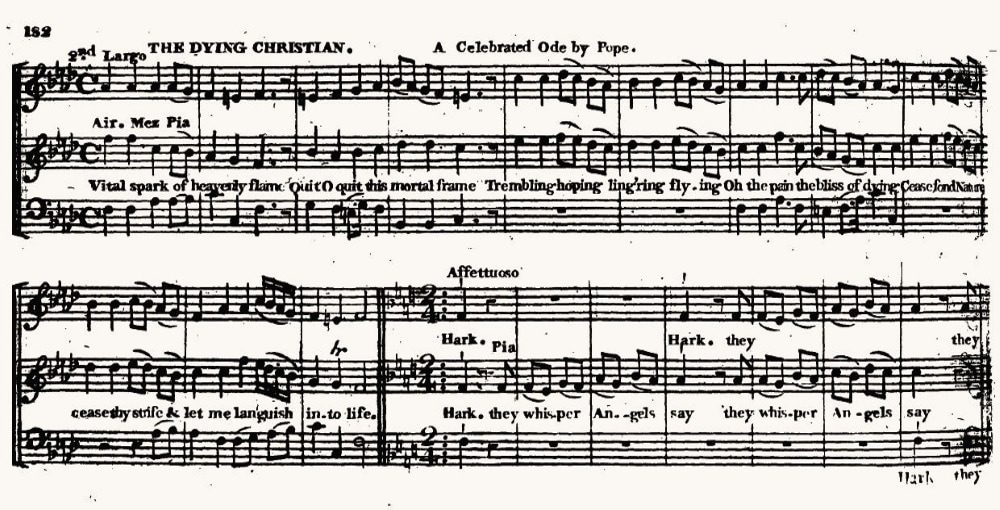
MUSIC: Vital spark of heavenly flame ("The dying Christian to his soul"; "The dying Christian"; "Pope's ode"), music by Edward Harwood (c.1707-1787); words by Alexander Pope (1712).
[As above] A selection of psalm and hymn tunes . . . the whole forming a publication of above two hundred hymn tunes, besides other pieces by John Rippon. A. M. ([London]: Sold by Mr. Rippon, [1790]), no. 182
https://imslp.org/wiki/Special:ReverseLookup/66532 (DIGITISED)
See also the original edition:
A set of hymns and psalm tunes in three and four parts adapted to the use of churches and chapels, composed by Ed. Harwood (London: For the author . . . by Joh. Johnson, ), 36-40
https://books.google.com.au/books?id=7FLahCVn9NsC&pg=PA36 (DIGITISED)
CONCERT 5 (John Edwards's benefit)
Wednesday, 23 August 1826
School Room, Old Court House, Castlereagh Street, Sydney
Program
PART 1
1 OVERTURE Lodoiska . . . Rodolphe KREUTZER
2 SONG A minstrel once . . . ? John BARNETT (1802-1890)
PERFORMERS: John Edwards (vocalist)
3 DUETTO The butterfly . . . John Bernard SALE (1779-1856)
PERFORMERS: John Edwards (bass vocalist); Tempest Margaret Paul (soprano vocalist)

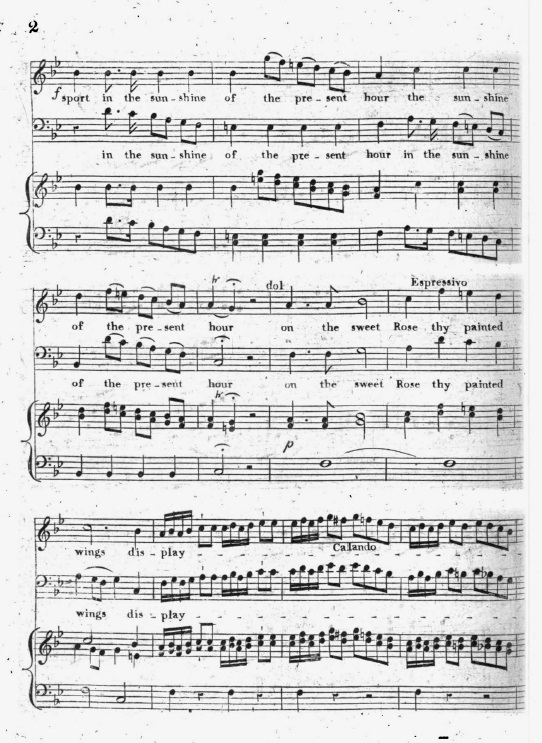
The butterfly, a much admired duett as Sung by Mr. Nield & Mr. Sale junr. at Dr. Smith's Concert, at Richmond Surry (London: L. Lavenu, for the author, n.d.)
http://imslp.org/wiki/Special:ReverseLookup/369948 (DIGITISED)
4 GLEE It was a friar of orders grey . . . William REEVE
PERFORMERS: Mr. Clarke (tenor vocalist); John Edwards (bass vocalist); Harriet Jones (soprano vocalist)
On a melody by William Reeve, the words of the original song are "I am a friar of orders gray / and down the valleys I take my way . . ."; or, of the glee version, "We are three friars of orders gray / and down the valleys we take our way . . ."
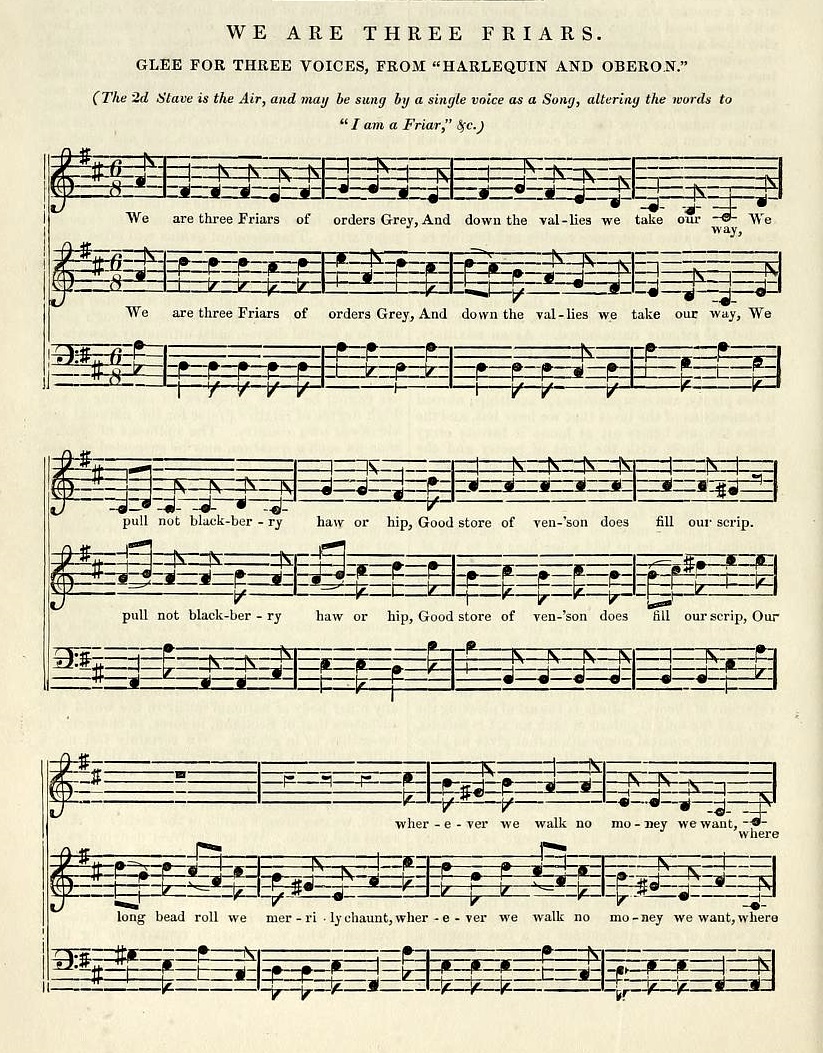
The British minstrel, and musical and literary miscellany . . . vol.1 (Glasgow: William Hamilton, [1845]), 142-44 (image National Library of Scotland @ Internet Archive)
https://archive.org/stream/britishminstrelm00glas#page/n149/mode/2up (DIGITISED)
http://imslp.org/wiki/Special:ReverseLookup/178111 (DIGITISED)
5 COMIC SONG Caleb Quotem (I'm parish clerk and sexton here) . . . William SHIELD
PERFORMERS: Arthur Hill (vocalist)
Caleb Quotem, as sung with the greatest applause by Mr. Twaits, in the comic opera of Wags of Windsor, [by] Shield (New York: J. Hewitt, [n.d.])
https://www.loc.gov/item/2015563188 (DIGITISED)
[Words only] Caleb Quotem, sung in The review, or the wags of Windsor, music by William Shield
https://books.google.com.au/books?id=aSxWAAAAYAAJ&pg=PA29 (DIGITISED)
6 SONG No! my love, no! . . .
PERFORMERS: Harriet Jones (soprano vocalist)
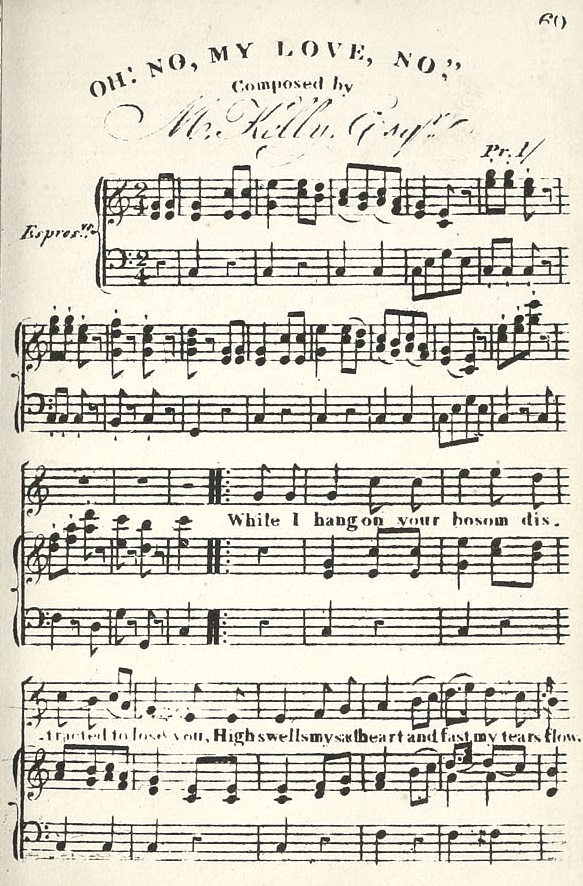
"Oh! No, my love, no, composed by Mr. Kelly, Esqre", in A selection of Scots, English and Irish songs with accompaniments for the piano-forte, from the most eminent composers . . . (Edinburgh: Printed & sold by R. Martin, [c. 1821]), 60-62 (image National Library of Scotland @ Internet Archive)
https://archive.org/stream/selectionofscots00rugg#page/n65/mode/2up (DIGITISED)
http://digital.nls.uk/special-collections-of-printed-music/pageturner.cfm?id=91232695 (DIGITISED)
7 SONG Home, sweet home . . . BISHOP
PERFORMERS: Tempest Margaret Paul (soprano vocalist, pianoforte)
8 COMIC SONG Arthur O'Bradley
PERFORMERS: Mr. Mackie (vocalist)

William Chappell, Popular music of olden times ... volume 2, 604
https://books.google.com.au/books?id=mzhNAAAAcAAJ&pg=PT604 tune (DIGITISED)
[Words only], The roundelay; a selection of comic, martial, naval and sentimental songs (Doncaster: Thomas and Hunsley, [1815]), 70-71
https://books.google.com.au/books?id=vrQDAAAAQAAJ&pg=PA70 words only (DIGITISED)
[Words and commentary only], James Henry Dixon (ed), Ancient poems, ballads and songs of the peasantry of England (London: John W. Parker, 1857), 138-43
https://archive.org/stream/ancientpoemsbal01dixogoog#page/n146/mode/2up (DIGITISED)
https://books.google.com.au/books?id=w53yZursNEAC&pg=PA138 (DIGITISED)
PART 2
9 OVERTURE Italiana in Algieri . . . ROSSINI
10 SONG The soldier tir'd . . . Thomas ARNE
PERFORMERS: Tempest Margaret Paul (soprano vocalist, pianoforte)
11 GLEE The chough and crow (from Guy Mannering) . . . BISHOP
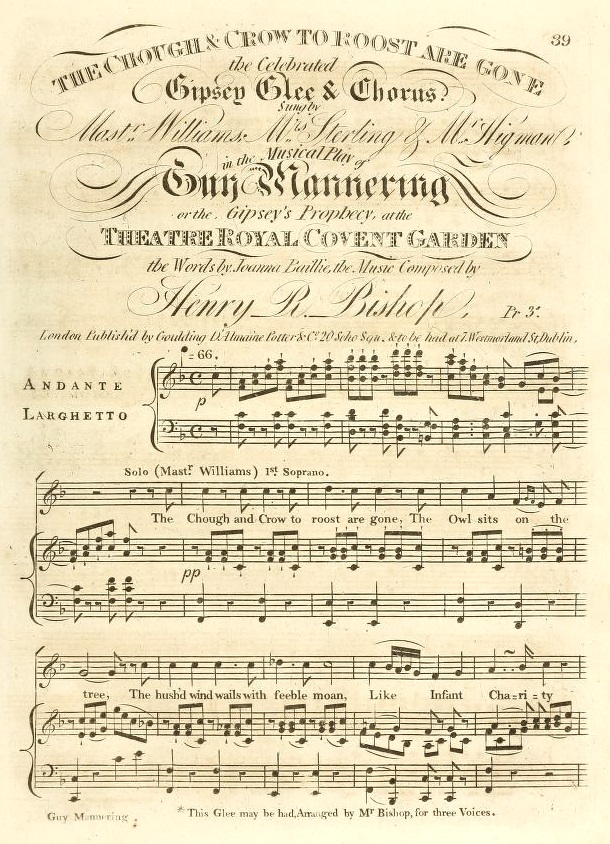
The overture, songs, duetts, glees, and chorusses in the musical play of Guy Mannering composed & arranged . . . by Thos. Attwood and Henry R. Bishop (London: Goulding, D'Almaine, Potter & Co., [1816]), 39-52
https://archive.org/stream/overturesongsdue00bish#page/39/mode/2up (DIGITISED)
12 COMIC SONG The royal visitors
PERFORMERS: Barnett Levey (vocalist)
[Words only], The roundelay; a selection of comic, martial, naval and sentimental songs (Doncaster: Thomas and Hunsley, [1815]), 240-41
https://books.google.com.au/books?id=vrQDAAAAQAAJ&pg=PA240 (DIGITISED)
13 SONG Had I a cave on some wild distant shore . . . (Tune: Robin Adair)
PERFORMERS: Harriet Jones (soprano vocalist)
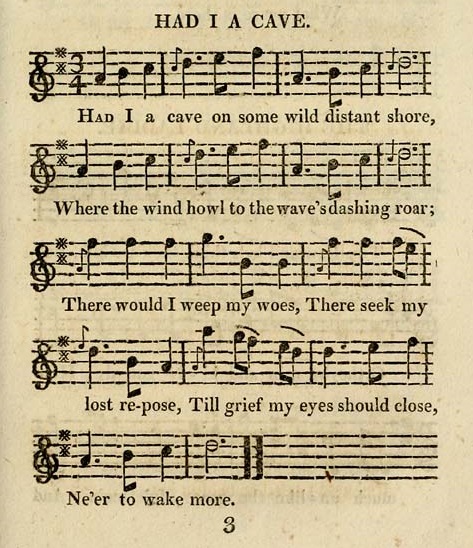
[Melody and words only], The Caledonian musical repository: a choice selection of esteemed Scottish songs adapted for the voice, violin, and German flute (Edinburgh: Oliver & Boyd, 1811), 209-210 (image National Library of Scotland @ Internet Archive)
https://archive.org/stream/croscaledonmusica00edin#page/208/mode/2up (DIGITISED)
https://archive.org/stream/caledonianmusica00edin#page/208/mode/2up (DIGITISED)
http://digital.nls.uk/special-collections-of-printed-music/pageturner.cfm?id=94516348 (DIGITISED)
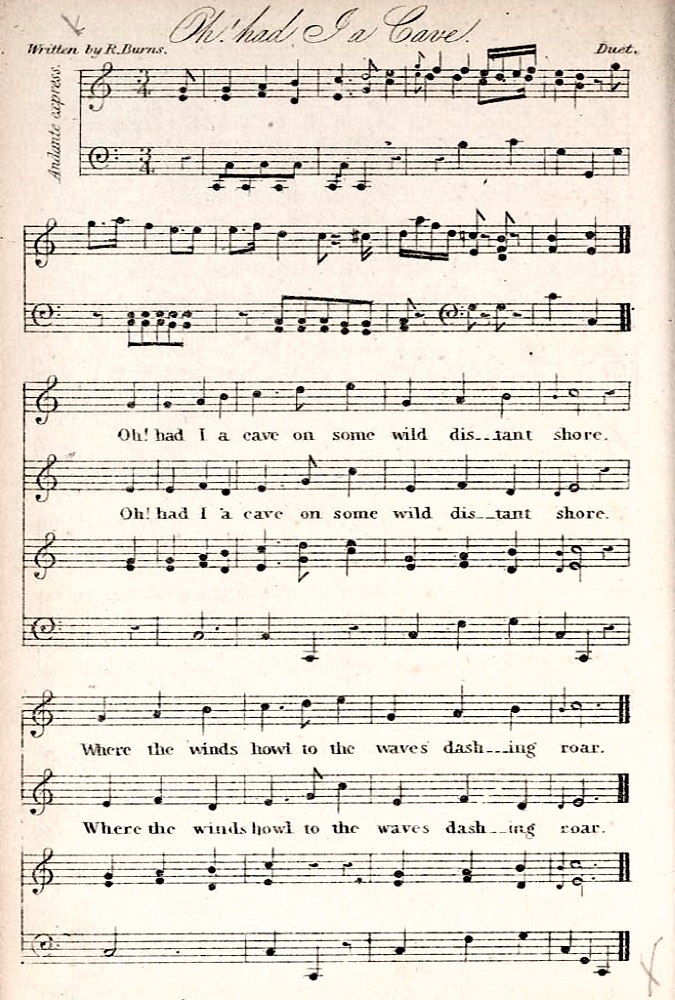
Bingley's select vocalist containing songs, glees, duets, &c. by eminent composers . . . volume 2 (London: J. Bingley, [c.1842]), 24-25 (image National Library of Scotland @ Internet Archive)
http://www.archive.org/stream/bingleysselectvo00bing#page/24/mode/2up (DIGITISED)
http://digital.nls.uk/special-collections-of-printed-music/pageturner.cfm?id=87714767 duet version (DIGITISED)
[Arrangement of the tune, Robin Adair, by William Reeve] Robin Adair, the much admired ballad . . . the symphony & accompaniments composed & arranged for the harp, or piano forte by W. Reeve (London: Button & Whitaker, 1811)
https://archive.org/details/sheet-music-RobinAdair-Braham-London1812 (DIGITISED)
http://imslp.org/wiki/Special:ReverseLookup/425238 (DIGITISED)
[Another edition of the above]
http://levysheetmusic.mse.jhu.edu/collection/111/147 (DIGITISED)
14 COMIC SONG The merry little soldier . . . ? William REEVE
PERFORMERS: Mr. Paul [George or John jun.] (vocalist)
[Words only], The universal songster; or, Museum of mirth . . . vol. 1 (London: John Fairburn, 1825), 109
https://books.google.com.au/books?id=Qis9AAAAYAAJ&pg=PA109 (DIGITISED)
15 FINALE God save the king
Performers
Arthur HILL (vocalist)
Harriet Jones (soprano vocalist)
Mr. Paul [George or John jun.] (vocalist)
Tempest Margaret Paul (vocalist, pianoforte)
"ON HEARING A LADY SING THE SOLDIER TIRED OF WAR'S ALARMS", The Monitor (25 August 1826), 5
http://nla.gov.au/nla.news-article31757775
LINES ON HEARING A LADY SING "THE SOLDIER TIRED OF WAR'S ALARMS."
The Soldier, tir'd of War's alarms,
Still lets his Fancy soar -
When woman gives to music, charms
It never knew before!
The brazen Trumpet, loud and shrill,
Blown by the Warrior strong,
Could not with such an ardour fill,
As lovely Woman's song!
And O! who lives, that oft alarm'd
Upon the Battle Plain,
Would not - to be again so charm'd,
Rush on--and fight again!
M.
ASSOCIATIONS: "A lady" = Tempest Margaret Paul
"MR. EDWARDS'S BENEFIT", The Monitor (25 August 1826), 5
http://nla.gov.au/nla.news-article31757768
A Friend has transmitted us the following Report of the FIFTH CONCERT.
THE Concert Room presented on Wednesday Evening a brilliant appearance; the public seemed by their extensive patronage on this occasion to reward the exertions of the indefatigable Leader Mr. Edwards, and truly every disposition was evinced to render the Entertainment a rich harmonic treat. Among the fashionables we noticed His Honour the Lieutenant Governor, Colonel Dumaresq, Brigade Major Gillman, with several other Officers, naval and military.
IT being generally understood that Mrs. Paul had most obligingly enrolled her name among the Vocalists of the Evening, an unusual interest was excited. The Overture to Lodoiska was played with happy effect, and the Song "A Minstrel once" gave that satisfaction with which all Mr. Edwards' performances, especially his Solos, are invariably received; we say his Solos because in our judgment his voice is not altogether adapted for an accompaniment to a Lady's voice - and this was particularly observable in a Duet, "The Butterfly," with Mrs. Paul; a pretty piece and otherwise delightfully sung. The melodious strains warbled forth by this lady captivated every hearer, and were deservedly encored. "It was a Friar of Orders grey," brought forward Mrs. Jones and Mr. Clarke, who, assisted by Mr. E., executed it in a pleasing manner. "I'm Parish Clerk and Sexton here," was sung with much humour by Mr. Hill, but the want of those essential requisites to give such songs effect - namely - dress and music - greatly detracted from its comicality. The former we understand was objected to by the Directors upon some principle of Etiquette. Mrs. Jones sang the old Ballad "No, my Love, no," with great simplicity and sweetness of style; this lady is we hear a ci-devant daughter of the Thespian Muse, and in the event of the erection of a Theatre, we are inclined to think she will find herself as much at home as in the Concert Room. But the most pathetic and delightful song produced in the course of the Evening was "Home, sweet Home." Every line of this charming composition found its way to the heart in a manner peculiarly interesting. The voice of the Songstress may be safely pronounced perfect melody. An enthusiastic call for its repetition was complied with, with much affability. A Comic Song by Mr. Mackie concluded the First Act.
The Second Act commenced with the Overture "Italiani in Algiere," after which Mrs. Paul concluded her varied performance with "The Soldier tired of War's Alarms." Every note of the gamut was run over with delightful rapidity and quite enraptured the Amateur hearers. The beautiful Glee "The Chough and Crow to roost are gone," from Guy Mannering, had not been sufficiently practised, nor was it by any means adapted to the voices of two of the singers - we would recommend the Directors to pay more attention to these particulars on succeeding occasions, as such deficiencies tend to delay that approximation to perfect management, which the Amateur Concerts should by this time begin to assume. A Comic Song called "The Royal Visitors" was given by Mr. B. Levey, with infinite drollery. "Had I a Cave," a pathetic Air, was so pleasantly sung by Mrs. Jones as to call for an Encore. A Comic Song by Mr. Paul, and " God save the King" closed the Evening's Amusement.
WE were sorry to see an attempt by some illiberal persons to discourage Mrs. Jones. It savoured of ill nature - her endeavours to please the public merit any thing rather than such a return.
"Sydney Amateur Concert", The Sydney Gazette and New South Wales Advertiser (26 August 1826), 3
http://nla.gov.au/nla.news-article2186426
"If music be the food of love, play on;
Give me excess of it, that surfeiting
The appetite may sicken and so die,"
Is the language of Orsino in the Twelfth Night, and expresses the feelings, no doubt, of the greater part of the auditory who graced the Concert on Wednesday evening last, which was for the benefit of Mr. Edwards. His Honor the LIEUTENANT GOVERNOR, Colonel DUMARESQ, and several Naval and Military Officers honoured the assembly with their presence. The tout ensemble was brilliant. The Evening's Entertainment commenced with the Overture to Lodoiska, which went off in grand style. A Minstrel once by Mr. Edwards, and The Butterfly by that gentleman, and Mrs. Paul, were sung with much effect. It was a Friar; this glee was performed by Mrs. Jones and Messrs. Edwards and Clark, and it gave general satisfaction. Caleb Quotem was sung in good style by Mr. Hill. Mrs. Jones was rapturously encored in No, my Love no. Mrs. Paul sung Home, sweet home, with such sweetness, taste, and pathos, that she communicated a thrilling rapture to the whole of the audience.
"O it came o'er the ears like the sweet south
That breathes upon a bank of violets
Stealing and giving odour."
Arthur O'Bradley, which was sung by Mr. Mackie with real humour, was much applauded. The overture to Italiana in Algieri, was better suited to display the abilities of the performers, than to the taste of the audience, and Mr. Edwards' powers were brought into full play on the occasion. The Soldier tired, by Mrs. Paul, exceeded every thing that was performed during the evening. The powers of this lady are of no ordinary kind, and it would be difficult to say whether her vocal abilities, or her performance on the piano, at which she presided during the whole of her singing, were entitled to the greatest praise; this bravura was pretty loudly encored. The Chough and Crow was, we think, a complete failure. The voice of Mrs. Jones, though sweet, was not sufficiently powerful for it. A comic Song was sung by Mr. Levey with his usual eclat. Comic Songs are well enough occasionally interspersed, and Mr. Levey's selections are very happily made.
" With wagging curls, and smirk so cunning,
His rig on many a booby running,
Exposing all the ways and phizzes
Of wags, and oddities, and quizzes."
Had I a Cave was sung by Mrs. Jones, and although it was encored, we think it was beyond her powers. Mr. Paul sang The merry little Soldier with great spirit, and the Evening's Entertainments concluded with the grand national air of God save the King, when the Company departed to their respective homes much gratified with their entertainment.
"THE CONCERT", The Australian (26 August 1826), 3
http://nla.gov.au/nla.news-article37072265
Mr. Edwards had his benefit concert on Wednesday evening, and a tolerably gratifying one it was; there appeared to be full 300 persons present, there may have been more, and scarcely was there one countenance amongst the entire (and of the fairer sex; sans doute, not a few were remarkable for feminine elegance), but appeared lit up with smiles of satisfaction. The Lieut. Governor, accompanied by Col. Dumaresq, the Brigade Major, and several other "brethren in arms," honored the assembled auditory by their presence.
About half past 7 o'clock the overture to Lodoiska commenced. The slow, plaintive, dirge-like strains, with which the first part of this piece abounds, pealed on the ears of all, as "like the death knell of a departed friend," as any piece of "musing melancholy" we know of; as it swelled by degrees into harmonious loudness, this melancholy became chased away, the mellow toned horns echoed softly and sweetly, the warbling flute breathed a milder cadence, the too ofttimes squeaking violin, the deep toned violencello, all mingled in pleasing concert. A solo to the pianoforte succeded; it was far from being happily executed, and yet it met with some audible applause, apparently more from a general feeling of regard towards the singer, than from any other consideration. Mrs. Paul next assumed her seat at the pianoforte; it would be needless to dilate on the universal and "deserved acclaim" with which this lady's presence was greeted, or on the elegant and scientific manner of her joining with Mr. Edwards, in the duet, "Gay being born to flutter through the day." Mrs. Jones, Messrs. Edwards and Clark, next recited a glee. The female voice was evidently weak, but not devoid of sweetness. Mr. Clark's counter-tenor did him infinite credit; the same may be applied to Mr. Edwards' base, the words
"Lady - he's dead and gone - lady, he's dead and gone!
And at his head a green grass turf - and at his heels a stone"
were repeated with a degree of just feeling, which would or did not fail of exciting sympathy - it was not encored!! After this, it was imagined a comic song would "tell," and so it possibly might, if carefully deprived of every, the slightest approach towards indelicate coarseness of expression. There is a very wide difference between a song of the latter description, and one replete, with real, unaffected humour - if such cannot be found, we would be inclined to say with Hamlet, "O reform it altogether" - not, that we mean to infer, "Caleb Quotum," the comic song which followed, abounds in extremely indelicate inuendoes, but that, whatever slight inferences may be deduced, were given with an expression rather too marked, too vulgar; and without sufficient humour to compensate. Mrs. Jones sang "No my love no." Her figure and manner were pleasing - her articulation clear and just; but her powers of voice, which appear to be quite natural - to have borrowed nothing from the aid of art, are not more than equal to a simple melody. "Home, sweet home," was next sung and accompanied enchantingly by the same lady who pleased so justly and universally in the former duet, and subsequently in that elegantly varied and most difficult piece of music - "The soldier tired" - both were heard with a flattering degree of admiration, and encored. We shall not try to delineate their several striking excellencies.
And Shakespeare says. "'tis very silly
To gild refined gold, or paint the lilly."
Another comic song concluded the first part - though spun out to the length of a modern canto, it was heard with pleasure; for
"Many laughed who (seldom) laughed before;
And those who often laughed, now laughed the more."
Sir Arthur O'Bradley was the hero of the tale, and Mr. Mackie the humorous singer. - Lads and lasses had how an opportunity of exchanging looks, and words of anti-recognition, of dispatching cakes and jellies, and cooling fruits, and comments on the performances - there were not wanting too a few "drouthy neohors," who felt inclined to invoke one another's health in brimming glasses of, port wine negus, or foaming bottled porter. All were again summoned to their seats, by the strains of an opening overture - Italiana Algieiri. Mr. Sippe's violoncello was exceedingly well played on. Where the octave flute was allowed to fill a stop, it had an excellent effect. The young amateur, Master Josephson, a pupil of Sippe's, Who performed so well on this instrument on former occasions, did not appear to be present - his aid would have been essential. The "Chough and crow," a glee by three voices, was very indifferent; the treble was pitched in too high a key, and degenerated into an unmelodious "squalantine." Mr. Levey's comic song was as usual, happy in its effect - the rapidity approaching to indistinctness, with which the words were gabbled, reflected more credit on the singer's memory than it gave information to his hearers - the concluding speaking part bordered on puerility; however, on the whole, the song was truly humorous. An amateur, accompanied on the pianoforte with great ease and natural or acquired taste. All the company were on their legs, during the finale, God save the King; this fine air wanted a previous rehearsal, it would have had a better effect if sung with a full accompaniment. At its conclusion the company clapped their hands together, and made the best of their way out of the room - and down stairs, and so - homeward of course; it then wanted about a quarter to 11. There was a paucity of instrumental pieces; it may be as well to fill up this vacuum next concert.
September
"MISCELLANY, ORIGINAL AND SELECT", Hobart Town Gazette [VDL (TAS)] (2 September 1826), 4
http://nla.gov.au/nla.news-article8790213
The last Sydney Concert was graced by an original bravura, the composition of Mr. Kavannagh. If ithave any claims to such merit as the sweet "Australian Air" with which we are already acquainted, we congratulate our neighbours, but these attempts at originality by so young a people are very bold.
[News], The Australian (6 September 1826), 3
http://nla.gov.au/nla.news-article37071777
A Concert is announced for this evening. The bill of fare (concert bill it may perhaps be more justly technical to term it) presents the view of what will very likely prove a facinating treat; - a demele on which the musical gourmand, if his taste do not already possess perhaps too piquant a spice of epicurism, may banquet voluptuously. The first course is intended to consist of an Overture, a brace of glees, with two sentimental songs, which, in order to suit the fastidious taste of many of the company, who may be inclined to prefer "lighter food," are to be opposed by a sort of "potpourri," a comic song. Two overtures, a glee of three parts, and three songs each of one part with another comic pate, comprise the second course. There appears to be no particular promise after this of a deserte coming on, except by the company one and all deserting the rooms. This evening's musical feast promises to be got up in Mr. Edwards' best style.
CONCERT 6
Wednesday, 6 September 1826
School Room, Old Court House, Castlereagh Street, Sydney
Program
PART 1
1 OVERTURE . . . James HOOK
Full band; John Edwards (violin, leader)
WORK UNIDENTIFIABLE
2 SONG Father William ("You are old, father William") . . . William HAWES (1785-1846)
PERFORMERS: John Edwards (bass vocalist); George Sippe (pianoforte)
3 GLEE The minstrel boy . . . STEVENSON
PERFORMERS: Mr. Clarke (tenor vocalist); Mr. Paul [George or John jun.] (vocalist); John Edwards (bass vocalist); George Sippe (pianoforte)
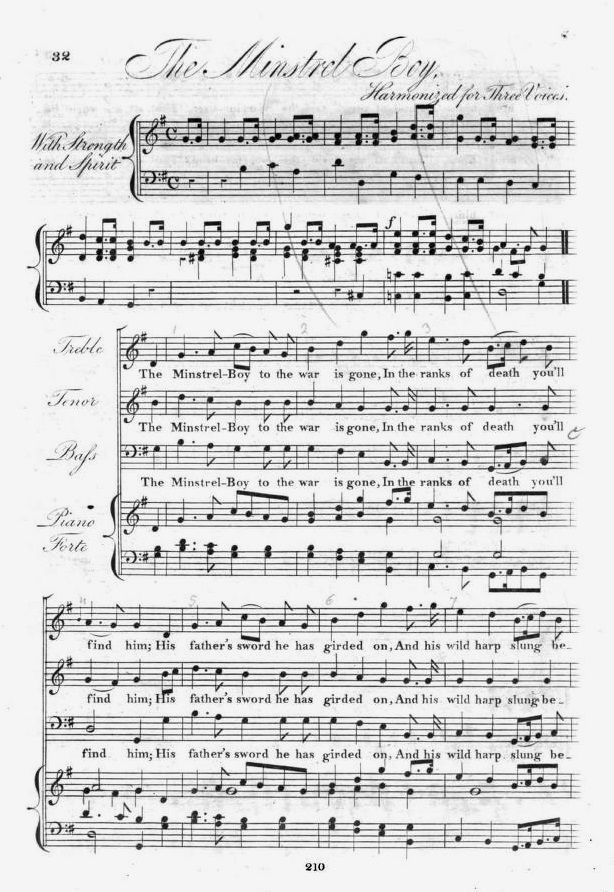
A selection of Irish melodies with symphonies and accompaniments by Sir John Stevenson Mus. Doc. and characteristic words by Thomas Moore esq., 5th number (London: J. Power, [1813]), 32-35
https://archive.org/stream/MooreIrishMelodies17/Moore_IrishMelodies_1-7#page/n381/mode/2up (DIGITISED)
4 BALLAD Oh! say not woman's love is bought! . . . John WHITAKER
PERFORMERS: Harriet Jones (soprano vocalist); George Sippe (pianoforte)
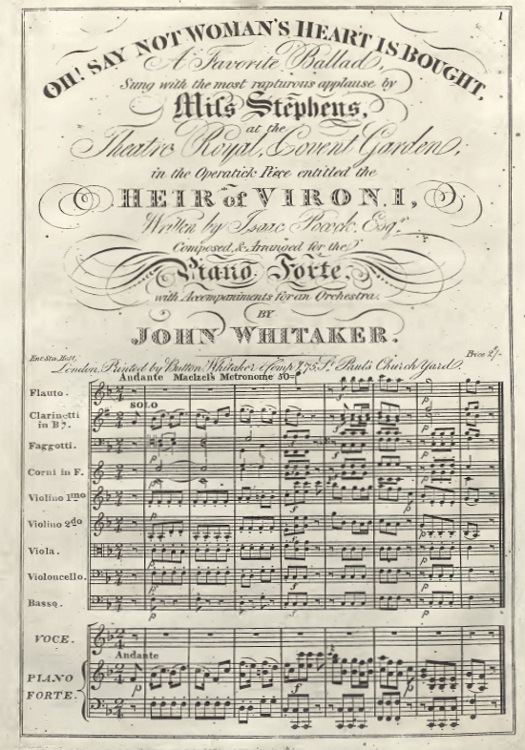
Oh! say not woman's heart is bought, a favorite ballad sung with the most rapturous applause by Miss Stephens . . . in the operatic piece entitled the Heir of Veroni, written by Isaac Pocock, esq., composed & arranged . . . by John Whitaker (London: Button, Whitaker & Company, [1817]) (image University of Southampton @ Internet Archive)
https://archive.org/stream/hartley00535540#page/n155/mode/2up (DIGITISED)
http://imslp.org/wiki/Special:ReverseLookup/420767 (DIGITISED)
Oh! say not woman's heart is bought, a favorite ballad sung with the most rapturous applause by Miss Stephens, composed by John Whitaker (New York: W. Dubois, n.d.) (image courtesy of the Lester S. Levy Collection of Sheet Music, The Sheridan Libraries, The Johns Hopkins University)
http://levysheetmusic.mse.jhu.edu/collection/111/056 (DIGITISED)
5 COMIC SONG The mail coach
PERFORMERS: Barnett Levey (vocalist)
[Words only], Oliver's comic songs: a selection of the whimsical, witty, eccentric, comical, curious, tragical, odd, droll, humorous, burlesque, and laughable, part 1 (Edinburgh: Oliver & Boyd, [1805]), 16-17
https://books.google.com.au/books?id=SSFYAAAAcAAJ&pg=PA16 (DIGITISED)
6 COMIC GLEE When Arthur first at court began (in Arnold's The battle of Hexham) . . . John Wall CALLCOTT
PERFORMERS: Mr. Clarke (tenor vocalist); James Blanch (tenor vocalist); John Edwards (bass vocalist); George Sippe (pianoforte)
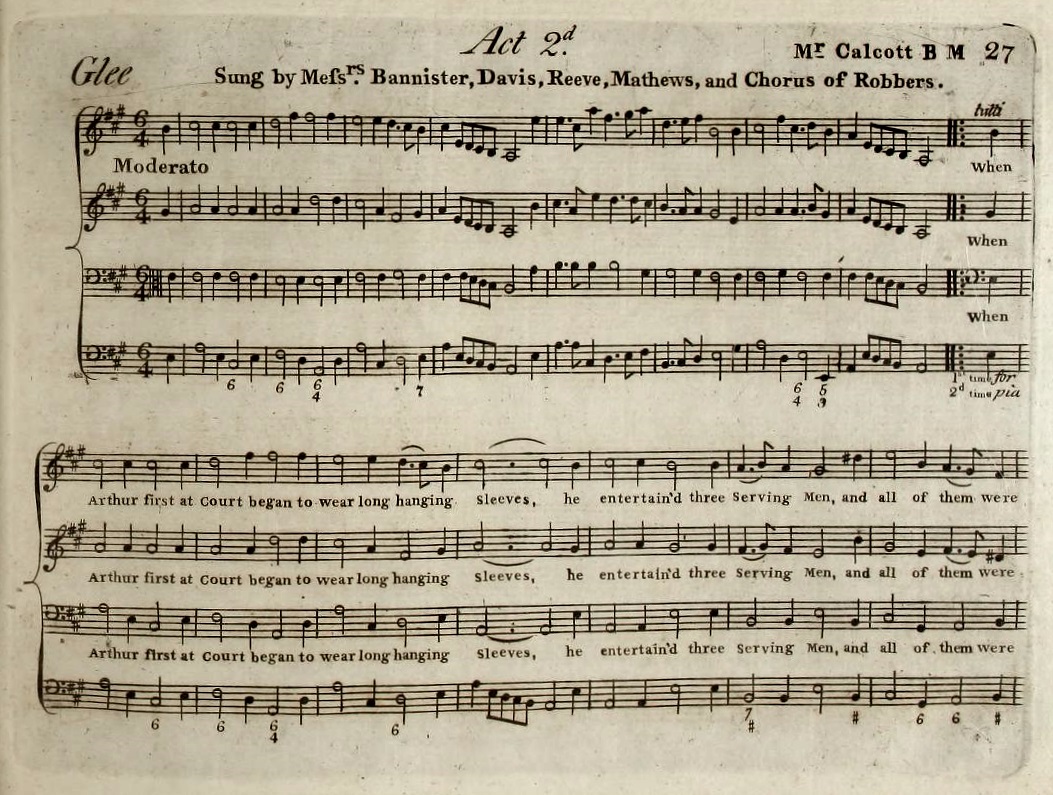
The overture, songs, chorusses & in the Battle of Hexham. or Days of old, as it is performed at the Theatre Royal in the Haymarket . . . the music composed by Dr. Arnold, opera 32 (London: Longman and Broderip, 1785), 27-30
https://archive.org/stream/overturesongscho00arno#page/26/mode/2up (DIGITISED)
[Melody only] Edinburgh repository of music, containing the most select English, Scottish & Irish airs (Edinburgh: J. Sutherland, [1818, 1825]), 85 (image National Library of Scotland @ Internet Archive)
https://archive.org/stream/edinburghreposit00rugg#page/84/mode/2up (DIGITISED)
http://digital.nls.uk/special-collections-of-printed-music/pageturner.cfm?id=87778749 (DIGITISED)
When Arthur first in court began to wear long hanging sleeves, a three part glee, [by] John Wall Callcott, accompaniment added by William Horsley (modern edition, CDPL ChoralWiki, edited by Jonathan Goodliffe, 2009)
http://www2.cpdl.org/wiki/images/c/c6/Cal-whe.pdf (DOWNLOAD)
PART 2
7 OVERTURE Tancredi . . . ROSSINI
PERFORMERS: Full band, John Edwards (violin, leader)
Rossini's celebrated overture to the opera of Il Tancredi arranged for two performers on the piano-forte by W. Watts (London: Chappell, 1820) (Connecticut College, Historic Sheet Music Collection, paper 474)
http://digitalcommons.conncoll.edu/sheetmusic/474 (DIGITISED)
8 SCOTCH BALLAD Let us haste to Kelvin Grove
PERFORMERS: Mr. Clarke (tenor vocalist); George Sippe (pianoforte)
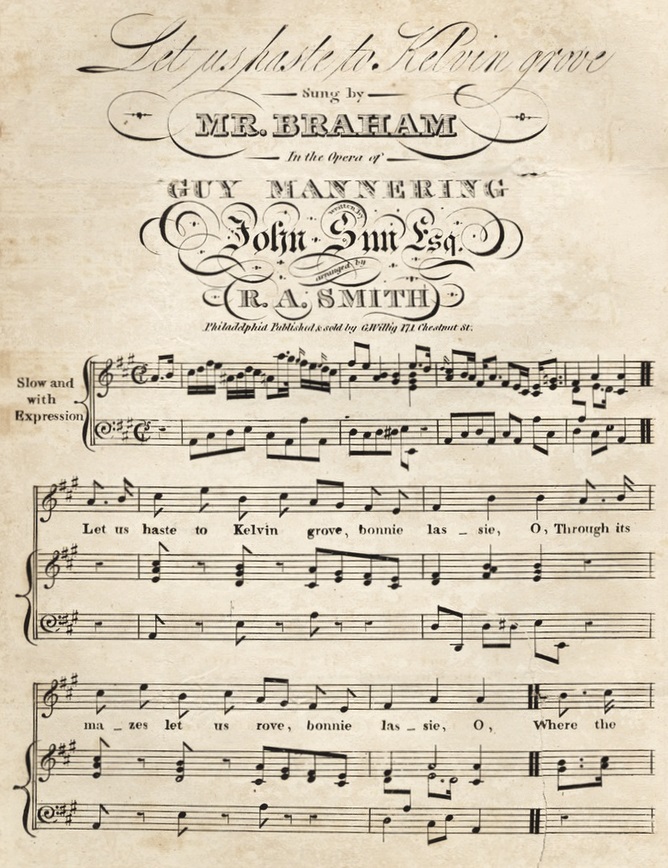
Let us haste to Kelvin Grove, sung by Mr. Braham in the opera of Guy Mannering, written by John Sim, esq., arranged by R. A. Smith (Philadelphia: G. Willig, n.d.) (image courtesy of the Lester S. Levy Collection of Sheet Music, The Sheridan Libraries, The Johns Hopkins University)
http://levysheetmusic.mse.jhu.edu/collection/110/061 (DIGITISED)
9 GLEE A Canadian boat song
PERFORMERS: Mr. Clarke (tenor vocalist), Mr. Paul [George or John jun.] (vocalist); John Edwards (bass vocalist); George Sippe (pianoforte)
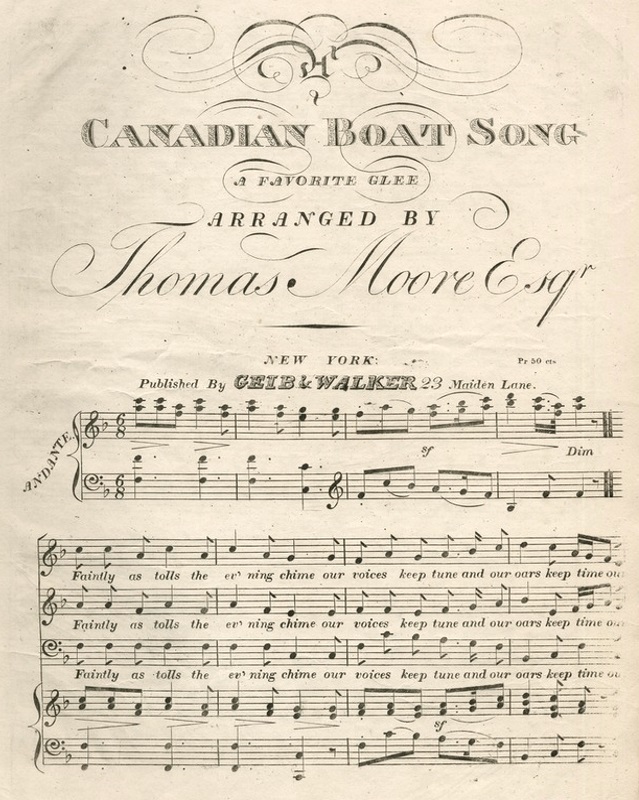
A Canadian boat song, a favorite glee, arranged by Thomas Moore, esq. (New York: Geib & Walker, n.d.) (image courtesy of the Lester S. Levy Collection of Sheet Music, The Sheridan Libraries, The Johns Hopkins University)
http://levysheetmusic.mse.jhu.edu/collection/108/095 (DIGITISED)
10 SONG Ye banks and braes
PERFORMERS: Harriet Jones (soprano vocalist); George Sippe (pianoforte)

The Scottish minstrel, a selection from the vocal melodies of Scotland, ancient & modern, arr. for the piano forte . . . volume the first (Edinburgh: Robt. Purdie, [c.1820-24]), 65 (image National Library of Scotland @ Internet Archive)
https://archive.org/stream/scotishminstrels00smit#page/n81/mode/2up (DIGITISED)
http://digital.nls.uk/special-collections-of-printed-music/pageturner.cfm?id=91352175 (DIGITISED)
11 COMIC SONG The beautiful boy
PERFORMERS: Barnett Levey (vocalist)
12 SONG The thorn . . . William SHIELD
PERFORMERS: James Blanch (tenor vocalist); George Sippe (pianoforte)
But note that The Australian reported his solo as The beweildered maid ["Slow broke the light . . ."] (Braham)
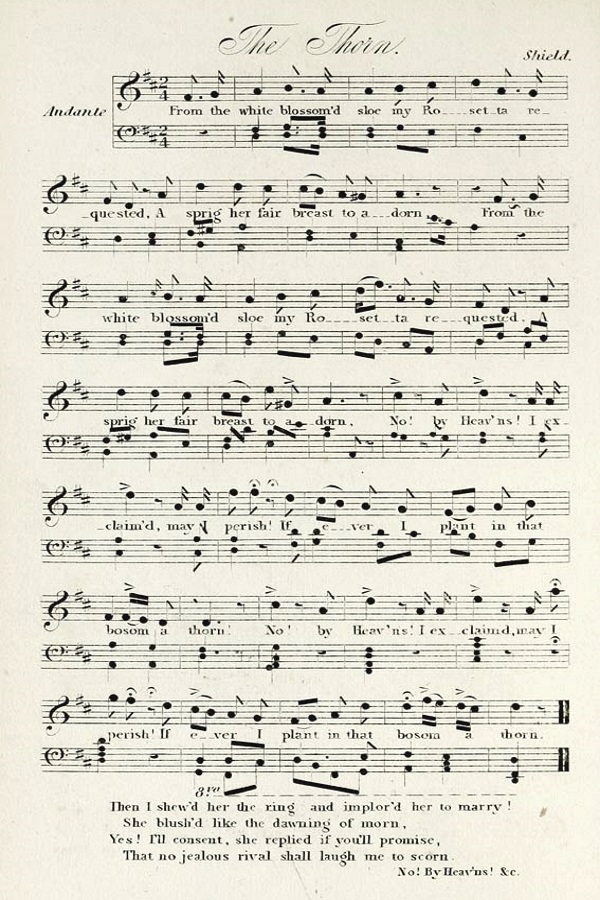
Bingley's select vocalist, containing songs, glees, duets, &c. by eminent composers . . . volume 1 (London: J. Bingley, [? c.1842]), 24 (image National Library of Scotland @ Internet Archive)
https://archive.org/stream/bingleysselectvo01bing#page/24/mode/2up (DIGITISED)
http://digital.nls.uk/special-collections-of-printed-music/pageturner.cfm?id=87717423 (DIGITISED)
13 OVERTURE Adelaide de Guesclino . . . Simone MAYR (1763-1845)
PERFORMERS: Full orchestra; John Edwards (violin, leader)
[Wordbook only] Adelaide di Gueselino [sic], dramma di sentimento in due atti per musica, da rappresentarsi negl'imperiali regi teatri di corte l'anno 1802 (Vienna: Mattias Andreas Schmidt, 1802])
https://books.google.com.au/books?id=qj1gAAAAcAAJ (DIGITISED)
Mayer's favorite overture to Adelaide, arranged for the piano forte, with an accompaniment for the violin & violoncello . . . By D. Bruguier (London: Mitchell's, [c. 1820]
https://books.google.com.au/books?id=52whAYeK9Y0C (DIGITISED)
Mayer's overture to the Opera of Adelaide, arranged for two performers on the piano forte . . . by D. Bruguier (London; [1825]) (? possible copy source) (copy at British Library)
MUSIC: Adelaide di Guesclino [sic] (opera); Simon Mayr (composer)
Performers
Mr. Clarke (tenor vocalist)
John Edwards (violin, bass vocalist)
Harriet Jones (soprano vocalist)
Barnett Levey (vocalist)
Mr. Paul [George or John jun.] (vocalist)
George Sippe (pianoforte)
[ ? Members of the Bands of the 3rd and 57th Regiments]
"Amateur Concert", The Sydney Gazette and New South Wales Advertiser (9 September 1826), 3
http://nla.gov.au/nla.news-article2186506
"Then why of these innocent pleasures complain
That leave such endearments behind?
Though the sun of their sweetness be sunk in the main,
It's twilight still rests on the mind."
We turn our attention occasionally, with considerable pleasure, to the judicious exertions of spirit and talent, which distinguish the subscribers to, and promoters generally of, these Concerts - not merely in administering to the exclusive gratification of the members, but in throwing open their rooms for the reception of so large a circle of fashion and respectability as is displayed on each succeeding evening of performance; thus rendering musical attract on a chain by which Society is drawn together, and public entertainment augmented. Similar exertions, we have no doubt, exercised in the various ways that might present themselves to other associations, would do much towards promoting social intercourse amongst the good folks of Sydney, and a longing after that minstrelsy which is one of the things in which man excels the beasts that perish. In this Society all seem to play in Concert, and it is "most devoutly to be wished," that no discord may ever arise to put so effective a band out of tune. But, it will be expected, we should say something of the evening's entertainments.
And first, then, the Concert commenced with a highly effective Overture by Hook, to which ample justice was rendered by the full orchestra, led by Mr. Edwards. Song, "Father William," was given by Mr. Edwards in a style in which remarkable sweetness of intonation, and chaste and elevated pathos, were most strikingly displayed. Glee, "The Minstrel Boy," the words by Thomas Moore, Esq. and arranged by Sir John Stevenson, sung by Messrs. Clark, Paul, and Edwards, was much and deservedly applauded. Whittaker's ballad, "Oh! say not Woman's Love is bought!" delightfully sung by Mrs. Jones, brought down:
"A louder yet, and yet a louder peal,"
and was honoured with a rapturous encore. Were it necessary, or indeed courteous, to criticise performances of this nature, it might be remarked, that this lady appears to want much of that confidence to which undoubtedly her merit might aspire. And, however pleasing may be a modest diffidence, and however calculated to call forth the support and sympathy of generous minds, it should also be borne in remembrance that nothing is more certain to depress the powers of singers, than the want of a proper sense of their own qualifications. Fear and trembling should be cast away, while, at the same time, all should be done calmly and collectedly. But, as we have no wish to break butterflies on the wheel, neither ought we dissect nightingales, and with this word of advice we pass on to notice "The Mail Coach," a comic song by Mr. B. Levey, which, to the destruction of the ears, and the ruin of the fine mechanism of the nerves, of those some half-dozen exquisites who are too genteel to tolerate comic singing in a Concert Room, convulsed the auditory with laughter, at Mr. Levey's admirable transitions of voice and feature, and was encored with a degree of enthusiasm which clearly demonstrated the preponderance of laughter-loving souls. A comic glee, "When Arthur first at Court," by Messrs. Clark, Blanch, and Edwards, concluded the first part.
Rossini's Overture to Tancredi commenced the second part, after which Mr. Clark sang the beautiful Scotch ballad, "Kelvin Grove" with an union of sweetness and spirit seldom surpassed. It was listened to with a silence scarcely disturbed by respiration, and the effect it produced is almost indescribable. It is needless to add that this song was encored by a simultaneous impulse. The "Canadian Boat Glee" for three voices, Messrs. Clark, Paul, and Edwards. It should be remarked that, in the glees, the clear and sonorous voice of Mr. Kavenagh would be a considerable acquisition, and was much missed on this occasion. Song, "Ye Banks and Braes," sung with much sweetness by Mrs. Jones, was deservedly applauded, and pourtrayed a striking purity of style and tone, and was given with that distinctness of articulation, without which vocal music can never please. Another comic song, "The Beautiful Boy," by Mr. Levey, who, on this occasion, kindly supplied the place of another Amateur, the latter, from some unexpected cause, not being prepared, was loudly called for a second time, and repeated with much good humour by the singer. Mr. Blanch sang the "Thorn," with considerable taste and feeling, and the evening's performances concluded with Mayer's delightful Overture to Adelaide, after which the pleased Assembly "parted 'till next they meet together." The selections on this evening were of a more varied character than usual, and appeared to impart general satisfaction. The songs were accompanied on the pianoforte by Mr. Sippe, in his usual judicious and effective manner.
"THE CONCERT", The Australian (9 September 1826), 3
http://nla.gov.au/nla.news-article37072479
Our Readers will, we conjecture, expect us to say somewhat of Wednesday evening's Concert - of the number who came to hear, and those who only came to be heard - of the pieces, vocal and instrumental which evinced taste, feeling, spirit, [illegible], science, humour, and those not remarkable for either. To begin then. - At seven o'clock, P. M., (it may have been one, or five, or ten minutes before or after) the inner - the outer - the upper, the lower - to be brief, every intervening door of admission was thrown open - the passages and rooms were lighted up brilliantly with the assistance of grecian lamps, and a profusion of more homely candles, distributed here and there and every where, with some regard to uniformity, but in no part without producing the desired effect of banishing sombre darkness.
The night was what is usually termed fine: - the celestial canopy studded over with every fixed and twinkling star, and wandering planet of the southern hemisphere, visible to natural optics, was blue and cloudless - the streets under foot dry, and not a little dusty - the air pleasantly cool and bracing - the coming on of a sudden, unpropitious shower as unlikely as that of an earthquake - A low, faint breeze, 'twould be difficult to say from what, particular point of the compass it set out, crept along without sufficient strength to rub the earliest peach trees of a blossom, or to throw a single particle of the best adjusted female head-dress out of its prescribed sphere; - all those incentives to move abroad and "scent the evening gale" did not seem sufficient to induce more than a dozen, or two of those expected to form an audience, to make their appearance by half past seven o'clock, the time expressed in the bills for commencing the Concert.
Musicians and vocalists - amateurs, and non-amateurs, had got their persons arranged within the precincts of the orchestra - the piano-forte, the violins, the flutes, were all up to "concert pitch" - the horns now and then emitted an impatient note, but what was to be done? - with the exception of two or three seats, but partially occupied, the performers could distinguish nought but empty benches and lights, one glimmering before another.
"Perhaps there's nothing - we'll not say appals,
But saddens more by night as well as day,
Than an enormous room, without a soul
To break the lifeless splendor of the whole;
two or three seem so little one so" -
this state of things did not however hold long. The deserted benches became gradually occupied - visitors of both sexes commence in pouring in en masse, and before the evening gun from H. M. S. of war Fly could thunder out the hour of eight, as respectable and nearly as numerous an auditory as we have usually had the pleasure of witnessing, occupied nearly every vacant seat.
The opening overture was well executed, and pleased generally. We can't with justice say as much for the song which followed - neither sweetness, variety, spirit, or feeling, was the air remarkable for. A quaint, formal expression of piety pervaded the words, and formed the only commendatory feature to be discovered throughout the entire song. "The Minstrel Boy to the war is gone" was sung as a glee - the words like all of Moore's compositions are capable of great and natural expression. Choral melody and natural pathos were not displayed in the happiest way in the Minstrel Boy on this occasion, though the counter tenor and base parts shewed judgment, and were given with a creditable degree of musical accuracy - the treble seemed not to be present, or to have descended an octave lower than he should - the accompaniment was good - on the whole it struck us as probable that the Minstrel Boy, even if sung indifferently as a solo, would have had a better effect than as a triplicate glee.
Mrs. Jones sung to the piano forte, on which Mr. Sippe performed with his usual skill, "Oh, say not woman's heart is bought, by vain and empty treasure." A little instrucion and knowledge in the science of music would go a great way towards making this lady's voice, which possesses much natural sweetness, not only pleasing, but delightful. Its full compass might by this means be ascertained, and taken advantage of, and the pathetic and mellifluous expression which artificial & natural talent combined, are capable of, which coming from female lips, thrill so irresistibly and enchantingly through the soul of feeling, be elicited.
An amateur song, the "Mail Coach" with infinite humour. The speaking part formed a lively portraiture of chubby landlords, bustling waiters, - bawling, complaining, contented, and discontented, male and female travellers, sturdy "coacheys," cracking a joke on each passing grisette, and cracking whips over their quadrupeds, rattling wheels, rough, and smooth roads, delightful weather for travelling, cold-catching nights, sporting cattle, hearty greetings, faint adieus - but here we must rein in our Pegasus and tread a different path.
A humorous glee by three voices concluded the first part.
The second commenced shortly after with Rossini's overture to Tancredi. It was exceedingly well performed. Mr. Edwards led with the violin, in a very masterly style. An amateur, Mr. J. Paul, played the tenor very creditably. Mr. Sippe's violoncello chimed in with its full soft base, most harmoniously. A pupil of Mr. S. performed on the concert flute. He filled up pauses among the other instruments, and warbled over the most rapid passages and cadences in such a brilliant, clear, and plaintive manner, as to excite general acclamation. His instructor deserves credit and support.
Mr. Clarke sung, "let us haste to Kelvin Grove," with a high degree of pathos, distinct articulation, and natural melody. It pleased better than any song during the evening - it was encored. "Faintly as tolls the evening chime," was not unpleasing. "Ye Banks and Braes" Mrs. Jones sung in a simple artless, and winning style. An amateur "a fellow of infinite jest - of most excellent fancy," (as Hamlet has been made to say of his once boon companion Yorick) sung the "beautiful boy" with genuine comic ability. Mr. Blanch sung "Slow Broke the Light." His apparently unsettled state of health seemed to hinder him from giving to this song all the expressive sweetness for which his voice is well adapted. An overture concluded the second part, which was on the whole got through more spiritedly than the first.
Mr. Sippe has, we understand, the far famed overture to Der Freischutz under rehearsal, between twenty and thirty performers are to be employed in it.
[News], The Monitor (15 September 1826), 2
http://nla.gov.au/nla.news-article31757837
MR. SIPPE intends taking his benefit shortly after the next regular concert. A rich treat is preparing for the cognoscenti of true harmony, the grand overture to Der Freitchutz [sic], composed by
"Von Weber, the Magical Von Weber."
is in rehearsal. Upwards of forty instrumental performers will lend their aid to give it full effect. An accession of vocalists is expected, particularly a lady, of whose ability report speaks highly.
On the London season, see "DER FREISCHUTZ; OR THE SEVENTH BULLET", The Sydney Gazette and New South Wales Advertiser (3 May 1826), 4
http://nla.gov.au/nla.news-article2185753
"AUSTRALASIAN POLITICS", The Sydney Gazette and New South Wales Advertiser (20 September 1826), 2
http://nla.gov.au/nla.news-article2186559
Hobart Town is determined to copy Sydney, even in its most amusing frivolities. They will have their Amateur Subscription Concerts, and why should they not, since that is so flourishing a Colony? At least the Editors make a good many flourishes.
ASSOCIATIONS: Hobart Town Concerts (1826-27)
CONCERT 7
Wednesday, 27 September 1826
School Room, Old Court House, Castlereagh Street, Sydney
Program
FIRST PART
1 OVERTURE Die Zauberflöte . . . MOZART
PERFORMERS: Full band, John Edwards (violin, leader)
2 SONG The sapling oak lost in a dell . . . Stephen STORACE
PERFORMERS:John Edwards (bass vocalist); George Sippe (pianoforte)
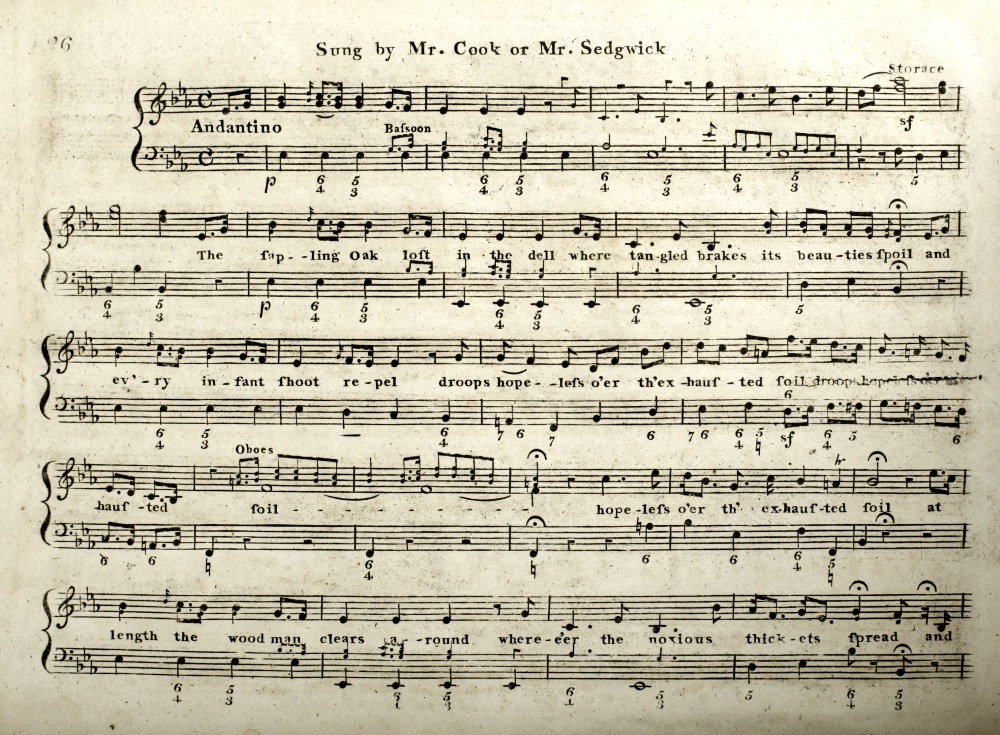
The siege of Belgrade, an opera in three acts as performed at the Theatre Royal Drury Land, the music principally composed by Stephen Storace ([London: Longman & Broderip, n.d.]), 26-27 (image Brigham Young University @ Internet Archive)
https://archive.org/stream/siegeofbelgradeo00stor#page/26/mode/2up (DIGITISED)
http://imslp.org/wiki/Special:ReverseLookup/89251 (DIGITISED)
3 GLEE List, lady, list
PERFORMERS: Mr. Clarke (tenor vocalist); Mr. Paul (vocalist); John Edwards (vocalist); George Sippe (pianoforte)
4 DUET Flutes . . . Rodolphe KREUTZER
PERFORMERS: Joshua Frey Josephson (flute); George Sippe (flute)
5 SONG Oh, rest thee, babe (Oh slumber my darling) . . . James HEWITT
PERFORMERS: Harriet Jones (soprano vocalist); George Sippe (pianoforte)
Oh slumber my darling, the favorite lullaby, sung with great applause by Miss Johnson, composed by James Hewitt (New York; Wm. Dubois, n.d.) (image courtesy of the Lester S. Levy Collection of Sheet Music, The Sheridan Libraries, The Johns Hopkins University)
http://levysheetmusic.mse.jhu.edu/collection/111/057 (DIGITISED)
6 COMIC SONG Sweet Kitty Clover
PERFORMERS: George Paul (vocalist); George Sippe, pianoforte)
Kitty Clover, a comic song (New York: E. Riley, n.d.) (image courtesy of the Lester S. Levy Collection of Sheet Music, The Sheridan Libraries, The Johns Hopkins University)
http://levysheetmusic.mse.jhu.edu/collection/047/097 (DIGITISED)
7 ? FINALE to first part ?
SECOND PART
8 ? OVERTURE ?
PERFORMERS: ? Full orchestra, or band
9 SONG The garland of love . . . James HOOK
PERFORMERS: Harriet Jones (soprano vocalist); George Sippe (pianoforte)
The garland of love ("How sweet are the flowers that grow by yon fountain"), composed by James Hook for Tekeli; or, The siege of Montgatz (1806), words by Theodore Hook
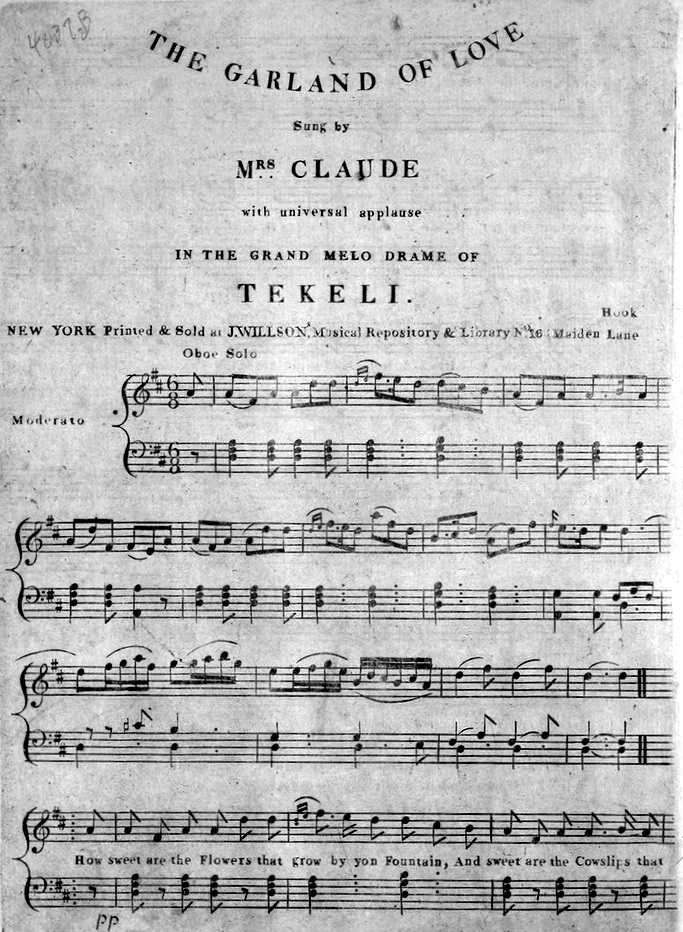
The garland of love, sung by Mrs. Claude with universal applause in the grand melo drame [sic] of Tekeli (New York: J. Willson, n.d.) (image courtesy of the Lester S. Levy Collection of Sheet Music, The Sheridan Libraries, The Johns Hopkins University)
http://levysheetmusic.mse.jhu.edu/collection/109/105 (DIGITISED)
10 GLEE To all you ladies now at hand ("The new mariners") . . . John Wall CALLCOTT
PERFORMERS: Mr. Clarke (tenor vocalist); Mr. Paul (vocalist); John Edwards (bass vocalist)
To all you ladies now at hand, "The new marriners, [by] John Wall Callcott, accompaniment added by William Horsley (modern edition, CDPL ChoralWiki, edited by Jonathan Goodliffe, 2009)
http://www1.cpdl.org/wiki/images/c/c0/Cal-toa.pdf (DOWNLOAD)
11 SEA SONG Tom Starboard was a lover true (in The turnpike gate). . . Joseph MAZZINGHI
PERFORMERS: Mr. Clarke (tenor vocalist)
Lyrics by Thomas Knight, sung by Charles Incledon in Mazzinghi and William Reeve's opera The turnpike gate, London, 1799
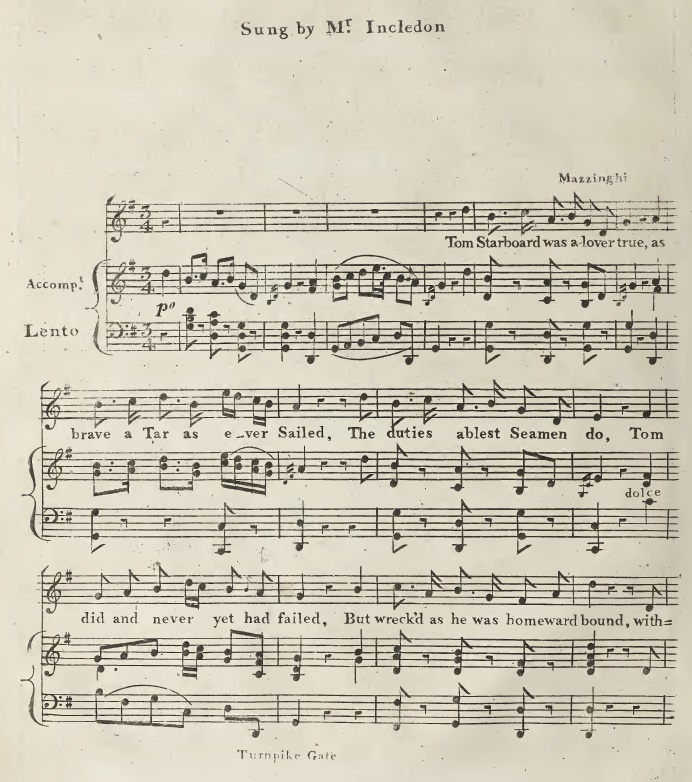
The turnpike gate, a comic opera in two acts as performed at the Theatre Royal, Covent Garden, composed by Mazzinghi & Reeve (London: Goulding, Phipps & D'Almaine, n.d.), 12-15 (image University of Toronto @ Internet Archive)
https://archive.org/stream/turnpikegatecomi00mazz#page/n19/mode/2up (DIGITISED)
http://imslp.org/wiki/Special:ReverseLookup/396654 (DIGITISED)
[Words only], A garland of new songs (Newcastle upon Tyne: Printed by J. Marshall, n.d.)
12 COMIC MEDLEY
PERFORMERS: Barnett Levey (vocalist)
13 OVERTURE La chasse . . . Hyacinthe JADIN (1776-1800)
PERFORMERS: Military band/s; ? Band of the 57th Regiment, master, George Sippe
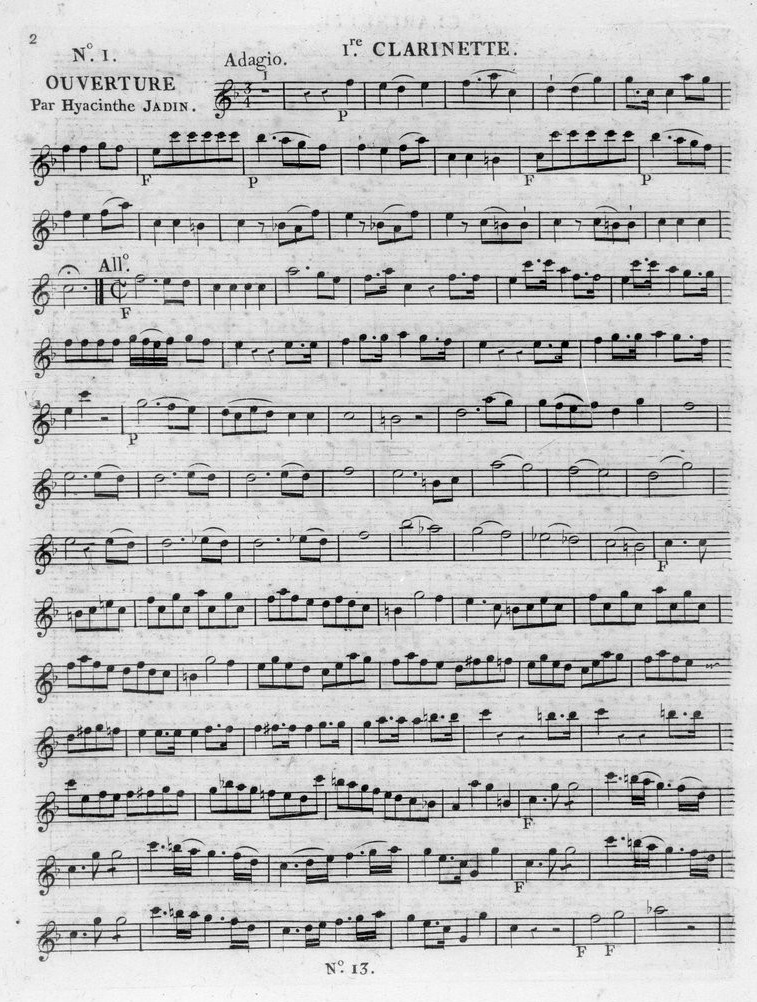
Ouverture pour instrumens à vent par Hyacinthe Jadin N. 13 (Paris: Magasin de musique à l'usage des fêtes nationales, [c. 1796]) (image Bibliothèque nationale de France)
http://catalogue.bnf.fr/ark:/12148/cb397871024 (DIGITISED)
http://gallica.bnf.fr/ark:/12148/btv1b9082958f (DIGITISED)
Overture in F for wind instruments (1796) by Hyacinthe Jadin; The Wallace Collection
https://www.youtube.com/watch?v=k4LISCtPwM0 (STREAMED SOUND)
[News], The Monitor (29 September 1826), 5
http://nla.gov.au/nla.news-article31757866
THE Seventh Concert took place on Wednesday Evening. The assemblage was not so numerous as on some former occasions, but still the room was respectably filled. Mrs. Jones, however, executed her songs with her usual sweetness, and the instrumental selections were well received. The company retired in high spirits, fully gratified with the evening's entertainment. Mr. Clarke took a new style of songs this evening, in which he was eminently successful. Mr. Edwards's song, "THE SAPLING OAK," was, as usual, received with eclat.
"Amateur Concert", The Sydney Gazette and New South Wales Advertiser (30 September 1826), 3
http://nla.gov.au/nla.news-article2186634
"Preposterous ass! that never read so far,
To know the cause why music was ordained I
Was it not to refresh the mind of man
After his studies, or his usual pain!
Then give me leave to read philosophy,
And while I pause, serve in your harmony."
SHAKSPEARE
The Concerts - those cities of refuge to which the mind may fly now and then from the toil, dullness, and weary repetitions of morning, noon, and night, and night, noon, and morning;
from the fatigue of professional pursuits, and the right-angled formalities of daily avocations - continue to be a source of considerable attraction with numbers of the Sydney fashionables.
That, on Wednesday evening last, was most respectably, though not numerously attended; but, as these harmless meetings keep alive better things than some philosophy can teach, their very elements are valuable;
and, though objections have been raised against them, which,
"Like bubbles on the sea of matter borne,
But rise and break, and to the sea return,"
it is pleasing to observe, that they continue to meet with a regard which could only arise from a sense of discriminating admiration.
The few hours spent at one of these performances are, to use the language of an elegant modern writer,
"a little glossy portion of the stream of life - a season of calm joy, which it is tranquilizing even to remember,"
and brings the imagination back to those days when every thought was pleasure, and every moment hope.
The management and selection of the music reflect considerable credit on the conductors, Messrs. Edwards and Sippe. Interspersing vocal and instrumental performances of different measure and expression, the great secret of making a musical meeting productive of pleasure, not only to the visitors, but to the performers themselves, and not by going on playing one piece after another in the same style and time, give those who hate music an opportunity of rejoicing over the tortures of those who presume to think that they admire it. In noticing those parts of the "bill of fare" for Wednesday last, which seemed to please most, we will, of course, commence with the lady. Mrs. JONES, then, was welcomed by the most cordial greetings of the audience,
" ----- raised
By a quick instinctive motion,"
on her appearance; and throughout the two songs allotted to her (Rest thee, Babe, and The Garland of Love, both of which were rapturously encored) fully sustained, and even enhanced, the opinions formed of her on her former appearances. The grace and propriety of her manner, the sweetness of her tones, and the deep compass of her voice altogether, but most particularly in the lower notes, establish her as really a most charming songstress, and one who, there cannot be the least doubt, must rise progressively in public favour. The Sapling Oak was given with much spirit and feeling by Mr. Edwards. This gentleman's voice possesses considerable compass and variety, and is particularly effective in the expressions of pathetic feeling and manly sentiment. This song was encored. A duetto, arranged from Kreutzer by Mr. Sippe, and his pupil, Master Josephson, was much and deservedly applauded, and had the peculiar merit, beyond performances of this description generally, of being not merely a shew of execution - it was music, as the difficulty of a passage never concealed the expression. Messrs. Paul and Levey sang a comic song each, with their accustomed excellence. Tom Starboard, sung with much taste and feeling by Mr. Clark, was encored, as also two glees by Messrs. Clark, Paul, and Edwards.
The Band performed at intervals some effective and classical overtures, and altogether the entire arrangement of the evening were gone through in a manner highly creditable to the judicious management of the conductors. The next Concert will be for the benefit of Mr. Sippe, who we consider to be well entitled, not only on the score of professional services and abilities, but also from his continued exertions to promote the success of the Amateur Concerts, to expect a fair share of public patronage; and we have no doubt that these united claims will draw together a full and fashionable audience.
The claim, also of Mrs. Jones to public patronage are considerable, and will, no doubt, be duly appreciated, in the event of her taking a benefit, to which most unquestionably her unremitting endeavours to please, as well as her undoubted talent, entitle her. The natural sweetness of her voice, and guided as it is by good taste and correct enunciation - qualities rarely combined - cannot fail, when practice has overcome natural diffidence, to entitle her to an eminent rank as a vocalist; and no opportunity, it is hoped, will be lost encouraging and supporting genius.
"THE CONCERT", The Australian (30 September 1826), 3
http://nla.gov.au/nla.news-article37074453
In attempting to give our readers a succinct synopsis of Wednesday evening's concert, we have to tread a beaten path; but one, notwithstanding, which offers something in the shape of variety-somewhat amid the usual dearth of incidents to comment upon. There overtures, in some parts solemn, slow, plaintive, dulcet-enough to take some "prisoned soul, & wrap it in elysium;" in others "merry as a marriage bell;" full, loud, and symphonious as the "deep, majestic, solemn organs' blow;" or sportive as the gentle breeze which plays o'er summer's brooks, remain to be detailed, besides double the foregoing number of songs, now soft & sentimental as a love lorn ditty, or humorous as "the humours of Bartholomew fair O." Glees, duets, and though amongst the last, not least, the cerulean, gorgon, hazle, jetty, sparkling eyes - the faces, lit up with smiles of satisfaction, "as is the lilly, or the mountain rose," the tastefully adorned, "or which unadorned, adorned the most" persons of those visitors of the softer sex, who patronised the evening's concert; but, as the latter may be thought to "beggar all description," imagination can take its tour, and fancy perfections or imperfections as it pleases.
At eight o'clock, the concert commenced, as usual with an overture, Zauberflote, by Mozart; it succeeded very well, and was followed by "The sapling oak lost in a dell," which Mr. Edwards sung with a degree of taste and musical accuracy not a little creditable to himself, nor unpleasing to his hearers - the air is well adapted to the just, base voice, of Mr. E. "List lady list" was sung to the piano-forte, by three voices, not unpleasingly; it was universally encored. A flute duet, composed by Kreutzer followed next. The piece was pleasing-not without difficult pan ages and gradual transitions; from the clear and expressive manner in which it was performed, throughout it claimed general and mute attention. Mr. Sippe and a pupil of his, Master Josephson, were the performers. Mrs. Jones was not particularly happy in her song, "Rest thee babe." The words were hurried over without betraying or exciting appropriate feeling, though her voice seemed possessed of a certain sweetness and sensibility which a little well bestowed instruction might raise many notes above mediocrity. Mr. G. Paul sung "Sweet Kitty Clover" with considerable humour and justness. Mrs. Jones was highly successful in her next song, "the Garland of Love." "To all you ladies now at hand," though encored, did not or could not give any very great degree of satisfaction. Mr. Clark attempted a sea song; his voice was but ill adapted for it; it did not succeed well. Mr. B. Levey gave a comic song, a medley, with his usual humour, but without an accompaniment; the want of which, Mr. L.'s voice, though it is not without strength and compass, could but ill spare. At its conclusion the cries of "encore" became universal, and stunning Mr. L. by a skilful alteration and introduction of other "snatches of old tunes" though at times not a little mal-apopos, excited equal applause by his second attempt, as the first. Jardin's overture, "la chasse," concluded the second part, and the evening's performance. The instrumental pieces appeared to have been well selected and well performed throughout. Several of the vocal pieces on the above evening did not tend greatly to shew a just taste in the selector - they seemed to derive more merit from their antiquity and the generally creditable style in which they were sung, than from any innate value they could be discovered to possess over more modern and equally as pleasing airs.
October
[News], The Australian (4 October 1826), 3
http://nla.gov.au/nla.news-article37071521
The Concert, which is announced to take place on Wednesday evening next, is for the benefit of a very deserving, active, and intelligent individual, Mr. Sippe, and bids fair, we understand, to outvie in point of judicious arrangement, variety, execution, or other sources of attraction, any one of the seven concerts preceding it. Twenty-five instrumental performers are to comprise the orchestra. The particular songs, glees, and instrumental pieces to be performed, may be seen from an advertisement in another column. Mr. Sippe's hitherto unrewarded exertions promise to meet on Wednesday evening with all the just support they are entitled to, and his musical abilities to be more duly appreciated than heretofore.
[Advertisement], The Australian (4 October 1826), 2
http://nla.gov.au/nla.news-article37071519
AMATEUR CONCERT.
Court-house, Castlereagh-street.
MR. SIPPE'S BENEFIT.
Wednesday, 11th October, 1826
ACT I
WEBER'S CELEBRATED OVERTURE to Der Freischutz; as performed by his Majesty's private band.
Song - Cease your Funning . . . Storace
Glee - See our oars . . . Stevenson
Air - Variations clarionet; with a rondeau composed by Mr. Sippe . . . Druett
Song - Is there a heart that never loved . . . Braham
Air - Variations piano-forte . . . Fils
Song and Recit. - Death of Nelson . . . Braham
Comic song
ACT II
Overture to The Miller and his Men . . . Bishop
Song - Adieu my Native Land . . . Hook
Glee
Quartette - two flutes, two French horns . . . C. M. Von Weber
Duet - Now at Moonlight's Fairy Hour . . . Thompson
Duet - Violin and violincello . . . Brevel
Comic song - Tippitywitchet.
Finale - Favourite overture to Guy Mannering . . . Bishop
Tickets may be had of Mr. G. Paul, Mr. Rapsey, Mr. Robertson, Mr. Hayes,
Mr. B. Levey, Mr. Foxall, and Mr. Foster, at 5s each. Children half price.
N.B. - The performance will commence at a quarter past 7 o'clock precisely.
[Advertisement], The Sydney Gazette and New South Wales Advertiser (4 October 1826), 1
http://nla.gov.au/nla.news-article2186645
[Advertisement], The Monitor (6 October 1826), 5
http://nla.gov.au/nla.news-article31757880
"ODDITIES FROM THE LAST MONITOR", The Sydney Gazette and New South Wales Advertiser (11 October 1826), 3
http://nla.gov.au/nla.news-article2186699
[News], The Australian (11 October 1826), 3
http://nla.gov.au/nla.news-article37071329
This evening Mr. Sippe's benefit concert takes place. From the judicious arrangement of the different vocal and instrumental pieces intended to be performed during the evening, and the exertions which are making to give those the best possible effect, a more than usually brilliant treat may, we imagine, be very confidently anticipated.
CONCERT 8 (George Sippe's benefit)
Wednesday, 11 October 1826
School Room, Old Court House, Castlereagh Street, Sydney
Program
ACT I
1 OVERTURE Der Freischüutz . . . Carl Maria von WEBER (1786-1826)
PERFORMERS: ? military band/s only
"Ouverture", in Der Freyschütz, romantische Opera von C. M. v. Weber arrangirt in Harmoniemusik für Flöten, Hoboen, Clarinette, Hörner und Fagotte von Karl Flachs (Leipzig: Hoffmeister, [c. 1825])
http://imslp.org/wiki/Special:ReverseLookup/22862
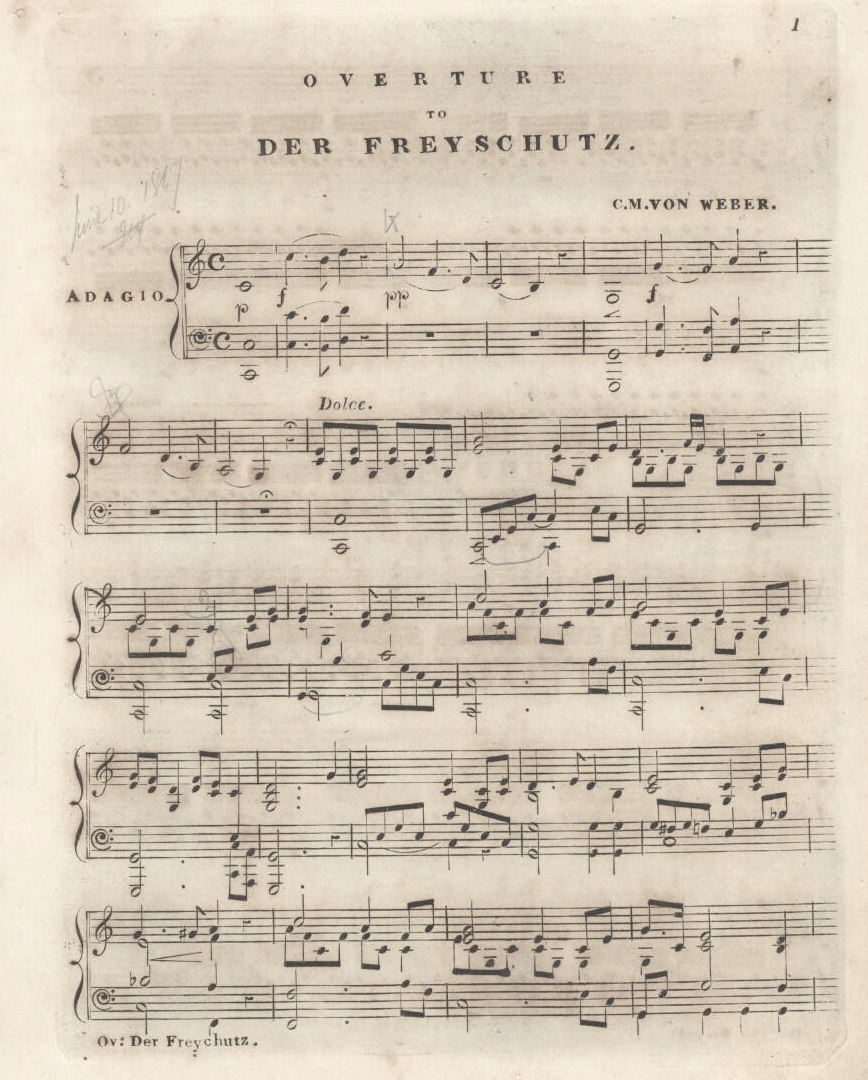
Overture to Der Freyschütz, arranged for the piano forte, composed by C. M. von Weber, new & superior edition (Sydney: F. Ellard, n.d.) (image National Library of Australia)
http://nla.gov.au/nla.obj-168128728
2 SONG Cease your funning . . . ? Stephen STORACE
PERFORMERS: Harriet Jones (soprano vocalist); George Sippe (pianoforte)
By the early 1820s, several versions of Cease your funning had been published in London with graces and embellishments, as performed by such singers as Angelica Catalani and Catherine Stephens. In Sydney, Elizabeth Clancy later sang another version that she ascribed to Farinelli. No other reference to a setting by Stephen STORACE is known, though if it did indeed exist it too probably consisted of variations on the original tune.
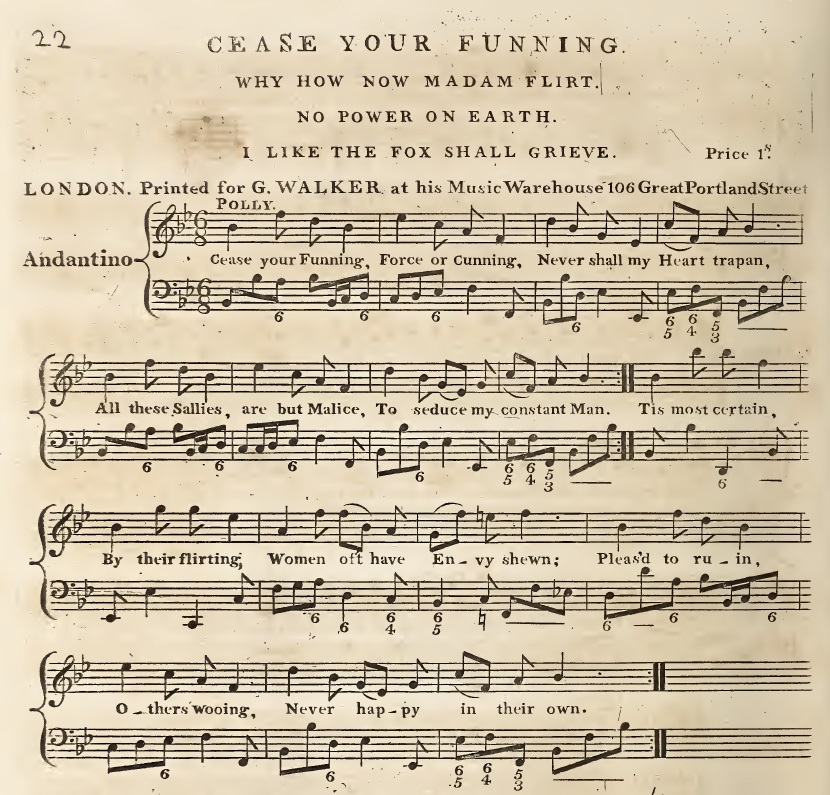
The beggars opera as it is perform'd at both theatres with the additional alterations by Dr. Arne for the voice, pianoforte & violin, the basses entirely new (London: G. Walker, n.d.), 22 (image University of Western Ontario @ Internet Archive)
https://archive.org/stream/ladygordonsmusic00nich#page/n223/mode/2up (DIGITISED)
http://imslp.org/wiki/Special:ReverseLookup/390353 (DIGITISED)
3 GLEE See our oars . . . STEVENSON
PERFORMERS: vocalists, with Kent bugle accompaniment (? a bandsman)
4 AIR & VARIATIONS (clarionet) Believe me if all those endearing young charms . . . Louis DROUET (1792-1873)
With a RONDEAU composed by Mr. Sippe
PERFORMERS: George Sippe (clarinet, composer)
5 SONG Is there a heart that never loved . . . John BRAHAM
PERFORMERS: Benjamin Francis (vocalist); George Sippe (pianoforte)
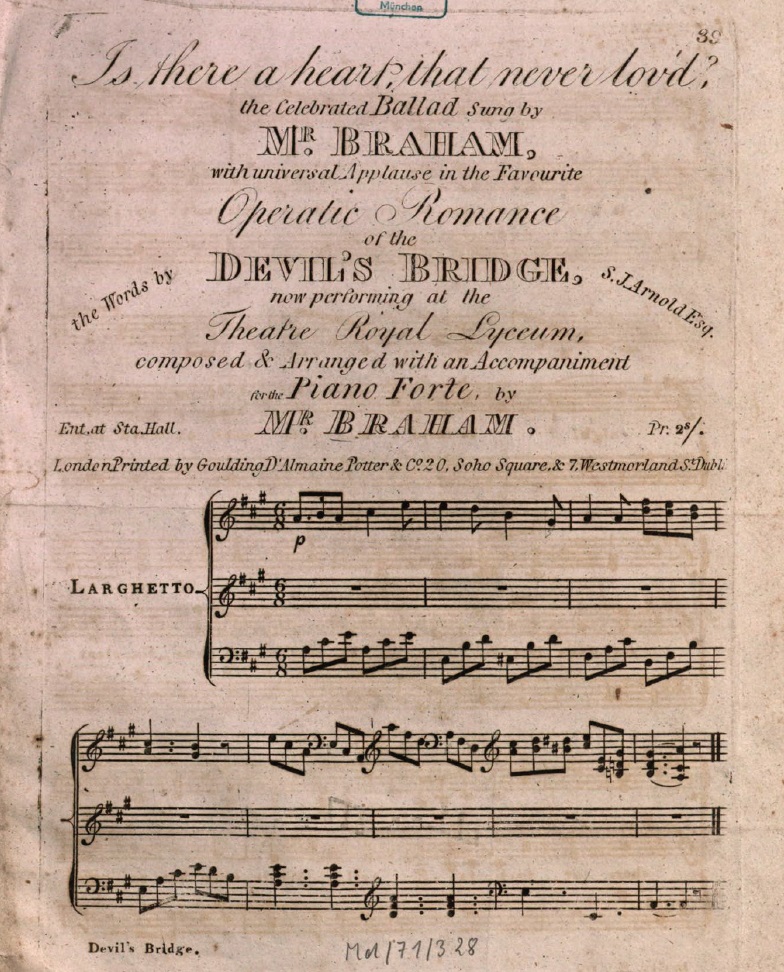
Is there a heart, that never lov'd? the celebrated ballad, sung by Mr. Braham, with universal applause in the favourite operatic romance of The devil's bridge, the words by S. J. Arnold, now performing at the Theatre Royal Lyceum, composed & arranged with an accompaniment for the piano forte by Mr. Braham (London: Goulding, D'Almaine, Potter & Co., [1815]) (image Munich, Bayerische StaatsBibliothek digital)
http://www.mdz-nbn-resolving.de/urn/resolver.pl?urn=urn:nbn:de:bvb:12-bsb11149212-7 (DIGITISED)
Is there a heart, that never lov'd? the celebrated ballad sung by Mr. Braham with universal applause in the favourite operatic romance of The devil's bridge, the words by S. J. Arnold, as performed at the Theatre Royal, Lyceum, composed & arranged with an accompaniment for the piano forte by Mr. Braham (London: Goulding, D'Almain, Potter & Co., n.d.)
https://archive.org/stream/hartley00535537#page/n135/mode/2up (DIGITISED)
6 AIR & VARIATIONS pianoforte . . . FILS ( ? )
PERFORMERS: George Sippe (pianoforte)
7 RECITATIVE AND AIR The death of Nelson (in The Americans) . . . John BRAHAM
PERFORMERS: Barnett Levey (vocalist); George Sippe (pianoforte)
Nelson, the celebrated recitative and air, as performed in the comic opera of the Americans, at the Theatre Royal Lyceum, written by S. J. Arnold esq., composed & sung by Mr. Braham (London: Goulding, D'Almaine, Potter & Co., n.d.) (image courtesy of the Lester S. Levy Collection of Sheet Music, The Sheridan Libraries, The Johns Hopkins University)
http://levysheetmusic.mse.jhu.edu/collection/015/014 (DIGITISED)
8 COMIC SONG
PERFORMERS: Mr. Paul [George, or John, jun.] (vocalist)
ACT II
9 OVERTURE The miller and his men . . . BISHOP
PERFORMERS: Full band; or military band/s
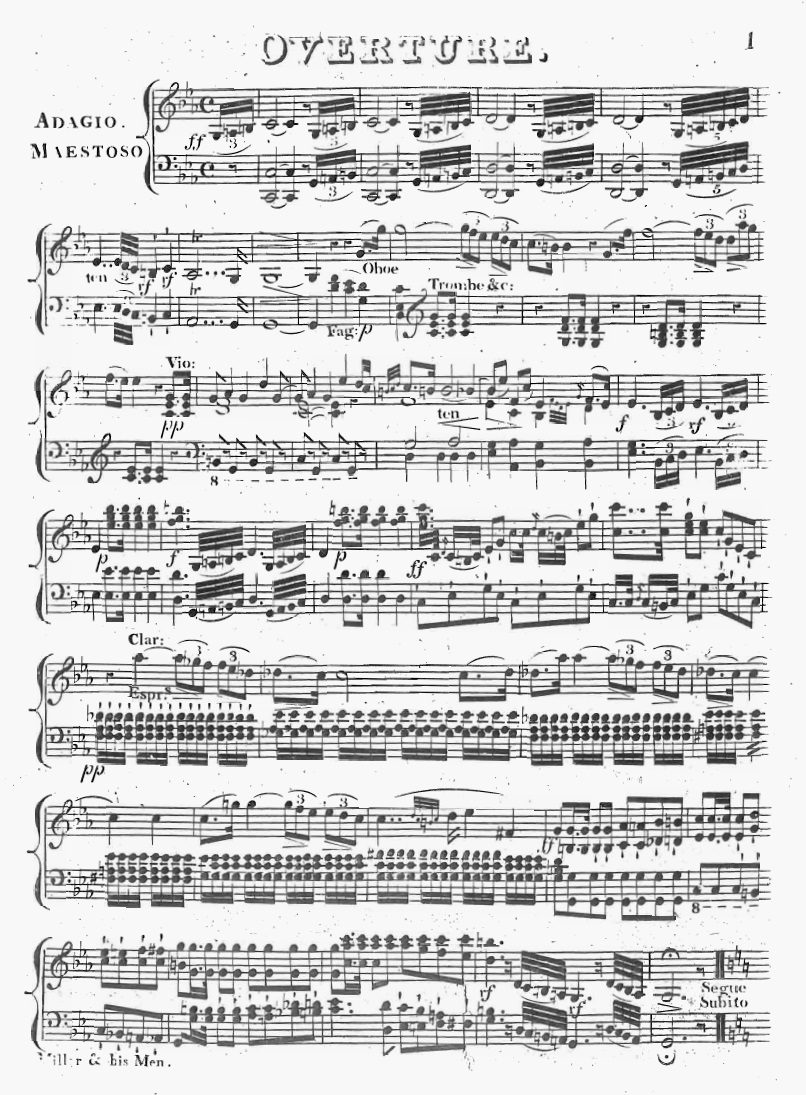
The miller and his men, a melo drama in two acts as performed with universal applause at the Theatre Royal, Covent Garden, the music composed & arranged for the piano forte by Henry R. Bishop . . . (London: Goulding, D'Almaine, Potter & Co., n.d.) (image Paul Douglas, Romantic-era songs)
http://www.sjsu.edu/faculty/douglass/music/album-miller-sheet-music.html (DIGITISED)
10 SONG Adieu my native land . . . HOOK [? John Westbrooke CHANDLER]
PERFORMERS: Mr. Clarke (tenor vocalist); George Sippe (pianoforte)
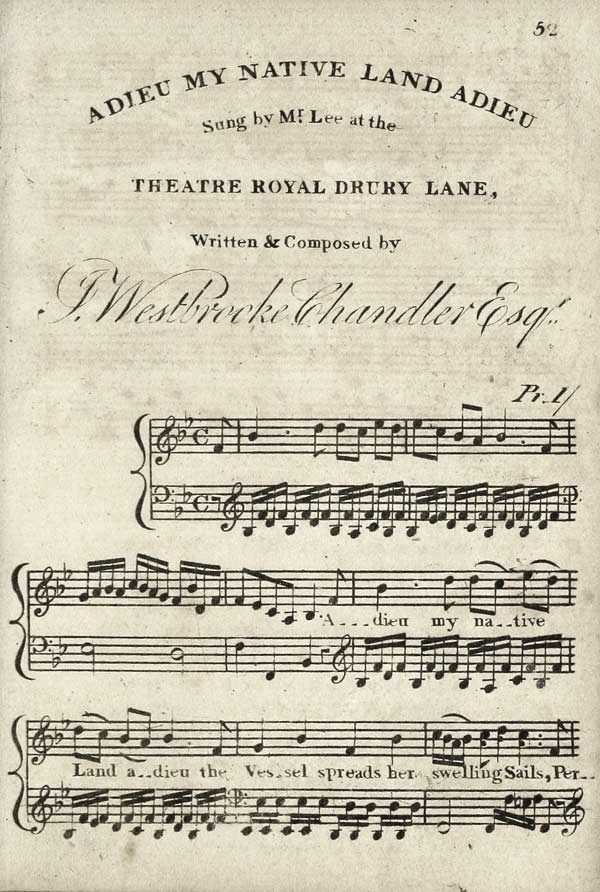
"Adieu my native land adieu, sung by Mr. Lee at the Theatre Royal, written & composed by J. Westbrooke Chandler", in A selection of Scots, English and Irish songs with accompaniments for the piano-forte, from the most eminent composers . . . [volume 2] (Edinburgh: D. Robertson, [c. 1820]), 52-54 (image National Library of Scotland @ Internet Archive)
https://archive.org/stream/selectionofscots00rugg#page/51/mode/2up (DIGITISED)
http://digital.nls.uk/special-collections-of-printed-music/pageturner.cfm?id=91455550 (DIGITISED)
11 GLEE
12 QUARTETTE two flutes, two French horns . . . Carl Maria von WEBER
PERFORMERS: Joshua Frey JOSEPHSON (flute); George Sippe, flute; 2 bandsmen, horns)
13 DUET Now at moonlight's fairy hour . . . Thomas THOMPSON
PERFORMERS: Mr. Clarke, John Edwards, vocalists; George Sippe, pianoforte)
MUSIC: See with earlier performance above
14 DUET Violin and violoncello . . . Jean Baptiste BRÉVAL (1753-1823)
PERFORMERS: John Edwards, violin; George Sippe, violoncello)

Six favorite airs with variations for a violin and violoncello by J. B. Breval (London: R. Birchal, n.d.) (image Copenhagen, Royal Library @ IMSLP)
http://imslp.org/wiki/Special:ReverseLookup/25327
15 COMIC SONG Tippitywitchet . . . Charles DIBDIN jun. (words); William REEVE (music)
PERFORMERS: Barnett Levey (vocalist)
[Words only, original, without title] "SCENE II. SONG - CLOWN" ["This very morning, handy / My malady was such . . ."], Songs, duets, trios, chorusses, &c. &c. with a description of the scenery, in the comic pantomime, called Bang up! or, Harlequin prime, performing at the Aquatic Theatre, Sadler's Wells; the pantomime the production of Mr. C. Dibdin, jun. . . . the overture and music composed by Mr. Reeve (London: W. Glendinning, 1810), 8-9
https://books.google.com.au/books?id=lBFXAAAAcAAJ&pg=PA8 (DIGITISED)
ASSOCIATIONS: Written for Joseph Grimaldi, the clown
[Words only], "A TYPITYWICHET; OR, PANTOMIMICAL PAROXYSMS. Sung with reiterated applause and approbation by Mr. Grimaldi, at the various Theatres", The vocal magazine . . . no. 6 (1 June 1815), 193-94
https://books.google.com.au/books?id=k4kvAAAAYAAJ&pg=PA193 (DIGITISED)
[Words only], "TYPITYWICHET" , The Christmas tree songster . . . (London: Pattie, 1857), 10
https://archive.org/details/christmastreeson00unse/page/n13/mode/2up (DIGITISED)
Tippity witchet, a favorite comic song, sung by Mr. Grimaldi, at the Aquatic Theatre Sadlers Wells, in the pantomime of Bang up! or Harlequin prime, written by C. Dibdin Junr, composed by W. Reeve (London: Printed by Button & Whitaker, [c. 1810])
https://discover.libraryhub.jisc.ac.uk/search?q=Tippity+witchet+&rn=1
16 FINALE Overture to Guy Mannering . . . BISHOP
PERFORMERS: [? Full orchestra]
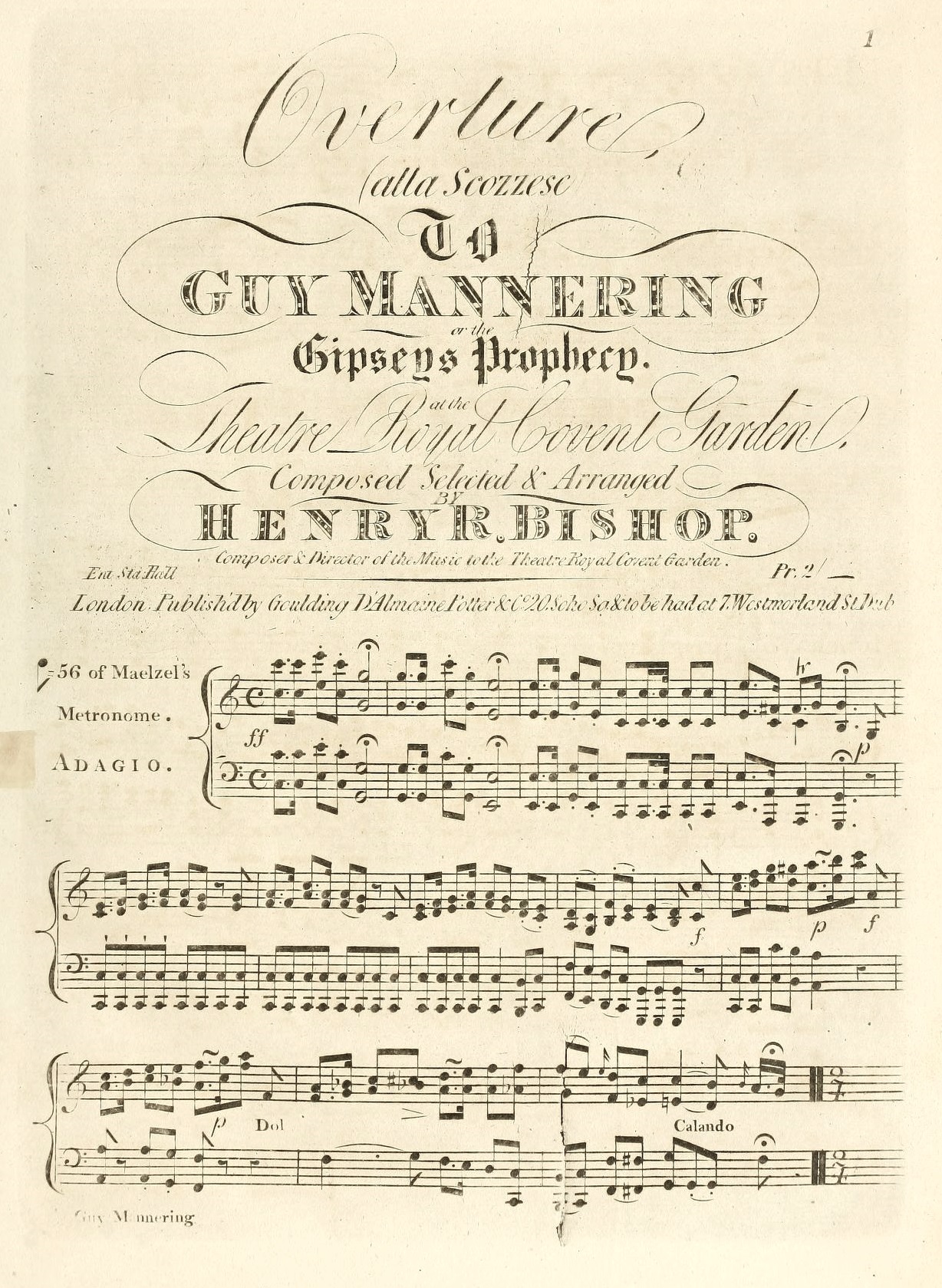
The overture, songs, duetts, glees, and chorusses in the musical play of Guy Mannering composed & arranged . . . by Thos. Attwood and Henry R. Bishop (London: Goulding, D'Almaine, Potter & Co., [1816]), 1-7 (image Boston Public Library @ Internet Archive)
https://archive.org/stream/overturesongsdue00bish#page/n7/mode/2up (DIGITISED)
Performers
Mr. Clarke (tenor vocalist)
John Edwards (violin, bass vocalist)
Benjamin Francis (vocalist)
Harriet Jones (soprano vocalist)
Joshua Frey Josephson (flute)
Barnett Levey (vocalist)
George Paul(vocalist)
George Sippe, pianoforte, clarinet, flute, violoncello
[? Members of the Bands of the 3rd and 57th Regiments]
"MR. SIPPE'S BENEFIT CONCERT", The Monitor (13 October 1826), 5
http://nla.gov.au/nla.news-article31757909
MR. SIPPE'S BENEFIT CONCERT.
THE public evinced their appreciation of talent, and the liberality of their disposition, by a most respectable and very numerous assemblage at the Concert-room, on Wednesday evening, for the benefit of Mr. Sippe, whose unremitted exertions merited the return they met with. No pains had been spared to render, the performance worthy the public, favour - and we may venture to say, that the expectations of the audience were not disappointed. Above four hundred persons were present, among whom we noticed Cols. Dumaresq and Shadforth, the Surveyor-General, several magistrates and military officers, with others of the greatest respectability.
At half-past seven the First Act commenced, with the justly celebrated "overture to Der Freischutz, by C. W. Von Weber, as performed by His Majesty's private band;" This is a rare specimen of German composition, and the band in the Orchestra did ample justice to the piece. Cease your Funning, by Storace, was very unaptly allotted to Mrs. Jones. We, in common with the company, felt surprised that a song so entirely out of her line of singing, should have been selected for this lady. It was doing her real talents an injustice. Stevenson's Boat Glee was favourably received. The introduction of the Kent Bugle accompaniment, omitted on a former occasion, was very pleasing. An air, "Believe me if all those endearing bright charms" with variations, on the clarionet, together with a clever transition to a Rondeau, composed, by Mr. Sippe, were well performed. Braham's delightful song, "Is there a heart that never loved," introduced a candidate for vocal fame, viz. Mr. B. Francis; this gentleman possesses a voice at once melodious and powerful, and needing only cultivation and a greater degree of confidence. Reiterated cries of encore were at length silenced by a repetition of this universal favourite. Mr. Sippe displayed much skill in his performance of an "Air with variations on the piano-forte," which with Braham's truly national song and recitative, "The Death of Nelson," sung by Mr. B. Levey, and a comic song by Mr. G. Paul, closed the first act.
Bishop's admired "Overture to the Miller and his Men" was a soul-inspiring performance, and put the audience in proper temper to listen to the mellow tones of Mr. Clarke, who never acquitted himself more respectably than on this occasion. Master Josephson is undoubtedly a prodigy on the flute. "Now at moon-light's fairy hour," by Messrs. Edwards and Clarke, is a good duet - the words were rather apropos.
"Now at Moonlight's Fairy hour, shall Music breathe her dulcet voice,
"And o'er the Waves with magic power call on echo to rejoice."
Tippitywitchet, was well sung by Mr. B. Levey. A favourite "Overture to Guy Mannering," brings us to a conclusion - this is a kind of Musical Olio composed of old "Scottish Airs - "There is nae luck aboot the house" with "Roy's Wife of Aldivallach" &c. sent the company home highly gratified with their evening's Entertainment.
We would just remark on the unbecoming conduct of one or two young Gentlemen, who ought from their situation in life to know better; the practice of hissing what the audience most applaud, is, together with laughing and loud talking during a song, indicative of ignorance, and is a practice which cannot be too severely reprobated. These brilliant Dandies should leave such folly at home with their ledger or waste book, and not render themselves conspicuous in disturbing the amusement of people more rational and of more consideration than themselves, however strange they may think such a remark.
ASSOCIATIONS: Thomas Shadforth (colonel, 57th Regiment, Sippe's commanding officer)
[News], The Australian (14 October 1826), 3
http://nla.gov.au/nla.news-article37071834
Between 250 and 300 persons, of both sexes, attended the benefit concert for Mr. Sippe, on Wednesday evening. The different instrumental pieces were well chosen, and equally well executed. The songs and glees, with one or two exceptions, appeared to afford general gratification, even to the most sceptical; and several of them were loudly encored. Mr. Sippe led and accompanied, on different instruments, in a style above mediocrity. The finale overture did not conclude before some minutes after 11 o'clock; when the company dispersed, all apparently more or less pleased with the evening's treat.
[Advertisement], The Sydney Gazette and New South Wales Advertiser (18 October 1826), 1
http://nla.gov.au/nla.news-article2186742
AMATEUR CONCERT.
Under the Patronage of His Honor the Lieutenant Governor.
MRS. JONES begs to acquaint her Friends and the Public, that her BENEFIT CONCERT is fixed for
Monday, October the 30th, at the Court-house, Castlereagh-street. - - -
Further Particulars will be announced in future Advertisements.
His Honor the Lieutenant Governor has been pleased to signify his Intention of honouring the Concert with his Presence.
Tickets, Five Shillings each, to be had of Mr. B. Levey, Mr. Lucas, and Mr. Frances, George-street; and of Mrs. Jones, No. 7, Macquarie-street.
[News], The Monitor (20 October 1826), 2
http://nla.gov.au/nla.news-article31757926
Our very agreeable female vocalist Mrs. Jones, takes her benefit, we are informed, on Monday se'nnight. Some hesitation, amounting almost to a refusal on the part of the committee to allow her one, has induced her to throw herself on the liberality of the public, and prepare an evening's entertainment independent of the Amateur committee. The selection of songs and music will, it is said, be pleasing and diversified. The concert is under the patronage of our worthy Lieutenant Governor, who never refused to do an act of kindness when it lay in his power.
"ADVERTISEMENT", The Australian (21 October 1826), 3
http://nla.gov.au/nla.news-article37074312
ADVERTISEMENT. - Mrs. Jones begs to inform the Public, that her benefit Concert takes place on Monday, October 30, under the immediate patronage of His Honor the Lieutenant Governor, and several Gentlemen of distinction - on which evening she retires from the Concert, until public patronage is again solicited. Mrs. J. takes this opportunity of stating, that she would wish it to be expressly understood, that it is to a liberal public, whom she solicits for support on the above evening, and not to the Honorary Members of the Amateur Concert Committee, two or three highly respectable individuals excepted, who have kindly stepped forward in her behalf.
[Advertisement], The Australian (21 October 1826), 2
http://nla.gov.au/nla.news-article37074310
SYDNEY AMATEUR CONCERT.
THE COMMITTEE OF THE SYDNEY Amateur Concert beg to acquaint the Subscribers, and the Public,
that the Benefit announced in last Wednesday and Thursday's Papers, for Mrs. Jones, under the head of the "Sydney Amateur Concert,"
is entirely without their sanction or approbation, -
they having rejected her application, upon the ground that she had been amply remunerated for her services,
by the payment of £8 per night, for performance; and that too, upon the express understanding she would dispense with a benefit.
N.B. - The Committee beg also to state their intention of rendering their best assistance towards a Concert in aid of the Benevolent Society,
at the close of the season; which ends on the 10th November.
"TO THE EDITOR", The Sydney Gazette and New South Wales Advertiser (21 October 1826), 3
http://nla.gov.au/nla.news-article2186757
SIR, Through the medium of your publication, I am desirous of rectifying a mistake that appears in the placards of Mrs. Jones,
stating that tickets for her Benefit Concert were on sale at my house.
I beg to inform those, who may he desirous of purchasing tickets, that I have none for sale,
neither was I ever applied to by any person or persons to dispose of tickets, or for the use of my name to be attached to the placards.
THOMAS FERRIS. George street, Oct. 20 1826.
CONCERT 9
Wednesday, 25 October 1826
School Room, Old Court House, Castlereagh Street, Sydney
No details of program or participants survives for this concert, reported in only one newspaper (The Australian, 28 October), and advertised in none of them.
Due to the reported dispute between the committee and Harriet Jones and her supporters, it is likely that she did not participate.
Assuming the reported event indeed took place, it was perhaps little or nothing more than an open rehearsal.
[News], The Australian (28 October 1826), 3
http://nla.gov.au/nla.news-article37071999
The Amateur Concert, which took place on Wednesday last, was very much on a par, in point of attraction, with most of its predecessors; but the attendance of company was not quite so brilliant as usual. We have heard this circumstance, mainly attributed to its not being generally known that a concert was about to take place. The benefit of Mrs. Jones, at the Concert Rooms, on Monday next, is expected to be tolerably attractive. The Lieutenant Governor, we find, is patron in chief. Much industry has been exerted to give eclat to this concert.
"AUSTRALASIAN POLITICS", The Sydney Gazette and New South Wales Advertiser (28 October 1826), 2
http://nla.gov.au/nla.news-article2186799
We hear that there is some difference of opinion in the Committee of the Benevolent Society, regarding the acceptance of a benefit from the Amateur Concert. The majority is in favour of the cash; but a certain Reverend Gentleman, of whose unsophisticated and sterling piety none can doubt, and also another valuable member, dissent from their brethren in the Committee. Were we inclined to come in as umpire, with our present thoughts, we should say, by all means take the cash.
[Advertisement], The Australian (28 October 1826), 2
http://nla.gov.au/nla.news-article37071995
MRS. JONES'S BENEFIT CONCERT.
MRS. JONES BEGS TO INFORM HER Friends and the Public, that some evil-disposed person has very industriously circulated that her Benefit will not take place:
- She takes this opportunity to state that the report is a mere invention, without the least foundation, and that it will decidedly take place on Monday next,
not only under the immediate patronage of his Honor the Lieutenant Governor, but several gentlemen of distinction, who will honor the Benefit with their presence.
Mrs. J. likewise returning her grateful thanks for their very liberal support.
[News], The Sydney Gazette and New South Wales Advertiser (28 October 1826), 2
http://nla.gov.au/nla.news-article2186798
The Concert, on Monday evening next, for the benefit of Mrs. Jones, promises, independent of its musical attractions, which, we understand, are considerable, to present a scene of more than usual brilliancy. In addition to the patronage of His Honor the Lieutenant Governor, numbers of Naval Officers, now in the harbour, with that gallantry peculiar to British seamen, have kindly contributed their support. The uniform and successful exertions of Mrs. Jones to please, independent of the peculiar nature of her claims on this occasion, have raised up for her numerous friends who seem determined, in the most substantial manner, to express their sense of her talents, and to prove that she is truly a public favourite.
CONCERT 10 (Harriet Jones's benefit)
Monday, 30 October 1826
School Room, Old Court House, Castlereagh Street, Sydney
Though this disputed concert was put on independently of the full Amateur Concert committee, it may reasonably be considered to have been part of the season. Only partial details of the program and participants survive.
1 OVERTURE La chasse . . . Hyacinthe JADIN
PERFORMERS: Band of the 3rd Regiment; master Thomas Kavanagh (clarinet)
2 SONG I climb the highest cliffs . . .
PERFORMERS: John Edwards (bass vocalist)
3 SONG Dearest Ellen (When the rosebud of summer its beauties bestowing) . . . John STEVENSON
PERFORMERS: Harriet Jones (soprano vocalist)
[Words only] The British melodist; or, National song book . . . (London: Longman, Hurst, Rees, Orme, and Brown; et al., 1822), 415
https://books.google.com.au/books?id=ZCkUAAAAQAAJ&pg=PA415 (DIGITISED)
Dearest Ellen, a ballad - as sung by Mrs. Ashe & Mrs. Salmon at the London and Bath Concerts, and by Miss Stephens, at the Theatre Royal, Covent Garden, composed by Sir John Stevenson, Mus. Doc. (Philadelphia: G. E. Blake, n.d.); "Ladies in singing this Song substitute the name of Henry for Ellen."
https://levysheetmusic.mse.jhu.edu/collection/108/155 (DIGITISED)
When the rosebud of summer, words by E. J. B. Fitzsimmons, music by Sir John Stevenson, Mus. Doc. (N. York: Bourne, n.d.)
https://levysheetmusic.mse.jhu.edu/collection/115/181 (DIGITISED)
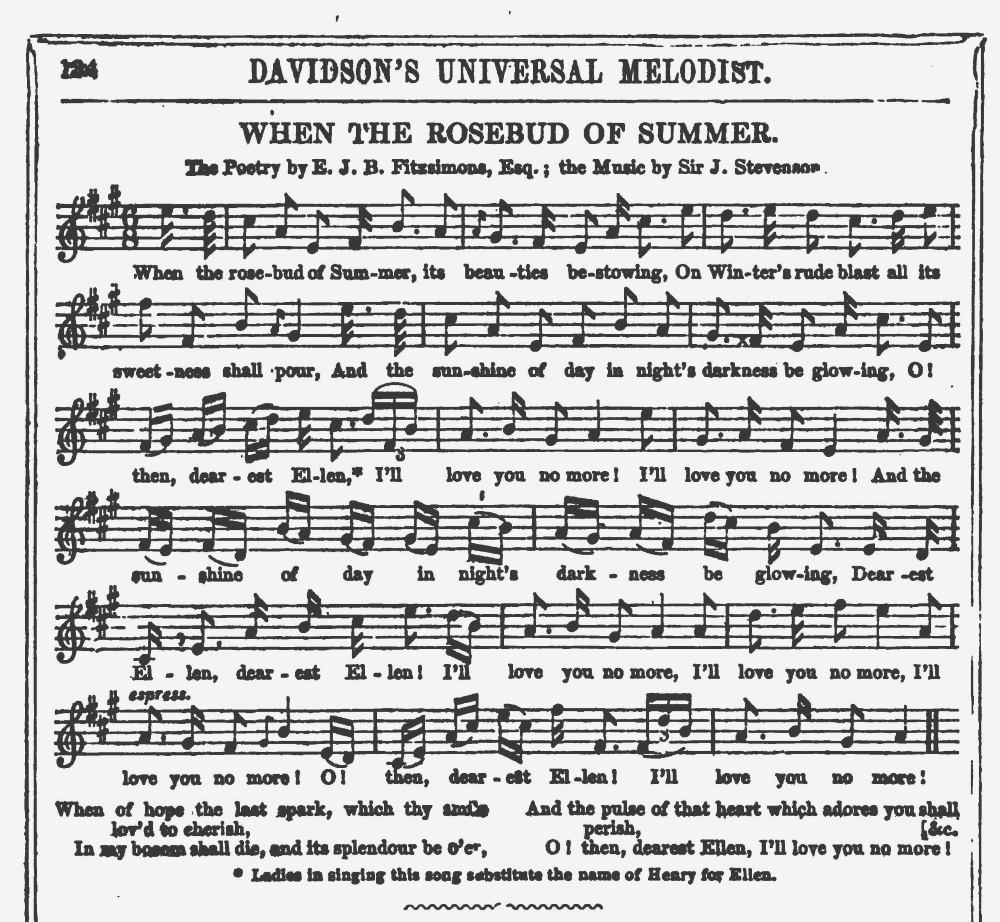
Davidson's universal melodist: consisting of the music and words of popular, standard, and original songs . . . vol. 1 (London: G. H. Davidson, 1853), 134
https://archive.org/stream/davidsonsuniver00davigoog#page/n149/mode/2up (DIGITISED)
https://books.google.com.au/books?id=zlMJAAAAQAAJ&pg=PP16 (DIGITISED)
4 COMIC SONG
PERFORMERS: Barnett Levey (vocalist)
5 COMIC SONG The Calais Packet (Trip to Calais by water)
PERFORMERS: Mr. C. EDWARDS (vocalist)
[Words only] The British minstrel, and national melodist . . . volume 1 (London: Sherwood, Gilbert, and Piper; and John Bumpus, 1827), 115
https://books.google.com.au/books?id=NrAwAAAAYAAJ&pg=PA115

"HUNTING THE HARE. Irish air. The comic song of the "Calais packet" is sung to [this] air", Hamilton's universal tune book . . . volume 2 (Glasgow: W. Hamilton, 1853), 49 (image National Library of Scotland @ Internet Archive)
https://archive.org/stream/hamiltonsunivers00ingl#page/49/mode/2up (DIGITISED)
6 SONG There's nae luck about the house
PERFORMERS: Harriet Jones (soprano vocalist)

The Scots musical museum . . . volume 1 (Edinburgh: Printed & sold by Johnson & Co., n.d.), 44 (image National Library of Scotland @ Internet Archive)
https://archive.org/stream/scotsmusicalmuse12john#page/44/mode/2up (DIGITISED)
7 SONG Home, sweet home . . . BISHOP
PERFORMERS: Harriet Jones (soprano vocalist)
8 FINALE God save the king & Rule Britannia
PERFORMERS: Band of the 3rd Regiment, master Thomas Kavanagh (clarinet)
Performers
Mr. C. Edwards (vocalist)
John Edwards (vocalist, violin)
Harriet Jones (soprano vocalist)
Barnett Levey (vocalist)
Band of the 3rd Regiment; master, Thomas Kavanagh
November
[News], The Australian (1 November 1826), 3
http://nla.gov.au/nla.news-article37071549
The Concert, which took place on Monday last, was a noisy one, for there were lots of encoring and applauding. The room was filled with company, who were in good humour and resolved to be pleased. Mrs. Jones, we suppose, netted something handsome.
"AMATEUR CONCERT", The Sydney Gazette and New South Wales Advertiser (1 November 1826), 3
http://nla.gov.au/nla.news-article2186818
The Concert, on Monday evening last for the benefit of Mrs. Jones, was most respectably attended. Wealth, beauty, and fashion were congregated together, and rendered the scene truly interesting. Civil, Naval, and Military Officers were there in abundance. In fact every thing tended to render the tout ensemble truly brilliant. The band of the Buffs commenced the evening's performance with the overture to "La Chasse," with such taste and skill as to call forth the most rapturous plaudits. Mr. Edwards followed in "I climb the highest cliffs." This gentleman is certainly a great favourite with the public, for whenever he made his entrée he was loudly cheered, and his song was enthusiastically encored. "When the Rosebud of Summer," by Mrs. Jones, was sung with the finest effect, and loudly encored. The Momus-faced favorite of Australia, Mr. Levey, sung a comic song in his usual happy style. Mr. C. Edwards too, succeeded admirably in a comic song. "There's nae luck about the house," and "Home, sweet home," by Mrs. Jones, were sweetly sung and encored, but in fact almost the whole of the singers during the evening had to repeat their performances, as they sung with the greatest taste and skill. The King's Anthem was performed by the band of the Buffs, and they closed the evening's entertainment with "Rule Britannia." This judicious compliment operated like a shock of electricity on the whole assembly, and the brave tars who were present, evinced, by their huzzas, that they were deeply sensible of the welcome they received from a people truly devoted to their king and country.
"MRS. JONES'S BENEFIT CONCERT", The Monitor (3 November 1826), 2
http://nla.gov.au/nla.news-article31757968
AN agreeable evening's entertainment was got up with much credit, on Monday evening, for the benefit of Mrs. Jones. The company assembled was, in common with those at Benefits, of a more mixed discription; but still several of the most respectable gentlemen of Sydney attended as did at number of Naval, Military, and civil officers. Our gay favourites of H. M. Navy, seemed to enjoy the good things prepared for them with hearty relish and shewed a determination with the rest of the company to be pleased; a genuine spirit of good humour prevailed throughout the evening - it was a pleasing sight to see the brave defenders of our country relaxing from the toils of war and giving way to innocent hilarity. We should suppose there were 250 persons present -
If the performance was not such as would defy criticism or please the fastidious ear of the Connoisseur, yet it was enjoyed, and that's saying every thing - One or two songs gave particular satisfaction - The old scottish ballad, "Ther's nae luck aboot the hoose" and "Sweet home," gave Mrs. Jones an opportunity of shewing her simple powers to great advantage. The latter composition is one of more than ordinary sweetness, it was received with unmingled delight - an additional verse introduced on the occasion was in unison with the general feeling:
"FAREWELL to my Cottage, to my once happy home
"Howe'er I am banished, an exile to roam:
This poor aching heart till 'tis laid in the tomb
Shall never forget the endearments of home."
A very humourous long description of the oft-times ludicrous scenes which a "Trip to Calais by water" gives rise to, entitled "The Calais Packet," was sung by an Amateur (Mr. C. Edwards,) whose truly comic style and genuine humour, almost convulsed the auditory with laughter for several minutes; it might be said with Yorick that "he set the table in a roar" - God save the King was aptly succeeded by Rule Britiannia. This national air seemed to vibrate through the hearts of the Tars with true feeling; it touched the chord upon which a British Sailor's loyalty ever rests; and three distinct cheers from the heroes present, evinced the honest sentiments which are the component parts of their disposition. The company departed about eleven o'clock highly pleased with the endeavours which had been made to afford them an evening's gratification.
[Advertisement], The Sydney Gazette and New South Wales Advertiser (8 November 1826), 1
http://nla.gov.au/nla.news-article2186870
UNDER THE PATRONAGE OF THEIR EXCELLENCIES THE GOVERNOR IN CHIEF AND MRS. DARLING
AMATEUR CONCERT, IN AID OF THE FUNDS OF THE BENEVOLENT SOCIETY.
The GENTLEMEN, composing the COMMITTEE of the SYDNEY AMATEUR CONCERT, beg to inform the Public, that a CONCERT will be held on Monday,
the 4th Day of December next, at the Court-house, in Castlereagh-street.
Several Magistrates, and other Gentlemen of the Colony, having expressed their Wish to the Committee, that such should take Place,
and having promised their Support on the Occasion, it is hoped, that the Public will give every Encouragement to promote and
Attempt to relieve the above laudable Institution.
Tickets, 10s each. may be had, on Application to Messrs. JAMES FOSTER (at Mr. Norton's Office, Elizabeth-street),
EARLE, EDWARDS, FOXALL, GEORGE PAUL, John PAUL, jun. RAPSEY, ROBERTSON, B. LEVEY, and SIPPE, George-street.
A full Account of the Performance will be inserted in next Week's papers.
"DOMESTIC INTELLIGENCE", The Monitor (10 November 1826), 2
http://nla.gov.au/nla.news-article31757972
WE praised the choir of St. James's, the other day. Since which, a tremendous roaring player of the double bass, and a change of the vocal leader for the worse, have caused us to regret our ill-timed eulogium. The great fault of church choristers is, they all try who can sing loudest, considering that the louder they sing the more astonishing. And so it is - but the converse of the rule is the true one. Every strong voice who refuses to sing under the weakest voice, should be turned out of the choir; that is, supposing the weak voices to be extensive on the gamut, and really sweet and melodious, which they generally are. By each chorister trying to sing under his neighbour, something like real harmony will be produced, while the closing swells will be at their complete command. This is the practice of the Catholic chapel, where the strains are truly heavenly. But those who wish to hear roaring singing in perfection, should attend the Macquarie-street Chapel. There, each one tries to out-do his neighbour - to the great annoyance of all musical ears, as well as to the dishonouring the worship of God. The singing at St. Phillip's is also bad - the leader has neither voice nor judgment, and his manner is too much that of a ballad-singer. Protestants care much less about honouring their maker in his Temple than their Roman brethren. To pay for good harmony is very well at a concert they think, but Protestant piety affects a kind of canting plea that music is carnal, when we intreat them to bestow a trifle to improve the mode of celebrating the praises of the Deity in the great congregation. But surely, if God be to be praised at all in singing, it ought to be performed with all the skill which can be obtained. We had rather subscribe to a weekly church concert, than the monthly one at the school-room. And instead of our chaplains declaiming against the latter, we would recommend them to go a begging, for Christ's sake, and with the money, to improve so important a part of divine worship as singing the Redeemer's praises in the loftiest strains of Handel and Mozart. They will make more converts this way than by their sermons.
[Editorial], The Monitor (10 November 1826), 3
http://nla.gov.au/nla.news-article31757977
. . . Such would be the happy way in which the Australian Senate may be expected to conduct its deliberations, when the same are laid open to the public, and when the members are found in such numbers as to make up a cheerful-looking house whenever they like. Then the ladies too will be all on our side. For when the Sessions commence, the members will of course not be so barbarous as to leave their blooming wives and daughters at home. The consequence will be, there will he lots of balls, concerts, and theatres, for the gay, and for the serious we have no doubt the Archdeacon will have sufficient zeal to order the Chaplains to open the Churches an extra night every week; at any rate we are sure the Methodist Ministers will be happy to accommodate the fair religieuse in this way. Then Sydney may expect to be a social town - then the present feuds will be all forgotten, and men will wonder what they used to be quarrelling about? - all political differences will be so qualitied and polished down by the friction of legitimate discussion, that parties will generally see that let the matter go as it may, no great convulsion in the state can be the consequence. Wise laws, freedom, prosperity, and general sociability, will gradually render New South VWales what it is intended to be by Providence - a second Britain in the Southern hemisphere . . .
"AUSTRALASIAN POLITICS", The Sydney Gazette and New South Wales Advertiser (11 November 1826), 2
http://nla.gov.au/nla.news-article2186895
Mrs. Paul has, in the handsomest manner, offered her powerful aid at the approaching Concert for the Benevolent Society. A Gentleman too, of whom report speaks highly as a vocalist, residing, we believe, in Campbell Town, will also afford his assistance; and when the constellation of talent, which is combined amongst the regular Members of the Amateur Concert, all of whom lend their support on the occasion, is remembered, a more than usually excellent musical treat, may very fairly be anticipated.
"To the EDITOR of . . .", The Monitor (17 November 1826), 7
http://nla.gov.au/nla.news-article31757982
SIR, NOT only does the idea of Theatricals occasion a panic among the bigots of the colony, but every description of amusement, however axiomatically innocent and rational, gives rise to the most serious alarm for the salvation of souls. A sufficiently clever fellow, named Cyx defines the non-impropriety of theatres very clearly; his letter cannot possibly fail of giving satisfaction and annoyance, - satisfaction to the followers of reason, (and religion also, for the two are in perfect consonance) and annoyance to the fanatic misrepresenters of Christianity. The prime objection, it would appear, to the drama is, that among a numerous assemblage much dissipation and vice must infallibly occur. Now, I believe that no nation can exist without public conventions, in some shape or other; and that so long as man possesses his present passions, - so long will vice continue, and be more conspicuous, though less in reality in a public assembly than in private life. If men go not to a theatre, they will to a pot house.
BUT the more inveterate of the bigots, contradict even the propriety of the drama itself - setting altogether aside the concomitant vices. Upon what grounds I am at a loss to conceive, nor do I care. As I before hinted, in a former letter, I consider that the brains of all the great men of ancient and modern ages, would outweigh those of a very few distracted sectarians? My present purpose, however, is not to shew the propriety of theatricals. I would only express my fervent hope, that any amusement which may be formed for the recreation of the people, may not be destroyed by ecclesiastical interposition, Let the bigots, by all and every means, cry down the immemorial amusements of man, in their pulpits; let them bitterly inveigh against the customs, not only of Englishmen, but of all the world; let them inculcate doctrines to subvert every ennobling disposition of the soul, and render men legally honest, avaricious, and hypocritical; let them do all this in their tabernacles, and no harm shall be done; because you or I are at liberty to go or stay away, as it seemeth meet; but let them have no political influence, (which I fear to be the case) in removing the cause of pleasure to the people, and of frivolous vexation to them. Enlightened reformers of the Church of Rome! Protestants against the superstition, mental slavery, and bigotry, of the Holy See!! The world in Anno Domini 1826, are not fools.
Again, the Amateur Concert. Why the bigots seem to consider it, A society for the encouragement of vice absolutely.
I'll tell you what, Sir, I have six daughters, (handsome enough too, vanity apart), six, Sir, and I have, with one exception, taken them to every concert.
We met friends, and people who were not friends.
The former we spoke to, the latter we looked at.
The music delighted us, (though several good judges pronounced it with a critical air to be vile,) and served as a topic for conversation next day.
Now, what possible harm could accrue to me, my wife, (a woman far beyond the meridian of life,) and my six daughters?
'Tis true some people talked of other some people, who had no right to be there,
(though these latter people I saw at church when last there); but what cared I for that.
I came, away as uncontaminated as I went. -
Mr. Editor, with increasing admiration and respect,
because I believe you to be the friend of the peeple,
I remain, Your very obedient Servant,
X. Y. Z.
ASSOCIATIONS: "X. Y. Z." = Alexander Macleay (colonial secretary of NSW, arrived Sydney, January 1826), his wife Elizabeth, and six daughters, Frances, Christiana, Margaret, Kenethina, Rosa Roberta, and Barbara
"DOMESTIC INTELLIGENCE", The Monitor (17 November 1826), 2
http://nla.gov.au/nla.news-article31757994
THE managing Committee of the Amateur Concert have with a praise worthy spirit resolved upon preparing an Evening's Entertainment for the Benefit of the Benevolent Society. The Concert which will take place on the 4th of December will combine every possible novelty and attraction, with a greater degree of scrutiny in the disposal of the Tickets; and, from the fact of the performance being already in rehearsal, a delectable Evening's recreation may be anticipated. In so good a cause we hope to see many and liberal supporters. The high price of the tickets will accomplish two good ends not necessary here to be specified.
[Advertisement], The Monitor (17 November 1826), 5
http://nla.gov.au/nla.news-article31757986
UNDER THE PATRONAGE OF THEIR EXCELLENCIES THE GOVERNOR IN CHIEF AND MRS. DARLING.
AMATEUR CONCERT,
In Aid of the Funds of the Benevolent Society.
THE Gentlemen composing the Committee of the Sydney Amateur Concert,
beg to inform the Public that a Concert will be held on Monday, the 4th of December next, at the Court House, Castlereagh Street.
Several of the magistrates, and other gentlemen of the Colony, having expressed their wish to the Committee that such should take place;
and having promised their support on this occasion, it is hoped that the Public will give every encouragement to promote an attempt to relieve the above laudable Institution.
ACT I.
Overture.- "Zauberflote" MOZART.
Glee.- "Ye Mariners of England." DR. KEMP.
Song. - "Flow those Regal Purple Streams." Dr. ARNOLD.
Duet. - "When thy Bosom heaves the Sigh." BRAHAM.
Song. - "The Storm."
Song. - "Bid me Discourse," BISHOP.
Pot Pourri. - Violin FESCA.
Glee. - "The Chough and Crow." BISHOP.
ACT II.
Overture. - "Der Freyschutz." WEBER.
Song. - "I ne'er will cease to Love." PARRY.
Quartetto. - Flute, Violin, Tenor, and Violincello PLEYEL.
Song - "The Soldier tir'd." Dr. ARNE.
Song. - "Our Country is our Ship." DIBDIN.
Glee. - "Hark the Lark at Heaven's Gate Sings." Dr. COOKE.
Duet.- "Eagle Wings the Clouds impelling." Mr. P. KING.
Finale. - " God Save the King."
Tickets, 10s. each, may be had on application to Messrs. James Foster, (at Mr. Norton's Office, Elizabeth Street) Earle, Edwards, Foxall, George Paul, John Paul. Jun. Rapsey, Roberts, B. Levey, and Sippe, George Street.
[Advertisement], The Australian (18 November 1826), 1
http://nla.gov.au/nla.news-article37071910
[Advertisement], The Sydney Gazette and New South Wales Advertiser (18 November 1826), 1
http://nla.gov.au/nla.news-article2186929
[News], The Australian (22 November 1826), 3
http://nla.gov.au/nla.news-article37074092
The Amateur Benefit Concert, in aid of the Funds of the Benevolent Assylum, will, in all probability, be liberally patronised.
[News], The Monitor (24 November 1826), 5
http://nla.gov.au/nla.news-article31758003
EXTENSIVE preparations are making for the accomodation of His Excellency the Governor and suite,
the Honourable. Mr. McLeay and family and a dignified circle of fashionables,
who intend honouring the next Amateur Concert with their presence.
The following is the cast of songs. -
Glee "Ye mariners of England" by Mrs. Paul and Messrs. Edwards and Clarke;
"Flow thou regal purple Streams," Mr. Edwards;
"When thy bosom heaves the sigh" Mrs. Paul, and Messrs. Scarr and Edwards;
"The Storm", Mr. Levey;
"Bid me discourse," Mrs. Paul;
"The Chough and crow," Mrs. Paul, and Messrs. Scarr and Edwards;
"I ne'er will cease to love," Mr. Clarke;
"The soldier tired," Mrs. Paul;
"Our country is our ship," Mr. Levey;
"Hark the lark," Mrs. Paul; and Messrs. Edwards, Clarke, and Scarr;
"Eagle wings the clouds impelling," Mrs. Paul, and Mr. Edwards.
ASSOCIATIONS: Alexander Macleay (colonial secretary of NSW) and family
"TO THE EDITOR OF . . .", The Sydney Gazette and New South Wales Advertiser (25 November 1826), 3
http://nla.gov.au/nla.news-article2186987
Sir, I did intend taking 50 Tickets, in aid of the Benevolent Funds, for my Friends, at the coming Amateur Concert,
but understanding that Mrs. Jones, from illiberal and gross private pique, mixed up with envy, is not allowed to bear part in the amusements of the evening,
I beg to inform the Gentlemen of the Committee, and through them the Public that I shall keep my money, unless the wishes of a great part of the community are gratified.
AUSTRALASIATICUS. Nov. 24, 1826.
ASSOCIATIONS: The native-born Australian poet, Charles Tompson used the pen-name "Australasianus" [sic] for several poems sent to the Sydney press in 1823-24; someone using the pen-name "Australasiaticus", and evidently also native born, also contributed a poem to the Gazette in 1829.
December
[Advertisement], The Sydney Gazette and New South Wales Advertiser (2 December 1826), 3
http://nla.gov.au/nla.news-article2187030
UNDER THE PATRONAGE AND SANCTION OF MRS. DARLING.
MRS. BODENHAM, respectfully Announces to the Ladies of Sydney, that her Private ROOMS will be OPENED on Monday next,
with an Elegant and Fashionable Assortment of MILLINERY, comprising ball,
concert, evening, carriage, and walking dresses, pelisses, spencers, bonnets, caps, veils,
&c. with a variety of tasteful Gauzes, and Ladies' shoes.
Sir John Jamison's New Buildings, George-street, 2d Dec. 1826.
ASSOCIATIONS: Mrs. Thomas Bodenham, who arrived with her husband and family from London, on the Medora, in October, was a neighbour of Tempest Paul and her husband
[News], The Australian (2 December 1826), 3
http://nla.gov.au/nla.news-article37073149
We understand, in addition to the beautiful selection of music advertised for Monday evening's concert, for the benefit of the Benevolent Institution, Mrs. Paul has been particularly requested to sing the much admired ballad of Cherry Ripe, sung by Madame Vestris with universal applause.
ASSOCIATIONS: Lucia Vestris (English vocalist)
[News], The Sydney Gazette and New South Wales Advertiser (2 December 1826), 3
http://nla.gov.au/nla.news-article2187038
The Concert, on Monday evening next, in aid of the funds of the Benevolent Society, promises to present a more than usually rich treat. The selections for the occasion are of a more varied description than those of any previous evening; and the number of songs, &c. allotted to Mrs. Paul, who has so handsomely volunteered her services, should, and we have little doubt will, even were there not a charitable inducement, draw together a large assemblage of rank and fashion to listen to the mellifluous strains of the Catalani of Australia.
ASSOCIATIONS: Reference to Angelica Catalani (Italian vocalist active in Britain)
CONCERT 11
Monday, 4 December 1826
School Room, Old Court House, Castlereagh Street, Sydney
Program
ACT I
1 OVERTURE Die Zauberflöte . . . MOZART
2 GLEE Ye mariners of England (Ye gentlemen of England) . . . John Wall CALLCOTT (? KEMP)
PERFORMERS: Mr. Clarke (tenor vocalist); John Edwards (bass vocalist), ? Tempest Margaret Paul (vocalist); George Sippe (pianoforte)
Ye gentlemen of England, composed by Callcott (Philadelphia: G. E. Blake, n.d.) (image courtesy of the Lester S. Levy Collection of Sheet Music, The Sheridan Libraries, The Johns Hopkins University)
https://levysheetmusic.mse.jhu.edu/collection/113/096 (DIGITISED)
The British minstrel, and musical and literary miscellany, vol. 3 (Glasgow: William Hamilton, n.d.), 34
https://archive.org/stream/britishminstrelm00glas#page/34/mode/2up (DIGITISED)
3 SONG Flow thou regal purple stream (from The castle of Andalusia) . . . Samuel ARNOLD
PERFORMERS: John Edwards (bass vocalist); George Sippe (pianoforte)
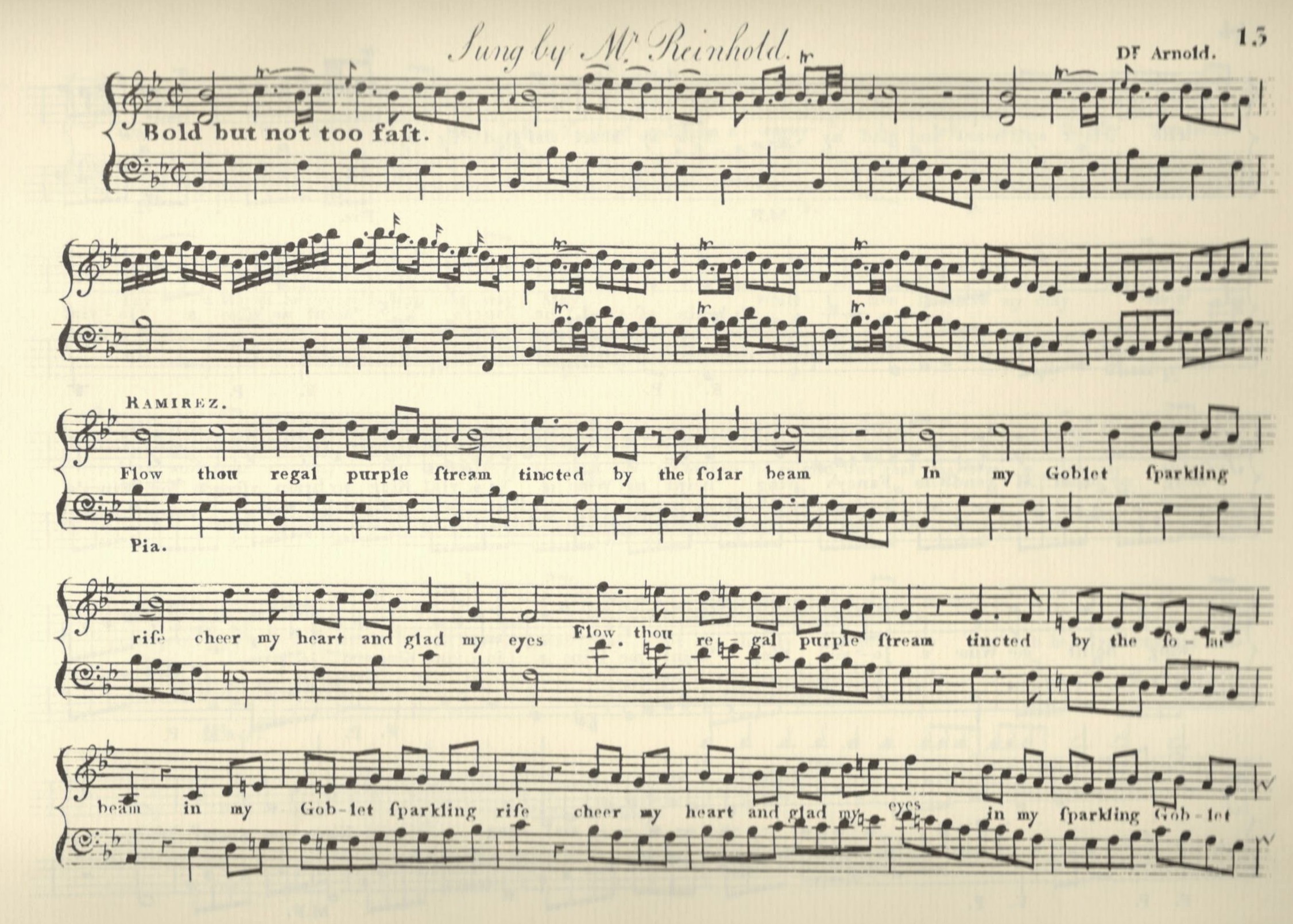
The castle of Andalusia, a comic opera as it is performed with universal applause, at the Theatre Royal in Covent Garden, the selected airs by Handel, Giordani, Giardini, Vento, Bertoni, Dr. Arne and Carolan the Irish bard, the overture, chorusses, new airs &c. composed by Doctor Arnold (London: J. Bland, 1782), 13-15
[Wordbook], The castle of Andalusia, a comic opera in three acts, as it is performed at the theatres in London and Dublin by John O'Keefe, esqr. (n.p., s.n., 1783)
https://books.google.com.au/books?id=HiRhAAAAcAAJ&pg=PA5 (DIGITISED)
[Melody and words only], The sky-lark, a collection of songs set to music (London: Published by Thos. Tegg, 1825), 84-86 (National Library of Scotland)
https://archive.org/stream/skylarkcollectio00lond#page/84/mode/2up (DIGITISED)
http://digital.nls.uk/special-collections-of-printed-music/pageturner.cfm?id=87682336
Flow thou regal purple stream (Arnold) (Columbia # A2047 46670 Louis Graveure - Baritone solo = undated)
https://archive.org/details/FlowThouRegalPurpleStream (SOUND FILE)
4 DUET When thy bosom heaves the sigh (from the opera Narensky) . . . John BRAHAM
PERFORMERS: John Edwards (bass vocalist); Tempest Margaret Paul (soprano vocalist); George Sippe (pianoforte)
When thy bosom heaves the sigh, a duett, from the opera of Narensky, composed by Mr. Braham (Philadelphia: G. Willig, n.d.)
http://levysheetmusic.mse.jhu.edu/collection/113/076 (DIGITISED)
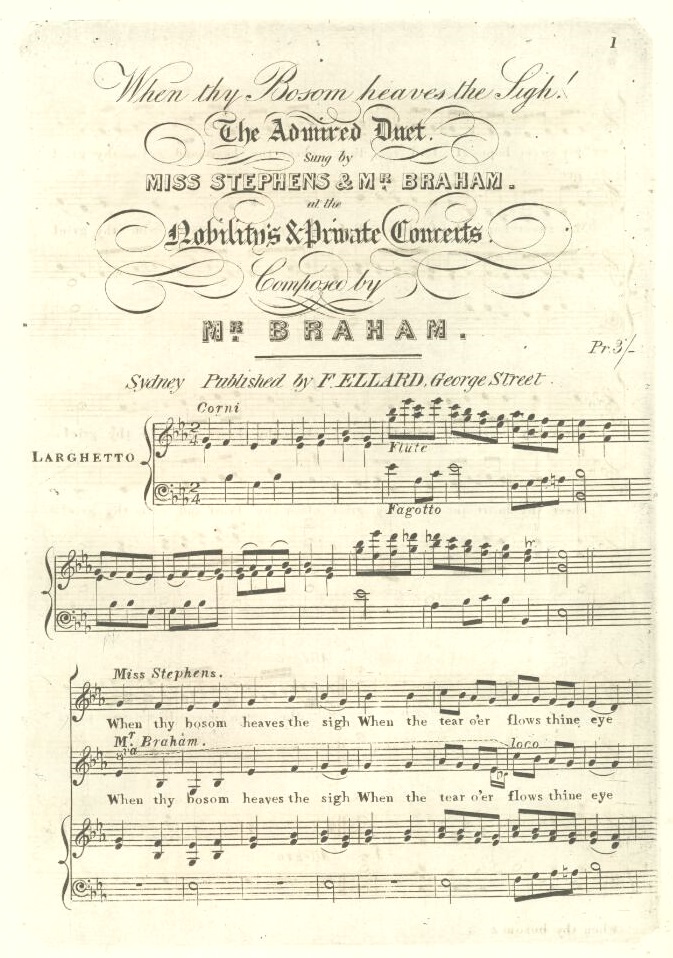
When thy bosom heaves the sigh! the admired duet sung by Miss Stephens & Mr. Braham at the nobility's & private concerts, composed by Mr. Braham (Sydney: F. Ellard, n.d.) (image National Library of Australia)
http://nla.gov.au/nla.obj-166045631 (DIGITISED)
5 SONG The Storm (Cease, rude Boreas, blustering railer) . . . probably Richard LEVERIDGE
PERFORMERS: Barnett Levey (vocalist)
Words by George Alexander Stevens; music attributed to Richard Leveridge
Cease, rude Boreas, the celebrated storm song, written and composed by Dibdin (Boston: Parker & Ditson, n.d.) (image courtesy of the Lester S. Levy Collection of Sheet Music, The Sheridan Libraries, The Johns Hopkins University)
http://levysheetmusic.mse.jhu.edu/collection/181/050 (DIGITISED)
A collection of national English airs, consisting of ancient song, ballad, & dance tunes interspersed with remarks and anecdote (London: Chappell, 1840), music volume, 5 (number 8); commentary volume, 35-36
https://archive.org/stream/collectionofnati00crot#page/n23/mode/2up (DIGITISED)
https://archive.org/stream/collectionofnati00crot#page/34/mode/2up (DIGITISED)
6 SONG Bid me discourse . . . BISHOP
PERFORMERS: Tempest Margaret Paul (vocalist, pianoforte)
Bid me discourse, sung by Mrs. De Luce, composed by Henry R. Bishop (New York: Dubois & Stodart, n.d.) (image courtesy of the Lester S. Levy Collection of Sheet Music, The Sheridan Libraries, The Johns Hopkins University)
http://levysheetmusic.mse.jhu.edu/collection/108/059 (DIGITISED)
Bid me discourse, Henry Rowley Bishop, Nellie Melba (The London Recordings 1904-1926, Mastercorp 2010)
7 POT POURRI Violin . . . Friedrich Ernst FESCA (1789-1826)
PERFORMERS: John Edwards (violin)
The piece in question would have been all or part of one of Fesca's two string potpourris, both of which are essentially works for violin with trio accompaniment.

[No. 1 in C major] Pot-pourri pour deux violins, alto, et violoncello . . . par F. E. Fesca, oeuvre 6 (Vienna: Pietro Mechetti quo. Carlo, n.d.) (image Munich, Bayerische StaatsBibliotek digital)
https://archive.org/details/imslp-no1-in-c-major-op6a-fesca-friedrich-ernst
[No. 2 in B flat major] Potpourri pour le violon avec accompagnement de violon, viola et violoncelle, oeuv. 11 (Leipzig: C. F. Peters, [1818]) (Munich, BSB)
http://www.mdz-nbn-resolving.de/urn/resolver.pl?urn=urn:nbn:de:bvb:12-bsb11147757-3
"Memoir of Friedrich Ernst Fesca", The harmonicon 5/1 (1827), 39-41
https://books.google.com.au/books?id=7uYqAAAAYAAJ&pg=PA41
8 GLEE The chough and crow . . . BISHOP
PERFORMERS: John Edwards (bass vocalist);
Tempest Margaret Paul (soprano vocalist);
John Scarr (vocalist);
George Sippe (pianoforte)
ACT II
9 OVERTURE Der Freyschütz . . . Carl Maria von WEBER
PERFORMERS: Wind band; George Sippe, leader/director
10 SONG I ne'er will cease to love . . . John PARRY (1776-1851)
PERFORMERS: Mr. Clarke (tenor vocalist); George Sippe (pianoforte)
10a (encore) SONG O Rosa, when you quit the spot
(Mr. Clarke, vocalist; George Sippe, pianoforte)
11 QUARTETTO Flute, violin, tenor, and violincello . . . Ignaz PLEYEL
PERFORMERS: Joshua Frey Josephson (flute); John Edwards (violin); George Sippe (? cello)
12 SONG The soldier tir'd . . . Thomas ARNE
PERFORMERS: Tempest Margaret Paul (vocalist, pianoforte)
12a (encore) SONG Cherry ripe (from Paul Pry) . . . Charles Edward HORN (1786-1849)
PERFORMERS: Tempest Margaret Paul (vocalist, pianoforte)
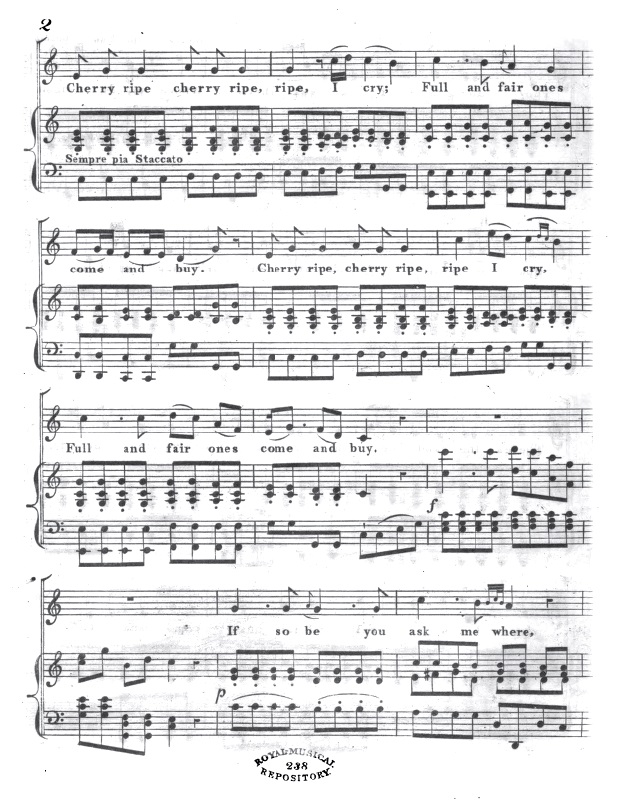
Cherry ripe: a cavatina, sung with the most rapturous applause by Madame Vestris in Mr. Poole's popular comedy Paul Pry . . . by C. E. Horn (London: J. Willis, [1824]) (image Munich, Bayerische StaatsBibliotek digital @ Google books)
http://opacplus.bsb-muenchen.de/title/BV007814552/ft/bsb11149191?page=1 (DIGITISED)
https://books.google.com.au/books?id=N5BkAAAAcAAJ (DIGITISED)
13 SONG Our country is our ship (from The Cherokee) . . . Stephen STORACE
PERFORMERS: Barnett Levey (vocalist)
[Words only], Thomas Dibdin (ed.), Songs, naval and national of the late Charles Dibdin, with a memoir and addenda (London: John Murray, 1841), 298
https://books.google.com.au/books?id=a3PYAAAAMAAJ&pg=PA298 (DIGITISED)
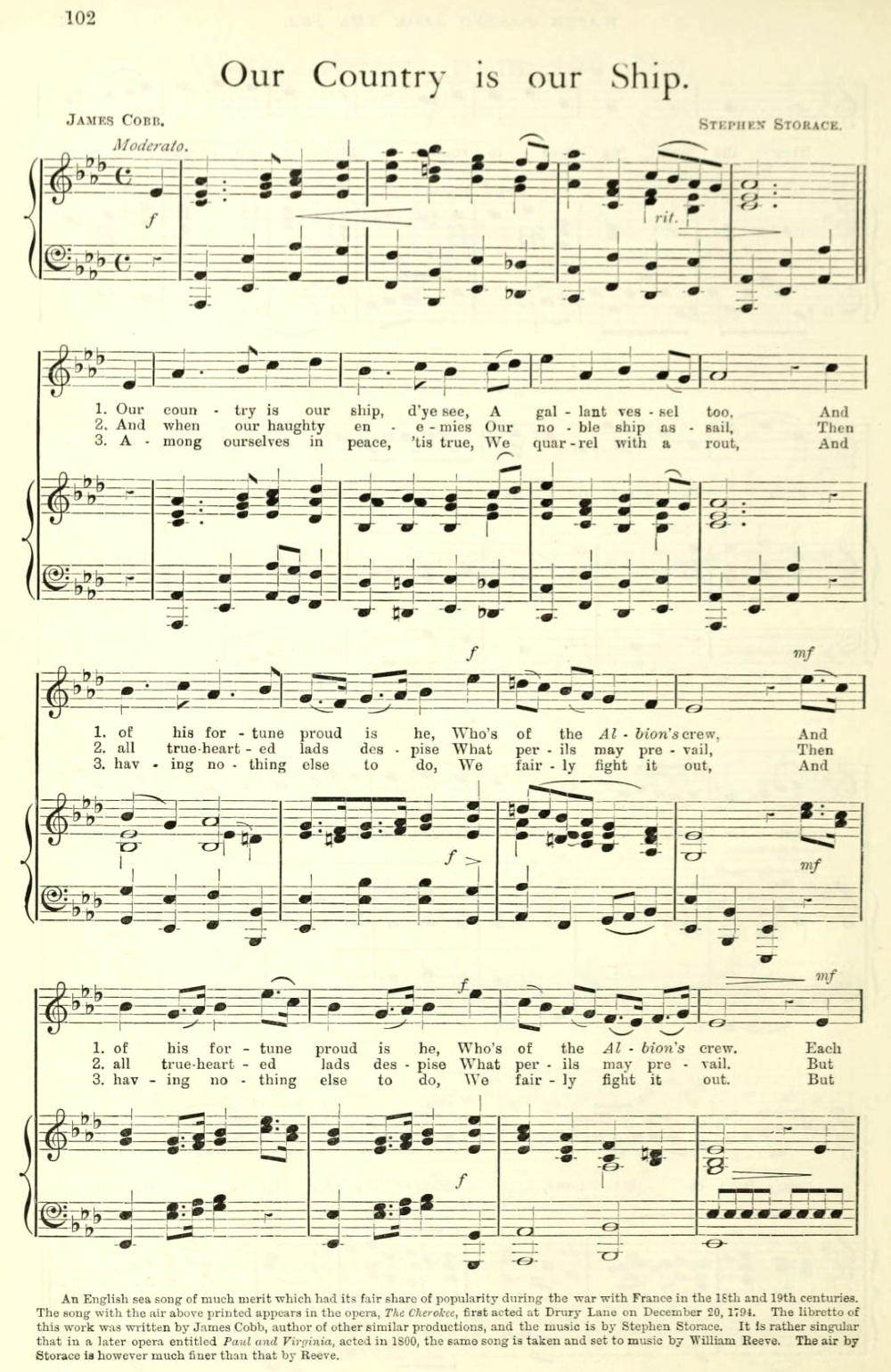
Alfred Moffat and Frank Kidson, English songs of the Georgian period, a collection of 200 songs (London: Bayley & Ferguson, 1907), 102-103
https://archive.org/stream/englishsongsofge00moff#page/102/mode/2up (DIGITISED)
14 GLEE Hark, hark the lark at heaven's gate sings . . . Benjamin COOKE (1734-1793)
PERFORMERS: Mr. Clarke (tenor vocalist); John Edwards (bass vocalist); ? Tempest Margaret Paul (soprano vocalist); John Scarr (vocalist)
A collection of duets, rotas, canons, catches & glees selected for, and most respectfully inscribed to, the members of the Bristol Catch Club, and the Cecilian Society (London: Broderip, 1795)
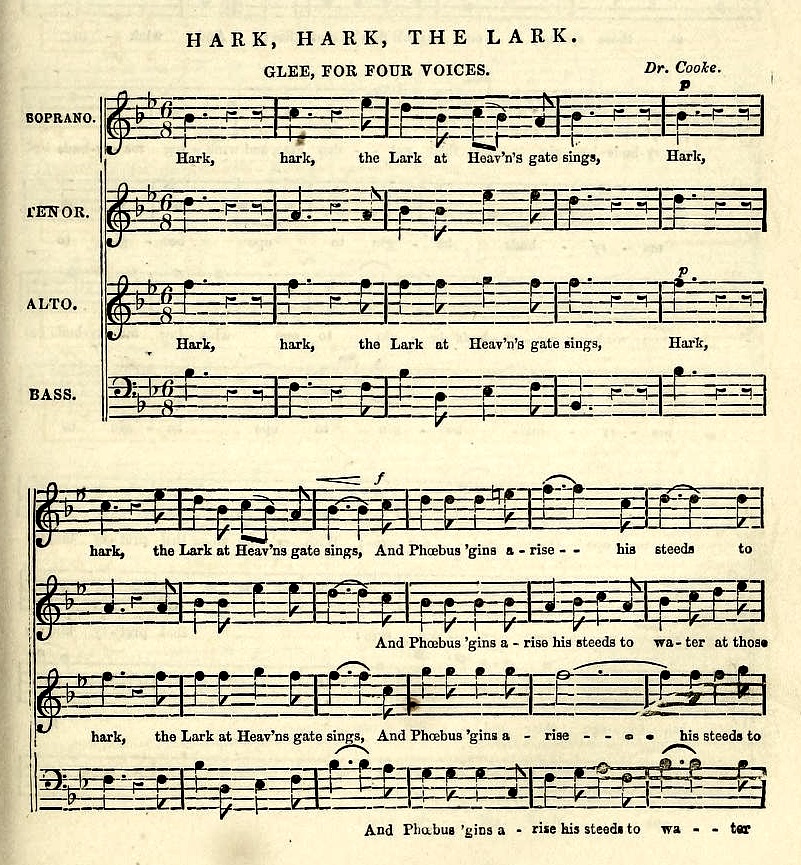
The British minstrel, and musical and literary miscellany . . . vol. 1 (Glasgow: William Hamilton, [1845]), 65-67 (image National Library of Scotland @ Internet Archive)
https://archive.org/stream/britishminstrelm00glas#page/n71/mode/2up (DIGITISED)
15 DUET Eagle wings the clouds impelling (from Timour the Tartar) . . . Matthew Peter KING (c. 1773-1823)
PERFORMERS: John Edwards (bass vocalist); Tempest Margaret Paul (soprano vocalist); George Sippe, pianoforte)
[Wordbook], Timour the tartar, a grand romantic melo drama in two acts by M. G. Lewis . . . printed from the acting copy . . . (New York: E. D. Clayton, 1830), 37
https://archive.org/stream/timourtartaragr00claygoog#page/n42/mode/2up (DIGITISED)
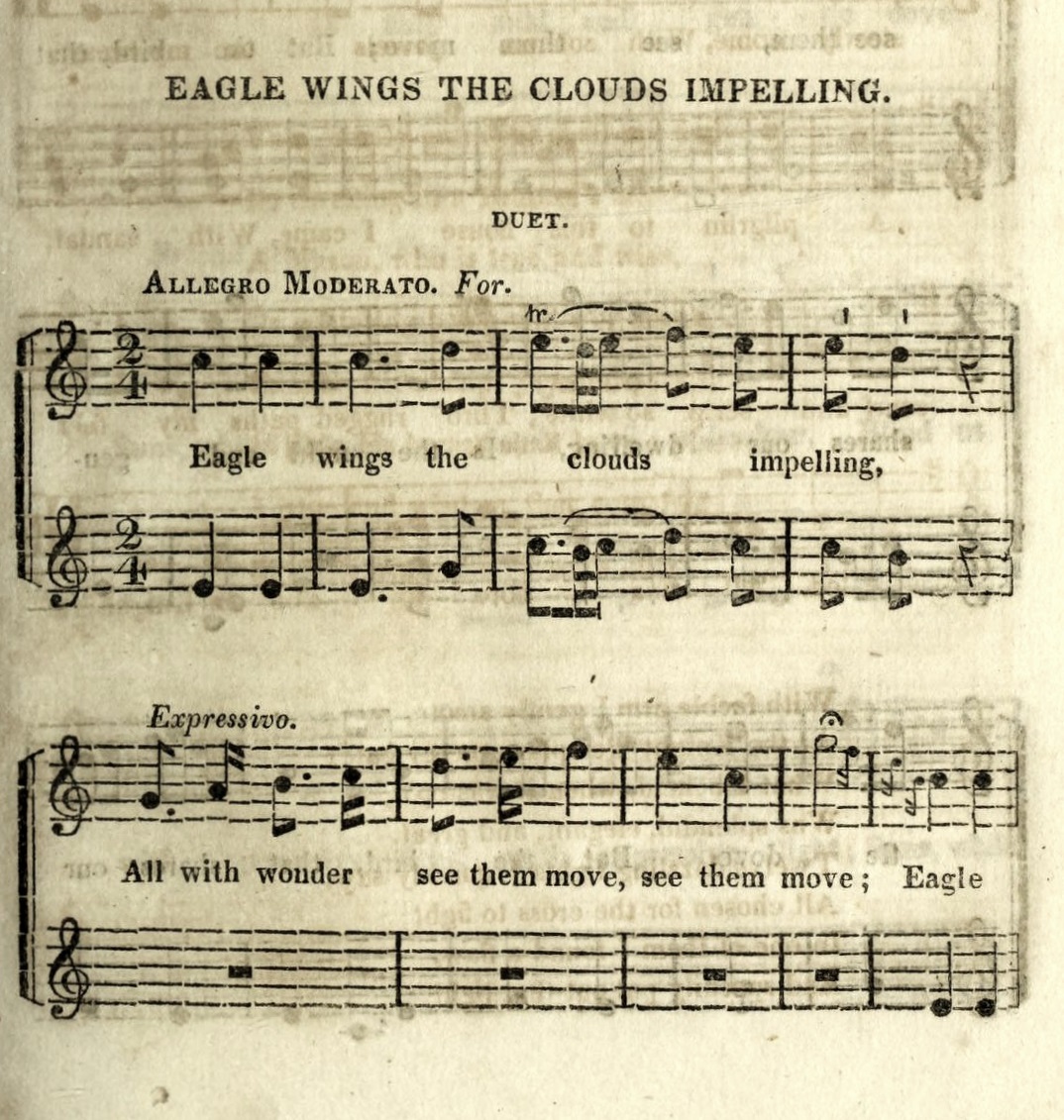
Luke Eastman (ed.), Masonick melodies: being a choice selection of the most approved masonick songs, duets, glees, catches, cannons, hymns, odes, dirges and choruses (Boston: Printed for the author by T. Row, 1818), 125-29
https://archive.org/stream/masonickmelodies00east#page/124/mode/2up (DIGITISED)
16 FINALE God save the king
PERFORMERS: Orchestra / band
Performers
Mr. Clarke (tenor vocalist)
John Edwards (bass vocalist, violin)
Joshua Frey Josephson (flute)
Barnett Levey (vocalist)
Tempest Margaret Paul (soprano vocalist, pianoforte)
John Scarr (vocalist)
George Sippe (pianoforte)
Band of the 57th Regiment; master, George Sippe
? Band of the 3rd Regiment; master, Thomas Kavanagh
Letter, colonel Henry Dumaresq, to his mother, Government House, Sydney, 4 December 1826 (State Library of New South Wales, Dumaresq Letters, ADLIB, MS A 2571, 10-
http://archival.sl.nsw.gov.au/Details/archive/110363885
N. South Wales, 4th December 1826.
My dear Mother, We learnt, just before we sat down to dinner to day, that a Vessel will leave this [sic] for England tomorrow morning.
We have various matters of much moment to write about.
And while Eliza and all the Party, but the Governor and myself, and clerks who are writing away at my elbow, are at a Concert,
given in aid of the Funds for the Benevolent Asylum, and patronised by the Governor and Eliza - we are scribbling away, in order to be in time for the said Vessel.
It has happened inopportunely, and I have used a good Deal of persuasion, to no purpose, to endeavour to get the General to shew himself -
and I regret that he has not done so - I would have had him do this, if only for 5 minutes -
and we have the night before us - but where is the use of saying anything about it? . . .
ASSOCIATIONS: Henry Dumaresq reports on his sister, Eliza Darling's attendance at the concert, and governor Ralph Darling's failure to accompany her, evidently eager for any excuse not to have to attend
"The Concert", The Sydney Gazette and New South Wales Advertiser (6 December 1826), 3
http://nla.gov.au/nla.news-article2187054
The Concert
None should attend a Concert without feeling with the Poet
"We love a Concert! there's such an air
Of magic in the lustres' glare,
And such a spell of witchery
In all we hear, and all we see;
While merry voices echo round,
And Music's most inviting sound
Swells on the ear; the glances fly,
And Love and Folly flutter high,
And looks are kind, and eyes are bright,
And tongues are free, and hearts are light."
But, notwithstanding this affection for Concerts, we never have to describe one without an inclination to parody the melancholy remark of Solomon, from a distressing feeling that, so far as relates to them, "the thing which is said, is that which hath been said, and there is nothing new to be said under the sun;" so that we shall do little more than observe that, on Monday evening last, the company present were numerous and highly select, and that, as usual, the brilliancy of the lights could only be out-sparkled by the brightness of the ladies' eyes - a remark so trite, that it could never have passed current so long, but from a conviction in the breasts of all men of its intrinsic truth. We hope the Ladies will not think we have said too much on the subject; if they do, however, the error, we trust, is sufficiently venial to admit of the consolation, that
'Tis pleasing to be schooled
By female lips and eyes---
They smile so when one's right, and when one's wrong
They smile still more.
Having thus paid homage where it was due, we will now proceed, somewhat briefly, to notice the performances on the occasion. Mrs. Paul was the great attraction of the evening, and certainly fully sustained that fame she has so justly acquired. Her songs "Bid me discourse," the "Soldier tired," and a pretty ballad called "Cherry ripe," all of which were rapturously encored, were given in a superior style of excellence that was not a little heightened by the scientific manner in which they were accompanied by the lady herself on the piano-forte. Mr. Edwards was, as he always is, excellent in his performances. A Solo on the violin composed by Fesca was performed by that gentleman in a style of masterly execution, which could not fail of exciting in his hearers a high opinion of his talents as a musician. A Mr. Scarr appeared this evening for the first time. His voice is not devoid of sweetness, nor uncultivated, but it wants the softness of Mr. Clark's tones, for which reason, we think, the parts sustained in the glees by the former, would have been more effectively performed by the latter gentleman, whose voice, in our opinion, would have harmonized better with those of Mrs. Paul and Mr. Edwards. The general favourite, Mr. B. Levey, was also greeted with universal plaudits in the course of his exertions.
Of the instrumental pieces, the first in point of interest was the Overture to Der Freychutz, which, making every allowance for the limited extent of the band, notwithstanding a considerable accession on the occasion of instrumental performers which the Orchestra presented, was performed in a very creditable style; a band, numerous and complete in all its parts, however, is a sine qua non when such a piece is to be performed. It is a splendid composition, and we should search in vain for a similar combination of various and forcible expression. The partiality of the Germans for wind instruments, for which this Overture is solely arranged, is proverbial, and the splendid and original harmonic combinations, with the wild and stormy character of the composition, affords an admirable field for this species of display.
The other entertainments of the evening were gone through in a highly respectable manner, and the National Anthem was played as a finale about eleven o'clock.
We have now, we believe, taken a sort of bird's eye view of the amusements of a very pleasant evening, without any omissions save those which restricted space compelled us to adopt; but, should any whose labours have not been mentioned be surprised, we beg leave to address them in the language of the Satirist:-
"Lord! cries an amateur with open mouth,
Gaping for praise, like a young crow for meat,
Lord! why you have not mentioned me!
Mention thee! ! !
Thy impudence hath put me in a sweat.
What rage for fame attends both great and small!
Better be damned than not be named at all."
Amongst the brilliant party who honoured the Concert with their presence this evening, were Mrs. Darling, Mrs. and the Misses McLeay, Miss Shadforth, the Misses Blaxland, Sec. &c., the Colonial Secretary, the Chief Justice, Colonel and Capt. Dumaresq, Lieutenant de le Condamine, Colonel Shadforth, the Brigade Major, Capt. Piper, Dr. Douglass, several of the Naval Officers, English and French, &c. &c. &c.
ASSOCIATIONS: Thomas Condamine (57th Regiment); Francis Forbes (chief justice)
"SYDNEY AMATEUR CONCERT", The Australian (6 December 1826), 3
http://nla.gov.au/nla.news-article37073073
The Concert on Monday evening, in aid of the Funds of the Benevolent Institution, was as numerously and as flatteringly attended as the most sanguine friends of the Institution could possibly hope for. Mrs. Paul was a great point of attraction during the evening; her songs were followed with loud plaudits by the audience. Mr. Clarke's, "I ne'er will cease to love", deserved warm eulogium, it was called for a second time. The Overture of Der Freschetyz was played in the course of the evening. Mr. B. Levey's song the "Storm", was a failure, but he recovered himself in a medley introduced in the second part. A Mr. Scarr appeared in the Orchestre; this gentleman attempted some airs; but he was not quite fortunate. Mr. S. is a good instrumental performer. The entire performance was not over before 12 o'clock. The company were much more numerous than on any former Concert. There were present, Mrs. Darling, Mrs. McLeay, &c. the Misses McLeays, &c. and Chief Justice Forbes; Colonels, Shadforth and Mills; Captains, Dumaresq, Piper, and Gillman, &c. &c. &c.
"THE CONCERT", The Monitor (8 December 1826), 3
http://nla.gov.au/nla.news-article31758037
We have received the following account of the Concert which took place on Monday evening last, for the benefit of the Benevolent Society.-
"A bright halo was diffused over the elegant and select assemblage that graced the Concert-room on Monday evening, by the presence of a dignified coterie of the beau-monde, who condescendingly patronised the laudable efforts made by the Amateur Committee to promote public charity, and for whose accommodation temporary seats were erected, and were occupied by the amiable consort of His Excellency the Governor; Chief-Justice Forbes; the Hon. Mr. McLeay and family; the blooming daughters of Australia, the Misses Blaxland's; the Naval Officers; the Brigade Major and lady; the Chief Engineer; several magistrates, &c. &c. &c. The company was select.
Mrs. Paul took a leading part in every duet. A very popular air now singing in London by Madame Vestris, "Cherry Ripe," was rapturously encored, as was a pathetic ballad "Oh Rosa, when you quit the spot," in which the protege of public favour, Mr. Clarke, came off with distinguished eclat. Mr. Scarr, an amateur of talent, acquitted himself respectably; and "Flow thou regal purple stream," gave Mr. Edwards scope for the display of his superior science. The arrangement of the overture of Der Freischutz, which gave marked satisfaction on a former evening, did credit to the professional skill of Mr. Sippe."
ASSOCIATIONS: The Misses Blaxland, some or all of the six daughters of John and Harriet Blaxland, Harriet, Anna, Jane, Louisa, Elizabeth, and Mary (see here for biographical details)
[Advertisement], The Monitor (22 December 1826), 1
http://nla.gov.au/nla.news-article31758073
SUBSCRIPTION CONCERT.
MR. CLARKE respectfully informs the Ladies and Gentlemen of Sydney, that the Amateur Concerts having closed,
for the Season, he intends preparing a Musical Performance for their Entertainment during the Holidays,
when the Gentlemen Amateurs whose exertions for the Public Amusement have been so flatteringly received, have obligingly promised their aid.
[News], The Sydney Gazette and New South Wales Advertiser (27 December 1826), 2
http://nla.gov.au/nla.news-article2187194
Several Subscription Concerts, we understand, are about to be got up for the amusement of the pleasure-loving folks, during the holidays. Vive la bagatelle.
[News], The Monitor (29 December 1826), 5
http://nla.gov.au/nla.news-article31758082
Mr. CLARKE notifies his intention of filling up the vacuum of the Christmas holidays and dispelling the ennui which in these dull times prevails by preparing a musical entertainment at Mr. Lord's Rooms on Tuesday the ninth of January. The application of parties for tickets to be first submitted to a committee, in order to make this concert select.
[Advertisement], The Australian (30 December 1826), 2
http://nla.gov.au/nla.news-article37073773
SUBSCRIPTION CONCERT,
MR. LORD'S ROOMS, MACQUARIE PLACE.
MR. CLARKE HAS THE HONOR T0 announce to the Lovers of Harmony, that Tuesday, the 9th of January, 1827,
is fixed for the next Concert, for which a very choice selection of musical pieces, vocal and instrumental, are in rehearsal.
In course of the evening, Mr. C. will introduce, by desire, Braham's much-admired Scottish ballad,
"Let us Haste to Kelvin Grove." An outline of the performance in future advertisements.
Tickets, 5s. each, may be had at Mr. Lord's, Macquarie-place; Mr. Sippe's, Military Barracks;
Mr. Edwards, Mr. Foxall's, and Mr. Levy's, George-street.
January 1827
[News], The Sydney Gazette and New South Wales Advertiser (1 January 1827), 3
http://nla.gov.au/nla.news-article2187236
Mr. Clarke's concert is expected to be most fashionably attended. The applications for tickets are very numerous.
[Advertisement], The Sydney Gazette and New South Wales Advertiser (9 January 1827), 1
http://nla.gov.au/nla.news-article2187320
Subscription Concert.
MR. CLARKE has the Honour of announcing to the Ladies and Gentlemen of Sydney,
that his CONCERT will take Place THIS EVENING, at Mr. Lord's Rooms, Macquarie-place.
ACT I.
Overture, "La Chasse" - Fleury.
Song, "Friend of the Brave" - Dr. Callcott.
Glee, "Life's a Bumper" - Wainwright.
Song, " Death of Abercrombie" - Braham.
Song, " Let us haste to Kelvin Grove" - Braham.
ACT II.
Overture, "Adelaide."
Song, "Adieu, my Native Land, adieu" - Hook.
Glee, " How Sleep the Brave?" - Ireland.
Song, " O share my Cottage" - Costellow.
Finale, Grand Overture.
N.B. The Performance will commence at Half-past Seven.
Tickets, 5s. each, may be bad of Mr. Paul, Mr. B. Levey, and Mr. Lord's, Macquarie-place.
CONCERT 12
Tuesday, 9 January 1827
Simeon Lord's Large Room, Macquarie Place, Sydney
Program
ACT I
1 OVERTURE La chasse . . . FLEURY
2 SONG Friend of the brave . . . John Wall CALLCOTT
PERFORMERS: John Edwards (bass vocalist); George Sippe (pianoforte)
Friend of the brave, recitative and air, the words by Thomas Campbell (from The pleasures of hope), the music composed by Dr. Callcott
Two editions catalogued in Australian collections:
https://trove.nla.gov.au/version/9505591 (SLVIC)
https://trove.nla.gov.au/version/39867906 (NLA)
3 GLEE Life's a bumper . . . Richard WAINWRIGHT (1757-1825)
The favorite glee of Life's a bumper, introduced with universal applause in the new entertainment of The review, or The wags of Windsor
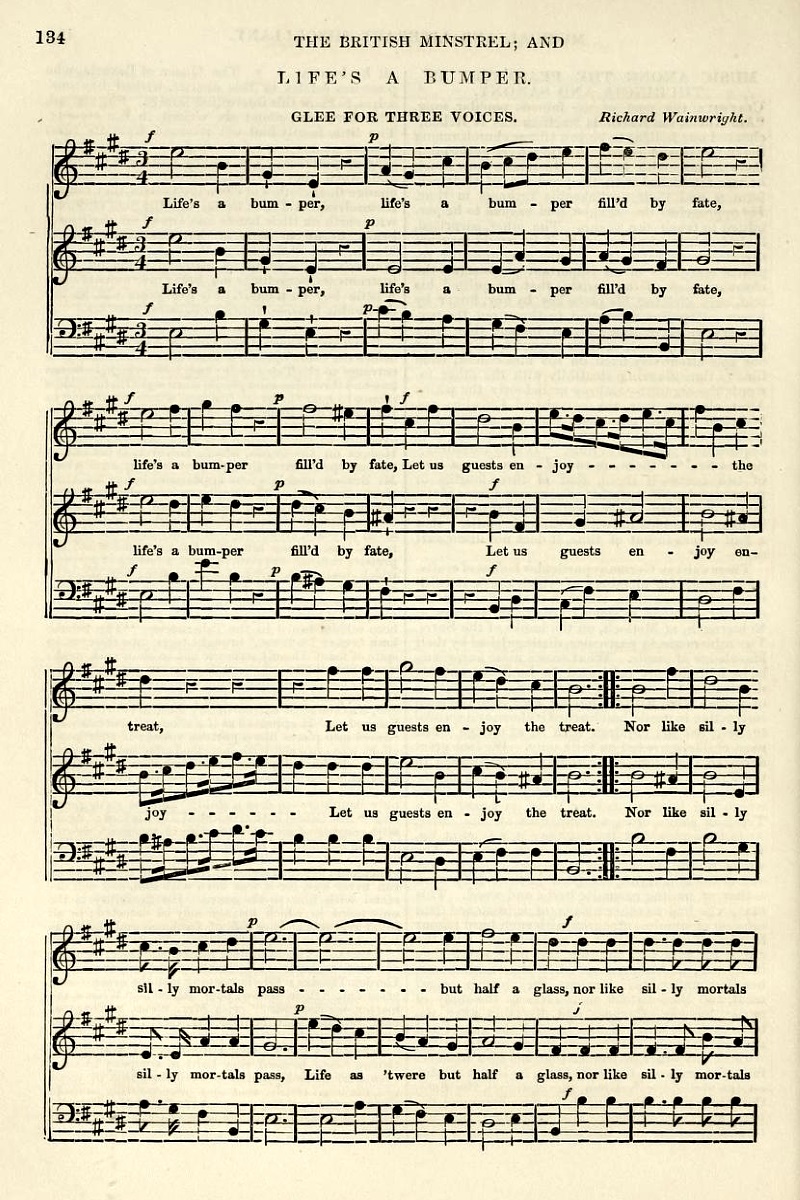
The British minstrel, and musical and literary miscellany . . . vol. 1 (Glasgow: William Hamilton, [1843]), 134-36 (image National Library of Scotland)
https://archive.org/stream/britishminstrelm00glas#page/n141/mode/2up (DIGITISED)
4 SONG The death of Abercrombie . . . John BRAHAM
[Words only], William Oxberry (ed.), The actor's budget, consisting of monologues, prologues, epilogues . . . (Calcutta: Colombian Press, 1824), 358-59
https://books.google.com.au/books?id=-MokAAAAMAAJ&pg=PA358 (DIGITISED)
5 SONG Let us haste to Kelvin Grove . . . John BRAHAM
PERFORMERS: Mr. Clarke (tenor vocalist); George Sippe (pianoforte)
ACT II
6 OVERTURE Adelaide de Guesclino . . . Simone MAYR
7 SONG Adieu, my native land, adieu . . . James HOOK
8 GLEE How sleep the brave? . . . "Francis IRELAND"
Glee for three voices by "Francis Ireland", pseudonym of Francis HUTCHESON (1721-1780), see:
https://en.wikisource.org/wiki/Hutcheson,_Francis_(fl.1745-1773)_(DNB00)
[words only], Richard Clark (comp.), The words of the most favourite pieces, performed at the Glee Club, the Catch Club, and other public societies (London: Printed by the Philanthropic Society for the editor, 1814), 110
https://books.google.com.au/books?id=Z_teAAAAcAAJ&pg=PA110
9 BALLAD O share my cottage, dearest maid . . . Thomas COSTELLOW (1775-c.1815)
PERFORMERS: Mr. Clarke (tenor vocalist); George Sippe (pianoforte)
10 FINALE Grand overture
Performers
An AMATEUR, vocalist
Mr. Clarke, tenor vocalist
John Edwards, violin, leader, bass vocalist
Thomas Kavanagh, principal second violin
George Sippe, pianoforte, violoncello
"To the Editor of . . .", The Australian (10 January 1827), 2
http://nla.gov.au/nla.news-article37073939
SIR, Among many follies committed by young men of respectability in Sydney, the folly of keeping house appears to me the greatest.
How is it that we have not got a respectable boarding-house after the manner of the Cape, New, York, and the various cities of Germany and France,
to say nothing of our own English boarding-houses in London and the watering places of Harrowgate, Brighton, and Cheltenham.
I dined with a friend of mine, a batcbelor, the other day, who reckons his income, one thing with another, at £1000 a year.
And a very snug income it is; and if my friend were inclined that way, a good deal of dash, and all that sort of thing, might be indulged in without blame.
But as there is no boarding-house in Sydney for gentlemen, and good incomes he is obliged to hugger snugger in a small innimical house,
with two or three convict servants to cook, groom, and wait at table, and what with the pilfering habits of these gentry,
and the practice they indulge in of getting drunk whenever their master leaves the key in the sideboard,
my friend's £1000 a year is no better than other people's £300 where there is a good boarding-house.
I could hardly have believed this possible, if my friend who is a remarkably quiet, methodical and exact man, had not,
when I was expressing my surprise, taken from his portable desk a little book, containing a regular account of his expenses, from which I copied the following items: --
Rent and repairs - £100 . . .
Pocket expanses, including Concerts, Benevolent Society, Church, Agricultural Society, and all other Societies -
expenses at Parramatta, boat-hire, Turf Club, public dinners, newspapers, &c. &c. &c. - [£]100
. . . [all totalling] £1000 . . .
No doubt there have been hitherto peculiar reasons why such an establishment as I have mentioned could not possibly answer here, but that day has gone by.
The swarms of respectable well educated English gentlemen at present in Sydney fully warrant me in promising the best success to a speculation of this nature.
Yours, A BATCHELOR.
"Subscription Concert", The Sydney Gazette and New South Wales Advertiser (11 January 1827), 2
http://nla.gov.au/nla.news-article2187362
Mr. CLARKE'S Benefit Concert took place on Tuesday evening, and, we regret to say, was but thinly attended. How such happened to be the case we can hardly account for, particularly when we remember, that during the season of the Amateur Concerts, Mr. CLARKE contributed in no trifling degree to their success, and, as we are given to understand, not only afforded the aid of his talents, which are far from inconsiderable, but devoted a very large portion of his time towards furthering the views of the Amateur Society, without receiving the slightest remuneration. Under such circumstances, it was but reasonable that he should look forward towards efficient support on this occasion, and none who have experienced pleasure from his successful exertions to add to the attractions of the Sydney Amateur Concert, can help regretting that he failed in reaping that reward to which he was most unquestionably entitled. An unaccountable apathy seemed to have prevailed; where the blame lay we cannot, nor do we pretend to say, but blame certainly is attachable somewhere.
The Concert took place at Mr. LORD'S rooms, in Macquarie-place, and the company, though, as we have, already stated, limited, was respectable. The room was neatly and commodiously fitted up, and well lighted. Mr. EDWARDS, who is always ready to oblige wherever occasion offers, led the band; Mr. SIPPE performed on the violoncello, and accompanied the vocal music on the piano-forte; and Mr. CAVANAGH was principal second violin. The most successful efforts of the evening were "Friend of the Brave," a song by Mr. EDWARDS; Braham's beautiful ballad, "Let us haste to Kelvin grove," and the song "O share my Cottage," by Mr. CLARKE, all of which were received with the most rapturous applause, and honoured with an unanimous encore. "Kelvin Grove" is particularly adapted to Mr. CLARKE'S style of singing, and the beautiful pathos of the air and words, whereby "the sound is made an echo to the sense," was most effectively preserved in the delivery. In fact, we have scarcely heard any thing more pleasing, nor which appeared to impart more general satisfaction; and this is particularly worthy of remark, as a thin auditory is not in general the greatest stimulus to successful exertions, even in those who are the most disinterested. An Amateur, whose name we have not heard, nor whom we do not recollect in the orchestra on any former occasion, attempted "The Death of Abercrombie," and "Adieu my Native Land," but whether it was the fault of the gentleman's inexperience or timidity, or what the cause was we cannot say, but really we could not help at the moment quoting from Miss Biddy Fudge's letter,
"No never was known in this riotous sphere
Such a breach of the peace as his singing, my dear."
The singer was sometimes before the accompaniment, and sometimes the accompaniment was before the singer; but, notwithstanding, very considerable power of voice was apparent, which, we have no doubt, under judicious guidance, might be rendered capable of better things, always providing that its owner essays to divest himself of a portion of that mannerism which would counteract the best efforts of the most distinguished vocal powers. Several glees were sung by the vocalists, and some scientific overtures, particularly "Adelaide," performed by the band, and exactly at ten o'clock the evening's amusements terminated.
Of the company present, we have not much to observe, further than that confined as we regret to say it was, the room still presented some, whose
"Beauty hung upon the cheek of eve,
Like a rich jewel in au Ethiop's ear;"
but, really whether the lady in the pink body, or the charming lassie in the blue robe, drew the most attention from the music, we will not now undertake to decide. The latter, we think - but, no; we will not offer our opinion, but leave the ladies to guess. As to the gentlemen who strutted about in jackets, we have only one remark to make, "they order these things better in France;" and, with this quotation from STERNE, we will take our leave of the subject, at we should get stern too (we do not mean to pun), by reflecting on so flagrant an inroad on the usages of good society, and so direct a breach of decorum.
We regret that Mr. Clarke's claims, in fact, have not been duly appreciated, and we hope we are correctly informed, that his friends are determined to evince their sense of his deserts, by simultaneously coming forward to repair the losses he must have sustained on this occasion on another night, which, we understand, will shortly be announced for the purpose.
ASSOCIATIONS: Simeon Lord (merchant); Laurence Sterne (author), from the opening of his novel A sentimental journey through France and Italy by Mr. Yorrick (1786): "THEY order, said I, this matter better in France . . ."
[News], The Australian (13 January 1827), 3
http://nla.gov.au/nla.news-article37073577
Concert-going was fashionable six months ago - Every body had an ear for music, and was delighted with the charming playing and the charming singing;
and the great room here and the greater room there, were all too small.
We must have a concert-room built, and public amusements set a going.
How mutable are minds-concerts are no longer "the rage" - and any room almost will suffice for "the company."
The taedium vitae is no longer to be destroyed by tea and concert;
and the musical and the unmusical are waiting till the welkin rings again with the fervent clamour of the pursuers of some other novelty.
Benefit nights and no-benefit nights make little difference in the taste of the amateurs - they are or would be equally ill attended.
The taste will revive in due season. - Mr. Clarke must have experienced some disappointment the other night at his benefit.
We can only say, that we hope better things in future, for those who exert themselves gratuitously for the amusement of the public.
Some more concerts, for the benefit of others of the performers, are about to take place;
and we shall be glad to see that degree of patronage extended towards them, which they deserve.
[News], The Sydney Gazette and New South Wales Advertiser (16 January 1827), 2
http://nla.gov.au/nla.news-article2187390
Mr. Cavenagh, we understand, is about to have a Benefit Concert, under very distinguished patronage. As a musician, Mr. C's talents rate high, and his exertions, on all occasions, to please, will, we have little doubt, procure him a liberal and substantial mark of public favour. A rich and varied musical treat, we are informed, is in preparation, and some new music, vocal and instrumental, composed by Mr. Cavenagh, will be produced on this occasion. Concert going, it has been said, is out of fashion; the people, it is asserted, are tired, or fickle, and what not, but this, we have little hesitation in saying, is not the fact, and some of the late failures may, without much difficulty, be attributed to a cause which would rather serve to mark the correctness of the public taste, and their desire to see those scenes of pleasing recreation enlivened and sustained by that aid, without which they will never be really attractive. The absence of a female vocalist is the true cause of the apathy; for, who that professes the least pretension to a soul attuned to harmony can endure the continued succession of gruff masculine voices in solos and glees, and glees and solos to the end of the chapter? "Who sings next? Mr. So-and-so? Who next? Mr. Thingumme! Who next? Mr. What-d'-ye-call-em ! !
"Soup for breakfast, soup for dinner, soup for supper, and soup for breakfast again!"
This is not endurable, particularly when it is known that a remedy can be applied. Mr. Cavenagh, therefore, it is to be hoped, will gratify his friends with tones that
"- - - mingle, in one sweet measure,
The past, the present, and future of pleasure,
As memory links the tone that is gone
With the blissful tone that's still on the ear,
And Hope from a heavenly note flies on
To a note more heavenly still that is near!"
NOTES: . . . mingle, in one sweet measure . . ., from Lallah Rookh (1817) by Thomas Moore
"DOMESTIC INTELLIGENCE", The Monitor (27 January 1827), 2
http://nla.gov.au/nla.news-article31758150
We cannot admire, by any means, the strictures the Gazette has deemed it necessary to make upon that very respectable body of men, the Committee of the Amateur Concert. We say, strictures upon the committee, because the Gazette influentially finds fault with their conduct, when he hints that due exertion has not been made in gaining the acquisition of female vocalists. It ought ever to be remembered, (before public censure be indulged in, either openly or by inuendo) that the Committee of the Amateur Concert were not like the paid managers of a public theatre; but that they were the public-spirited, we may almost say patriotic originators of a pastime, which, considering the difficulties to be encountered, has, we consider, been highly creditable to them. It also ought to be remembered, that the same public spirit which originated, carried into effect the plan; and that every exertion was made by the committee to obtain female and other professional talent. When these latter circumstances especially, are considered, it certainly strikes us as a sorry way of remunerating men for their gratuitous and indefatigable exertions for public enjoyment, publicly to censure them on the ipsa dixit of - - (but we have a regard for the sex.) We, as well as the Gazette, can admire female singers; but in the absence of them, are well contented to listen to the harmony of Edwards or of Clarke. On the practicability or not of obtaining respectable females, we shall not descant; we would desire to avoid painful personalities, and will therefore avoid the subject. The Gazette's facetiousness was neither in time nor place.
[Editorial], The Sydney Gazette and New South Wales Advertiser (30 January 1827), 3
http://nla.gov.au/nla.news-article2187533
After dozing for eleven days over some very innocent remarks of ours, on what we then believed, and do still believe, to be a cause, after the first excitement was over, of the decreasing interest of the Amateur Concerts, the Monitor comes forth, in his last number, with what he, doubtless, believes to be a mighty fine thing, and quite a triumphant reply to what we advanced. Poor fellow! what a misfortune it is, that he could not disentangle the "thick (i. e. muddy) coming fancies," which brooded so long over what he terms the "strictures" of the Gazette, and have enlightened the world with his paragraph of thirty lines, after somewhat less time taken in the composition, than eleven days! But, in sober sadness, we would ask, wherein the "strictures" of the Gazette upon the Committee of the Amateur Concert, a body of gentlemen for whom, individually and collectively, we entertain respect, equal to any which the Monitor can vaunt, consisted? We deny, in toto, that we censured the Committee of the Amateur Concert; for, in fact, at the time we penned our "strictures" (strictures!) such a body was, not in existence; the "Sydney Amateur Concerts," properly so called, had been discontinued, nor would the gentlemen who conducted them with so much credit to themselves, and satisfaction to all who partook of the enjoyments which their exertions afforded, ever have taken our remarks to apply particularly to them, had not the Monitor taken the fool's cap, which was thrown amongst the crowd, and at once placed it on the head of his friend. Besides the Committee, at their concerts, did mark their own taste by availing themselves of that aid, the want of which, on other occasions, all who attended concerts, did complain of. Mr. Cavanagh, we understood, was about to have a Benefit Concert; we were of opinion that he was entitled, on more than one ground, to public support, and, with the most friendly intentions, we pointed out to him what we conceived to be the cause of the failures on the part of other benefit takers, and recommended him to avoid falling into the same error. Such was the whole amount of our "strictures;" and for the Monitor with his face of wisdom to apply this to the Committee of the "Amateur Concerts!" Really we shall begin to believe that the Monitor's wisdom, like the owl's (by the way, the Monitor also now makes his appearance at night), consists mainly in the look, for this is not the first practical blunder he has made. We, as well as the Monitor, are aware that the Committee are not like the paid managers of a public theatre, but we are also aware that should the Monitor himself take a Benefit Concert, the public to whom he would naturally look for support, have a right to point out to him the kind of entertainment with which they would be best pleased, and this was all the "strictures" of the Gazette amounted to, in the case of Mr. Cavanagh. As to the observation that our remarks were made on the ipsa dixit or ipse dixit either of any one, it is apiece of impertinence so perfectly in keeping with the stupidity that pervades the whole production, that we deem it unworthy of a reply, and, shall conclude our present "strictures," not on the Committee, but on the Monitor, by observing that his silly stuff about the practicability of obtaining respectable females, only more clearly demonstrates his ignorance of the subject, on which he presumes to write. No man of feeling will suffer his wife, sister, or daughter, to become a public singer, or performer of any description, who has any other means of providing for her. It is the hard weapon of necessity alone, that will induce a woman of delicacy to appear before the public for hire; and therefore, we do say, that, notwithstanding the Monitor's "regard for the sex," his observations were both illiberal and unfeeling. We have heard of an application to the Committee, for an engagement, being refused, whether properly or not, we are far from offering an opinion, but we will, at the same time, say that Sydney can produce some females who might be induced to gratify the public by the exertion of their talents, fully as respectable, in every point of view, as any London can present. So much for the Monitor, and his " facetiousness."
Later documentation
"DOMESTIC INTELLIGENCE", The Monitor (9 March 1827), 2
http://nla.gov.au/nla.news-article31758262
The Organ for St. James's Church may be hourly expected, and that for the new Church, Launceston, ordered a few weeks before, is now on board the Midas in Sydney Cove. It is remarkable that the Hobartonians seem quite to excel in exertions where taste and wealth are concerned. There is much more unanimity among the intelligent and wealthy classes of V. D. Land than there is here. Hence the Concerts, Grammar Schools, Post Offices, public Markets, &c. are no sooner proposed and adopted than they permanently succeed. Ours eventually fail, "Every man to his Tent O Israel!" is the feeling of our higher classes in New South Wales.
[Editorial], The Monitor (8 June 1827), 4
http://nla.gov.au/nla.news-article31758445
COLONEL DUMARESQ has proved to be the unknown Passenger per the Australia, and is really gone home at last. Although the Colonel was allied closely to, the Government by the ties of kindred and officiality, still, the unhappy measures which it has been the misfortune of Governor Darling to have had passed during his short reign, have not affected the Colonel in the public estimation - at least as far as our knowledge extends. When we consider the extreme difficulty of a person who is obliged to appear a busy actor in unpopular measures, so conducting himself as to save his own personal popularity with the people, which Colonel Dumaresq did in so great a measure, we feel strongly disposed to feel most kindly towards that individual. The fact is, that how ever much we may have to deplore the paucity in this Colony of such characters in New South Wales, Colonel Dumaresq was really a Gentleman - a word, in the English language full of meaning. A character which neither birth, education, nor high official rank, not even ecclesiastical rank, can confer upon some men. Indeed rank, with men naturally base, only serves to exhibit their infirmities with the force of contrast. To all classes the Colonel was complaisant. To the lower he lent a willing ear - his manner was gracious - such as we always see in the English Nobleman or man of family, who, conscious of his real rank, never suspects he can sully it by treating his fellow men as if they were men. He was a promoter of those public recreations, which, however we, as rigid moralists, may look at with a forbidding aspect, are at all events a substitute for baser vices, while there is great authority among political writers to justify their practice. Now, one of the few advantages of races, balls, theatres, concerts, &c. is, they bring the aristocracy and the common people together - they tend to abate the haughtiness of rank, while the poor are made to feel themselves to be somebody in the State; and that feeling generates in them a veneration for their superiors, while they see them once a year condescend as it were to a species of equality. This generous feeling we are persuaded is the chief gratification which such spirits as Colonel Dumaresq receive at public sports, and at the game time forms the chief temptation to induce their attendance. At the late races, a publican, an emancipist, went further than this class of Colonists usually do, (for we will say the Emancipists are by no means forward in their manners) and rather [???] the Colonel to take a wager against his own horse (which was about to run) in favour of Junius. The Colonel said he was not disposed to bet at that time, but rather than not promote hilarity and diversion, he would accept the wager, though he fully expected to lose. And he did lose. This was the Colonel's character. He was condescending to the common people, while a steady consistent urbanity governed his manners to all. Therefore it is that Colonel Dumaresq was generally liked, and that his absence is generally regretted.
ASSOCIATIONS: Henry Dumaresq (brother-in-law of, and former military secretary to Ralph Darling (governor of NSW)
"AUSTRALIAN EXTRACTS", Colonial Advocate, and Tasmanian Monthly Review and Register (1 March 1828), 32
http://nla.gov.au/nla.news-article232997865
A valuable, new, and complete set of musical instruments, fit for a full orchestra, has reached Sydney by one of the vessels lately arrived from England. The instruments had been purchased, and sent out by Mr. Solomon Levey, for the use of the Amateur Concert, in conformity to a promise which he made to the conductors of it, on leaving this country for England. So desirable an acquisition as those instruments, might well stimulate a revival of the rational amusement which concerts afforded to the people of Sydney some twelve months back. The instruments, however, we understand, have been disposed of.
ASSOCIATIONS: Solomon Levey (merchant, brother of Barnett Levey)
"(Domestic Intelligence continued)", The Sydney Monitor (3 January 1829), 5
http://nla.gov.au/nla.news-article31761242
. . . There is some talk of the Sydney Amateur Concert being renewed . . .
ASSOCIATIONS: This was probably an early report on Barnett Levey's successful plans to present a series of concerts in the second half of the year
[News], The Sydney Gazette and New South Wales Advertiser (5 January 1830), 2
http://nla.gov.au/nla.news-article2194227
Mr. Bodenham's commission sale room, in George-street, presents the appearance of a first rate musical instrument warehouse. A very valuable collection is offered for sale amongst which is a bass viol, price 48 guineas. The instruments, we understand, were sent out from England for the use of the members of the Sydney Amateur Concerts.
"Concert - Theatre - Music", The south-Asian register (April 1828), 280-81
https://nla.gov.au/nla.obj-608525434/view?partId=nla.obj-608559576#page/n85/mode/1up
Concert.
In January, a collection of musical instruments arrived for the Sydney Amateur Concert; but that pleasing break on the dulness of colonial times, for the want of spirit, of energy, of unanimity, of impulse, or of nobody knows what, had been long discontinued. Month after month, we waited to hear when the next Concert would be; when we might again hear Professor Edwards drawing out the soul of his violin, bidding it "discourse excellent music;" when we might see the beauty and fashion of Sydney met together, for no matter what, if we could but be refreshed with an hour's gaze: but hitherto we have waited in vain; and now, we shall not be disappointed any longer.
Theatre.
We have strong hopes that we shall see the players by and by. Mr. Barnett Levey, our little vivacious colonist, has erected a pile of buildings which will cost him about £15,000, and the front part he intends for a theatre, or theaitre, as he calls it. He has been indefatigable in promoting the interests of the drama, as he avers, not for himself, but, for the public; and we must say, we believe him, because we believe him to be a genuine amateur of histrionic lore. He has obtained £5 shareholders in the management of the exhibitions, to the number of two hundred and fifty or upwards, all good marks, and therefore there seems no likelihood of failure. Why should there be? Do any people of clear sense, love melancholy better than mirth - the bottle, scandal, sensuality, or moping? In America, every town which can muster a population of two thousand souls, has a theatre, and some even two. We do not say that a theatre should be erected before a Church in a new Colony, or that liberty is before religion; but we think they each claim serious and impartial consideration. When Mr. Barnett Levey's theatre is opened, he will deserve a vote of thanks from his fellow-townsmen. He is a man of singular enterprise. To build a theatre for the public benefit, like what he has built, and a warehouse behind it, four stories high, with a handsome lofty windmill, surmounting the roof, is not a common performance in England.
Music.
During the last three months, the triangular plot of ground adjoining the Cove, called Macquarie Place, has been thrown open to the public [281] and two evenings a week, the military band, have continued to perform therein, some choice pieces of music. This arose, it is said, at the suggestion of Mrs. Darling. The design is a credit, at all events; but we are doubly grateful to a lady, when she looks upon us with affability and endeavours to promote in all around, a participation of the same feeling - We are not gene by such kindness, there is no obligation implied in it, but we are left to smile in return, or be pleased in our own way.
It has often struck us, as being singular, why Mrs. Macquarie in forming this place and the walk round the domain, did not cause a number of rough seats to be fixed here and there, for the convenience of visitors.
[Edward Smith Hall] "Mr. Lewis's Concert", The Sydney Monitor (20 December 1834), 2
http://nla.gov.au/nla.news-article32147866
MR. LEWIS is an admirable military musician, and amid the disappointment we experienced at his Concert, we were amused to observe the cool precision with which he conducted the Band, and the efficient support he received from his coadjutors of the 17th in the overtures.
. . . the music of our old Concerts in Castlereagh-street, was more concert-like than what we heard on Tuesday night. The overtures and pieces selected by Mr. Edwards, the manager, were probably more appropriate to a concert-room. With respect to the singing, we heard nothing on Tuesday evening equal to Edwards's Tempest, or Mrs. Jones's simple unaffected but expressive Rosebud of Summer . . .
. . . Braham enunciates every word as distinctly as if he were speaking, by firmly pronouncing the consonant when it commences a word, and articulating each syllable by pronouncing the vowels distinctly. Mr. Edwards of this Colony, does the same, by which a deteriorated voice is ever interesting to listen to, on account of the expression he infuses into his songs . . .
ASSOCIATIONS: Thomas Lewis, master of the Band of the 17th Regiment (military band); John Braham (English tenor vocalist)
"News of the Day", The Sydney Monitor and Commercial Advertiser (13 January 1840), 2
http://nla.gov.au/nla.news-article32166874
The Cecilian Monthly concert was held on Wednesday eveneing in the Court-room, Castlereagh-street, and was well attended. Both the vocal and instrumental pieces and songs, as performed by amateurs, were well selected, and went off with eclat. The room was well lighted, and the arrangements judicious. This is a very sociable and pleasant concert, and reminds us of the first subscription concerts held some fifteen years ago in the room over head, when Mr. Edwards presided at the orchestra with so much credit to himself and satisfaction to his firiends, for we have never heard better instrumental music in this Colony than was there performed, nor have we ever heard a better song than Mr. Edwards's Tempest; and we should like to hear it again, either from him or some other scientific singer . . .
ASSOCIATIONS: A personal recollection of the paper's founder, Edward Smith Hall (1786-1860); though his son-in-law, Francis O'Brien (d. 1896; married Sophia Hall 23 October 1839), was by January 1840 officially editor and proprietor of the Monitor, this report, like that of 1834 immediately above it, was almost certainly written by Hall himself; the Cecilian Society (Sydney)
Bibliography and resources (selected)
Hall 1951
James Lincoln Hall, "A history of music in Australia - 4: Early period - New South Wales: The Sydney amateur concerts, 1826", The canon: Australian journal of music 4/9 (April 1951), 421-27
Republished as Hall 1989
James Lincoln Hall, "A history of music in Australia - Part 2: Early period New South Wales: 1818-1826", Australiana 11/2 (June 1989), 53-58
https://trove.nla.gov.au/version/51968578
Irvin 1966
Eric Irvin, "Australia's first concerts", Twentieth century: an Australian quarterly review 20 (Winter 1966), 314-18
https://trove.nla.gov.au/version/233452256
Irvin 1971
Eric Irvin, "Australia's first public concerts", Studies in music 5 (1971), 77-86
https://trove.nla.gov.au/work/11246614
Atkinson 1997
Alan Atkinson, The Europeans in Australia: a history, volume 2 - democracy (Melbourne: Oxford University Press, 1997), 53 (new edition 2016)
https://books.google.com.au/books?id=vVhEDQAAQBAJ&lpg=PP1&vq=concert&pg=PT77 (PREVIEW)
Callaway 2000
Anita Callaway, Visual ephemera: theatrical art in nineteenth-century Australia (Sydney: UNSW Press, 2000), 126-27
https://trove.nla.gov.au/version/45870932
https://books.google.com.au/books?id=kjidEHGfTCQC&pg=PA126 (PREVIEW)
Connor 2002
Michael Connor, The politics of grievance: society and political controversies in New South Wales, 1819-1827 (Ph.D thesis, University of Tasmania, 2002), 246-47
https://trove.nla.gov.au/work/34474403
https://eprints.utas.edu.au/19138 (DIGITISED)
[246] . . . Despite being a patron Darling was preparing despatches for the morning sailing of the Corsair and did not attend. The unexpected departure of the vessel had disrupted the Governor's plans, and he decided not to accompany his wife, despite Henry Dumaresq's entreaties. This small reference offers an indication of the working association between the Governor and his Private Secretary, and also Darling's strength in holding out against the persuasive Dumaresq. It suggests an ease of communication between the two men, and that in private there was little standing on ceremony or reserve in their relations:
It has happened inopportunely, and I have used a good Deal of persuasion, to no purpose, to endeavour to get the General to shew himself - and I regret that he has not done so - I would have had [247] him do this, if only for 5 minutes - and we have the night before us - but where is the use of saying anything about it?
(Henry Dumaresq to Ann Dumaresq, 4 December 1826, State Library of New South Wales, ML A2571)
Quills blackened the pages and the lights burned at Government House as the audience in the nearby Court House heard Weber's overture from Der Freischutz and songs including "Oh Rosa, when you quit the spot", "Flow thou regal purple stream", "Bid Me Discourse". Even without the Governor the Government House party was considerable - Mrs. Darling, Lieutenant de la Condamine, the Colonial Secretary his wife and daughters, Captain William Dumaresq (returned from Bathurst), and the Chief Justice. Henry Dumaresq may have made a brief appearance for he is listed in one of the reports although the reporter, intoxicated with uniforms and braid, may have mistaken the captain for his colonel brother. The audience applauded and then encored the new song "Cherry Ripe" which had been recently made popular in London by Madame Vestris.
(Australian, 6 December 1826; Sydney Gazette, 6 December 1826; Monitor, 8 December 1826)
Skinner 2011
Graeme Skinner, Toward a general history of Australian musical composition: first national music, 1788-c.1860 (Ph.D thesis, Sydney Conservatorium of Music, University of Sydney, 2011), 29, 42, 84-87, 94, 376
http://hdl.handle.net/2123/7264 (DIGITISED)
© Graeme Skinner 2016 - 2026